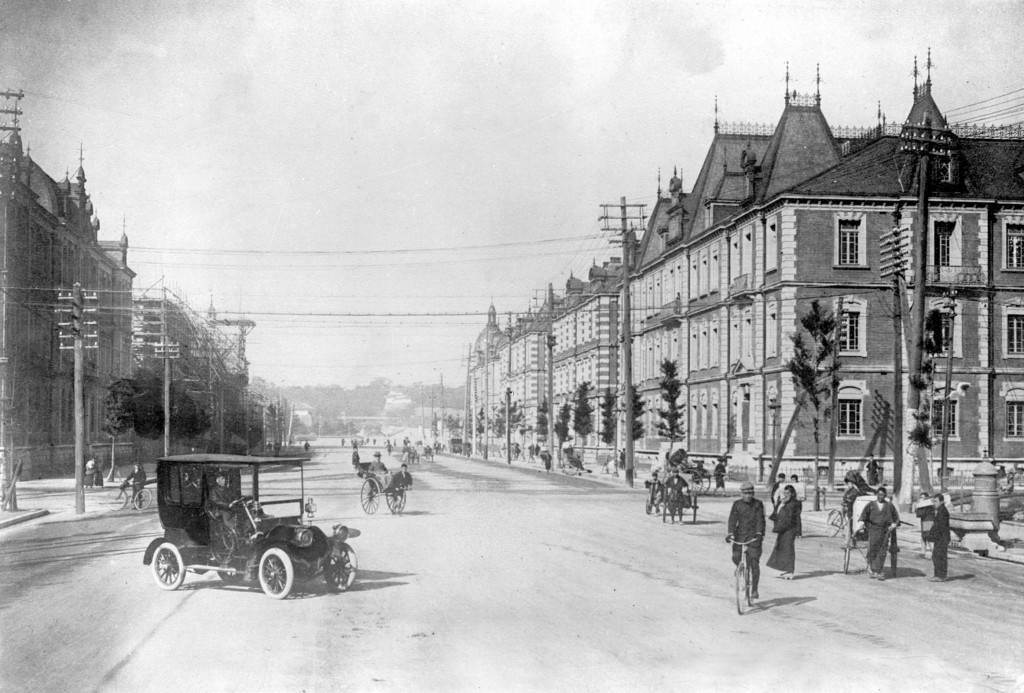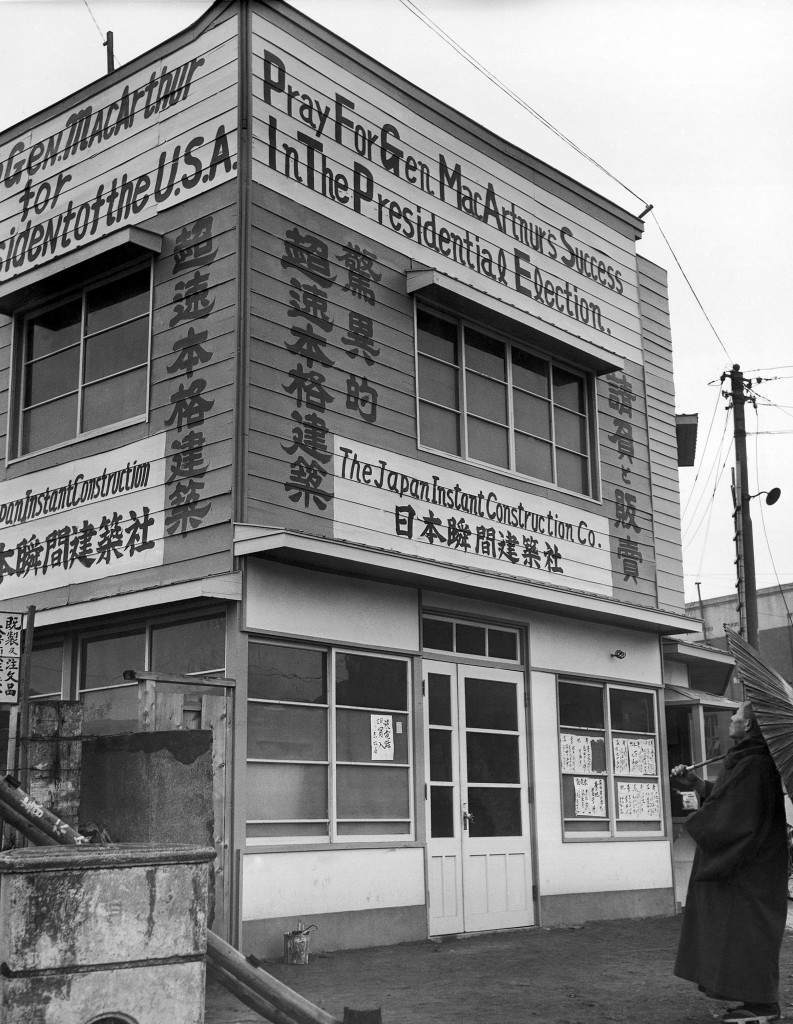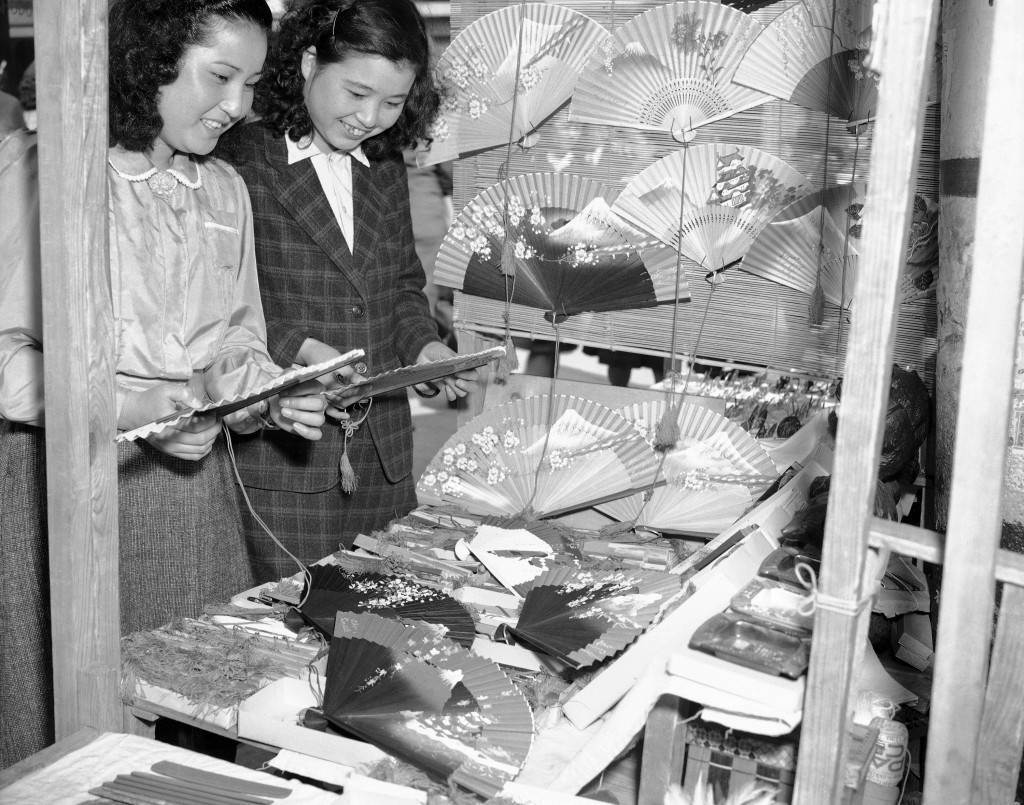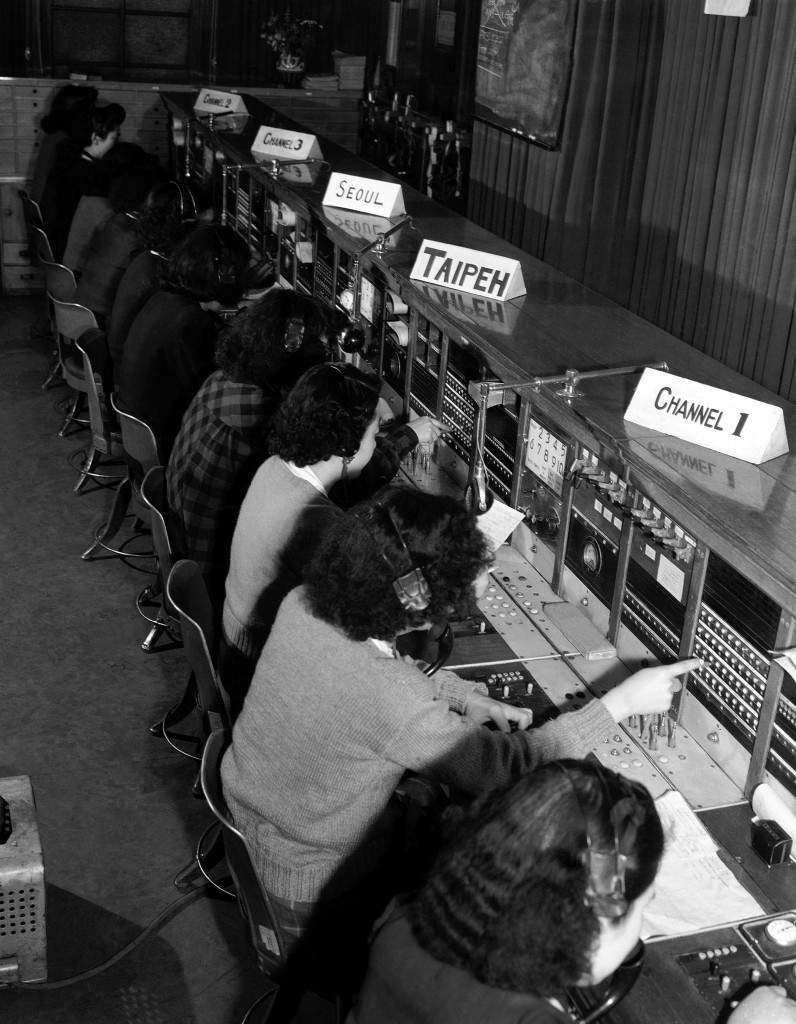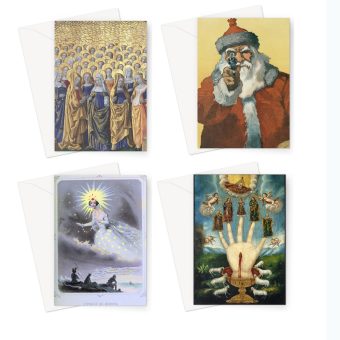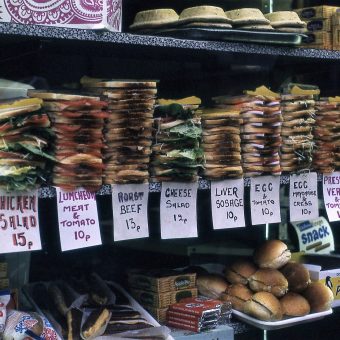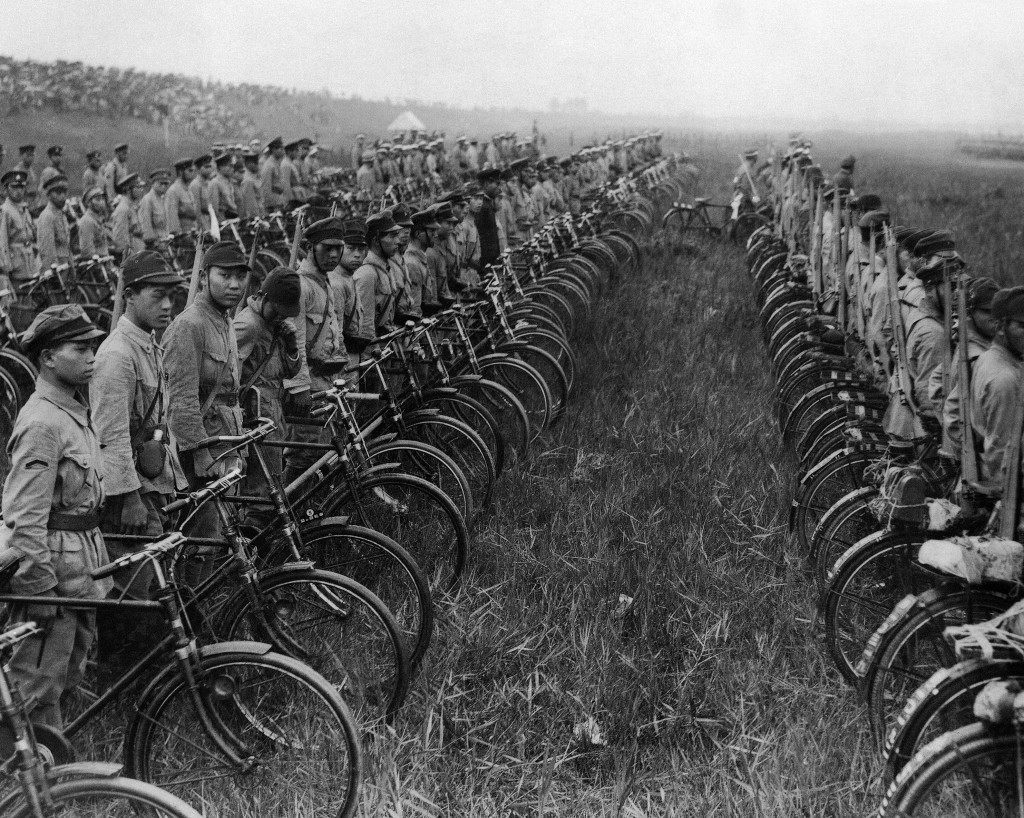
Fifty thousand students in and round Tokyo are undergoing rigorous training for war. Some of their numbers as they participate in maneuvers, equipped with bicycles to facilitate quick arrival at the front in Tokyo on Nov. 5, 1936. (AP Photo)
Ref #: PA.11624754
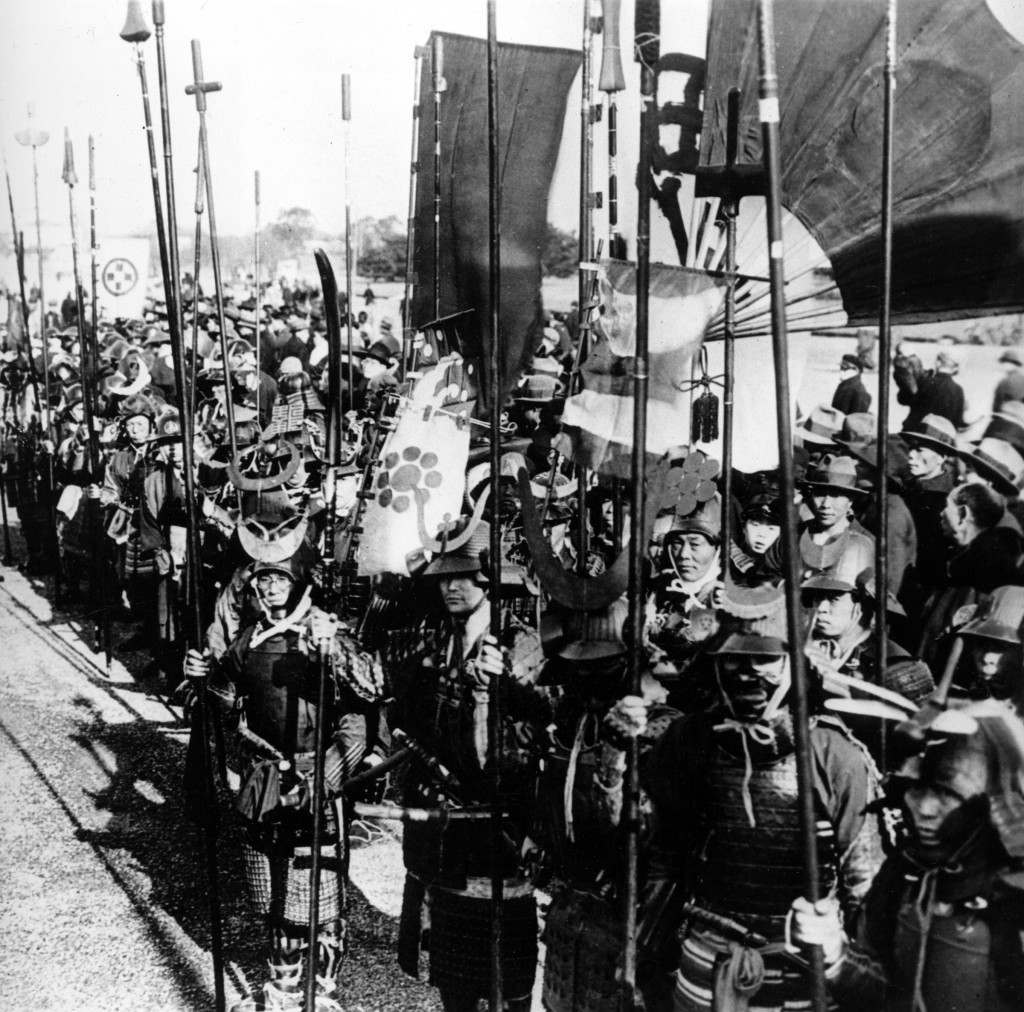
Hundred of Buddhists, clad in the armor of old time Japanese samurai, are forming a procession through Tokyo, carrying an image of Buddha from one temple to another, on January 28, 1933. (AP Photo)
Ref #: PA.8644286
Date: 28/01/1933
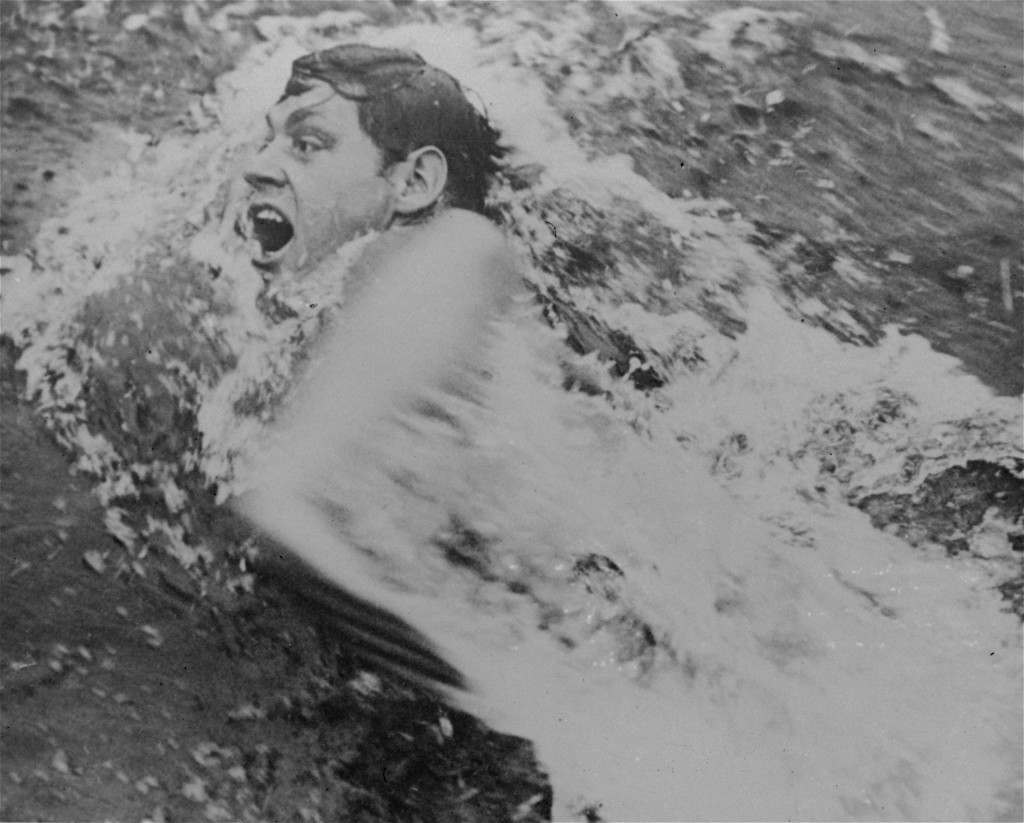
Johnny Weissmuller is shown competing in an international swimming tournament at the Tamagawa pool on the outskirts of Tokyo, Japan, in November 1928, shortly before he announced he would turn professional. (AP Photo)
Ref #: PA.8647552
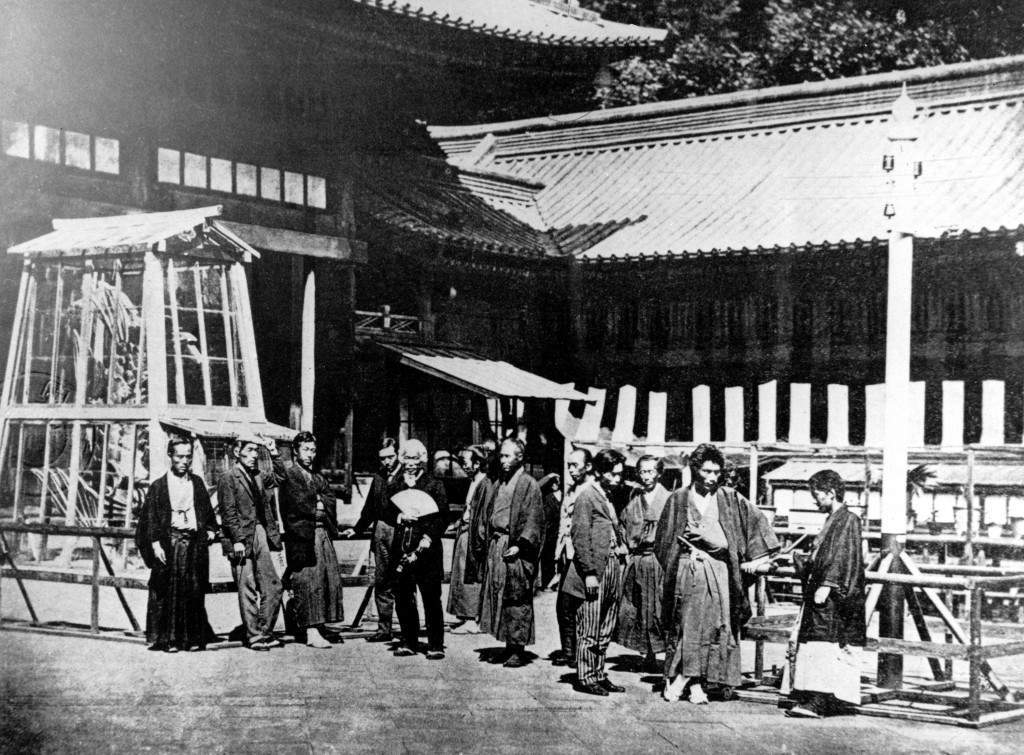
This photograph from 1877 shows visitors at the First Industrial Exhibition held in Tokyo, Japan. While some of the men are clad in traditional kimonos, others are wearing western jackets and trousers. (AP Photo)
Ref #: PA.8652642
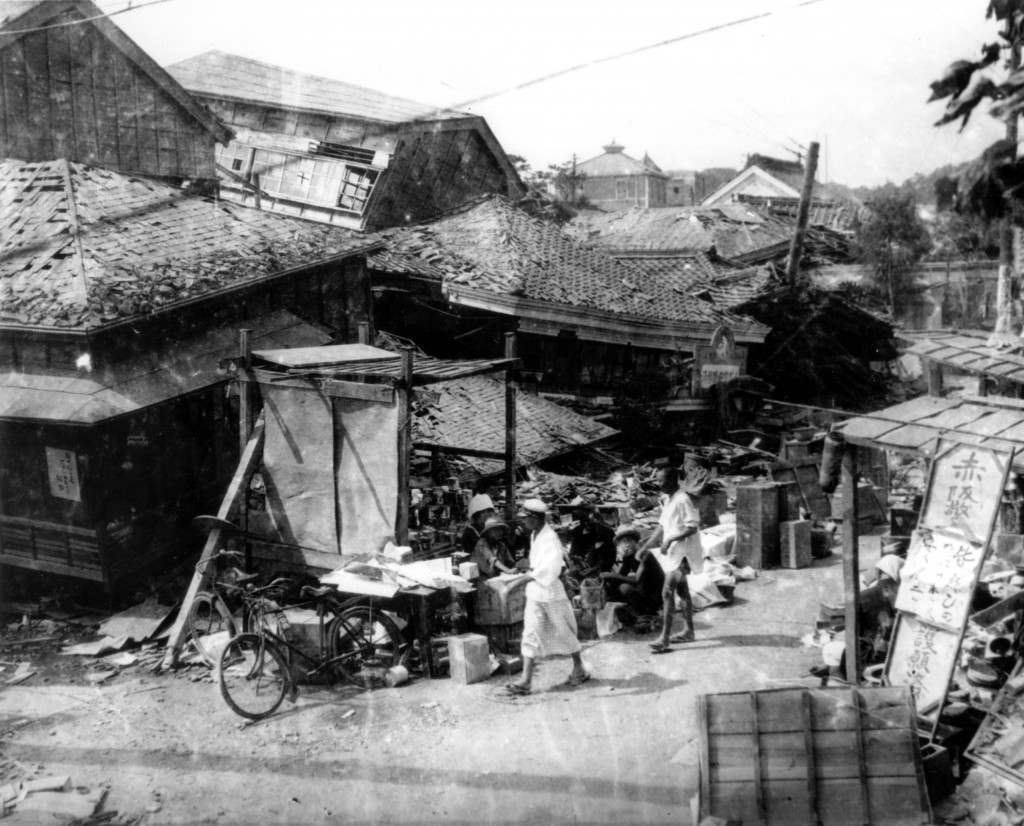
The Akasaka district, one of Tokyo’s residential areas, lies in ruins after the 8.3 magnitude earthquake on Sept. 1, 1923. (AP Photo)
Ref #: PA.8629729
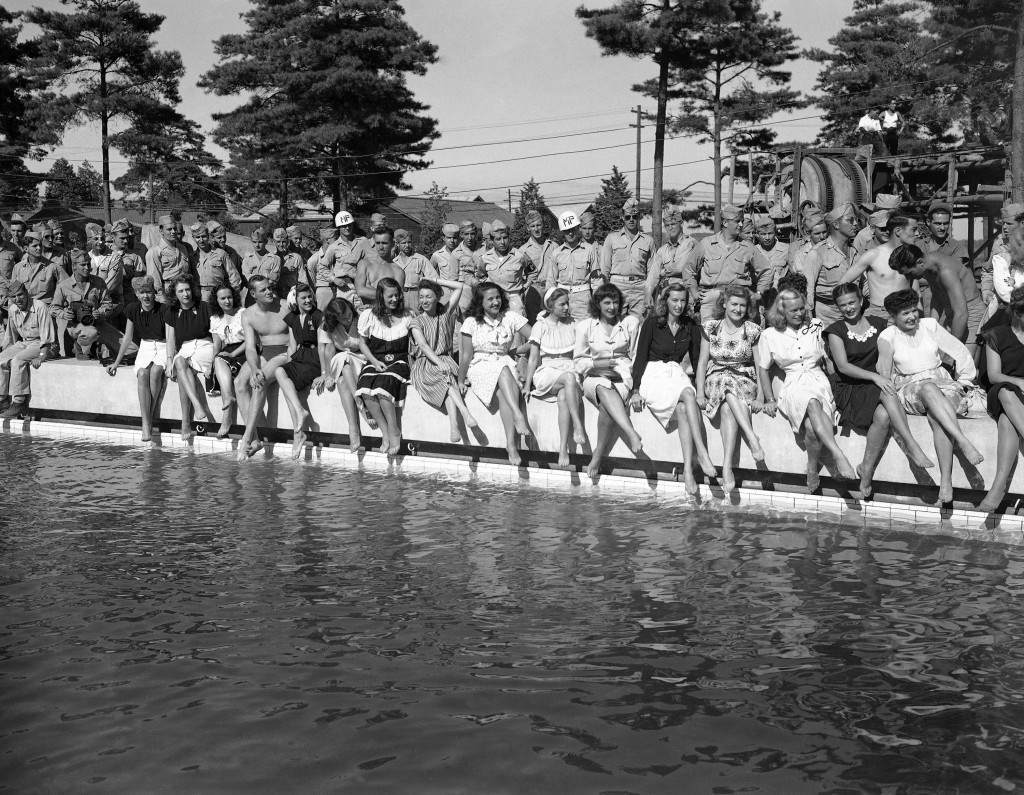
Show girls from the Mikado theater in Tokyo, their legs crossed and bare feet dangling near the water, pose on the side of a swimming pool at a new American air base at Yokota, Japan on August 17, 1946. How one male, presumably a soldier, got into the otherwise all-girl lineup at poolÂs edge was not explained. Uniformed soldiers stand behind the girls. (AP Photo/Charles Gorry)
Ref #: PA.11560047
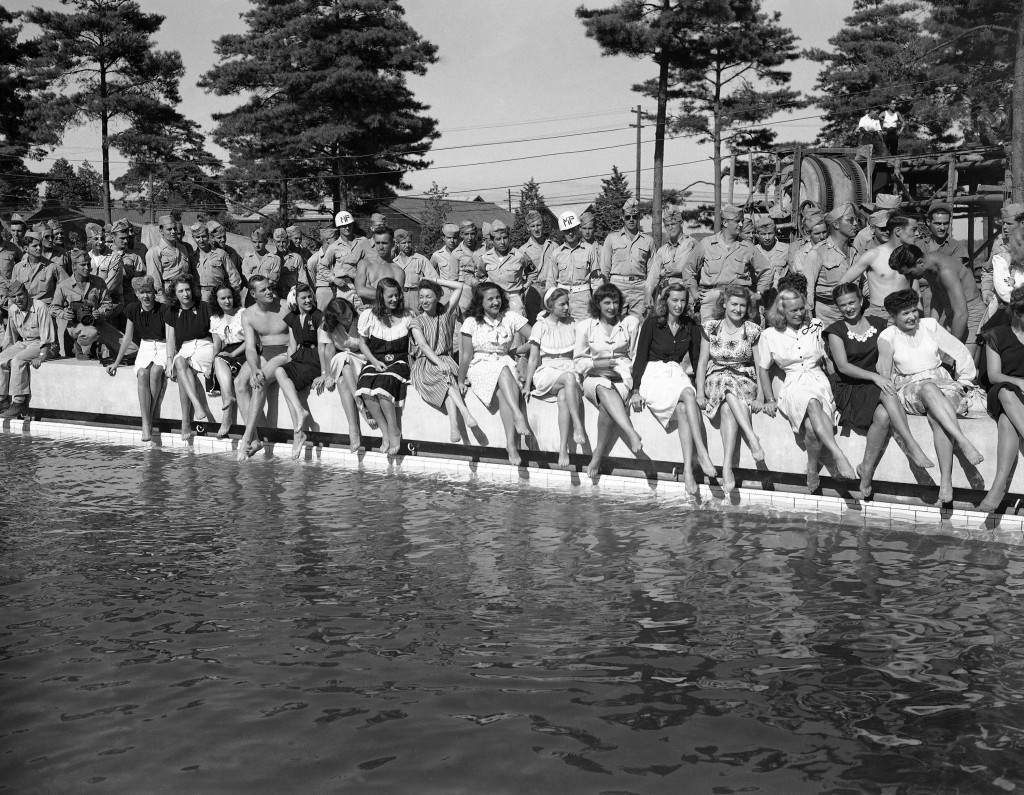
Show girls from the Mikado theater in Tokyo, their legs crossed and bare feet dangling near the water, pose on the side of a swimming pool at a new American air base at Yokota, Japan on August 17, 1946. How one male, presumably a soldier, got into the otherwise all-girl lineup at poolÂs edge was not explained. Uniformed soldiers stand behind the girls. (AP Photo/Charles Gorry)
Ref #: PA.11560047
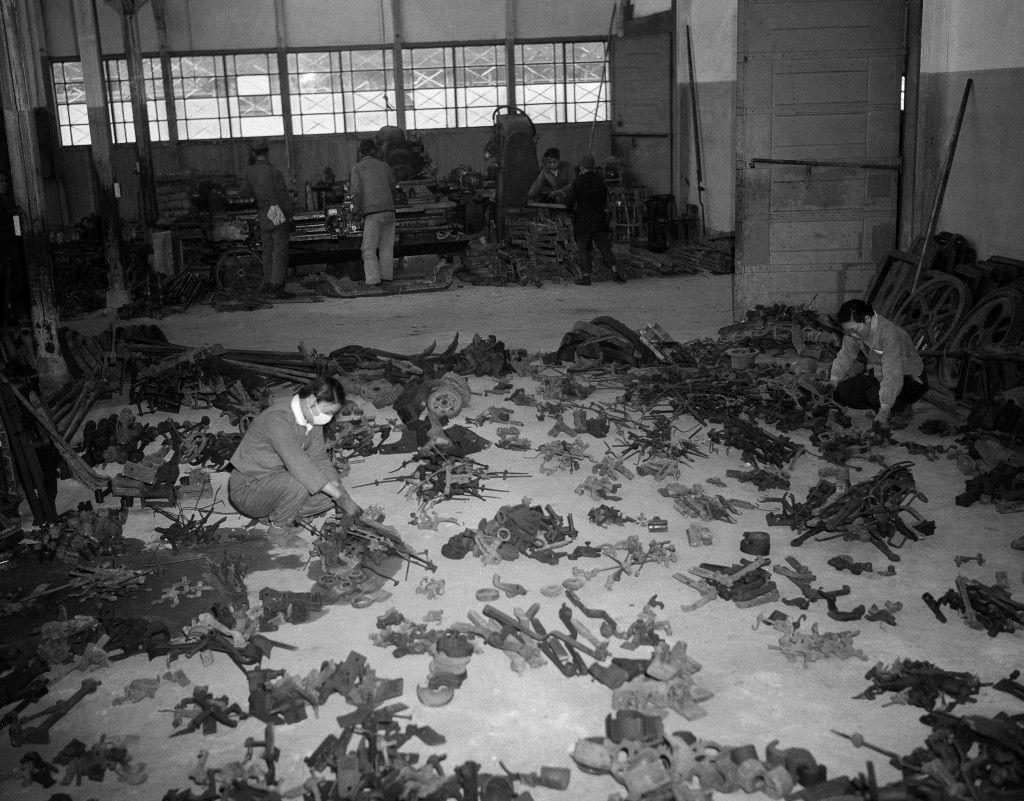
Machine tools and parts for machinery are being made with metal melted down from scrap salvaged from the wreckage of former war plants. Girl employees check salvaged material, set out on the floor of a warehouse in Tokyo on July 26, 1946, to determine what can be used and what must be melted down to make new parts. (AP Photo)
Ref #: PA.11669504
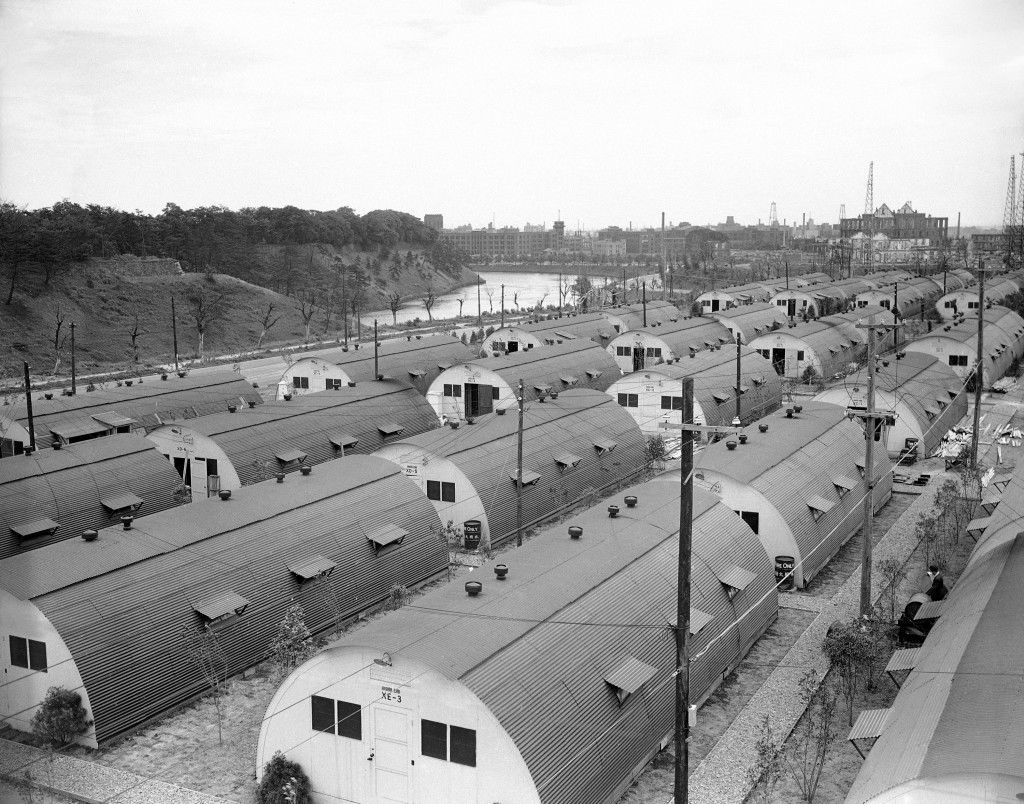
General view of Palace Heights looking towards downtown Tokyo on June 10, 1946. In background is the Imperial Palace and the moat surrounding the grounds of the emperor. The first families are expected to arrive next month at which time the project is expected to be finished. (AP Photo/Charles Gorry)
Ref #: PA.11607708
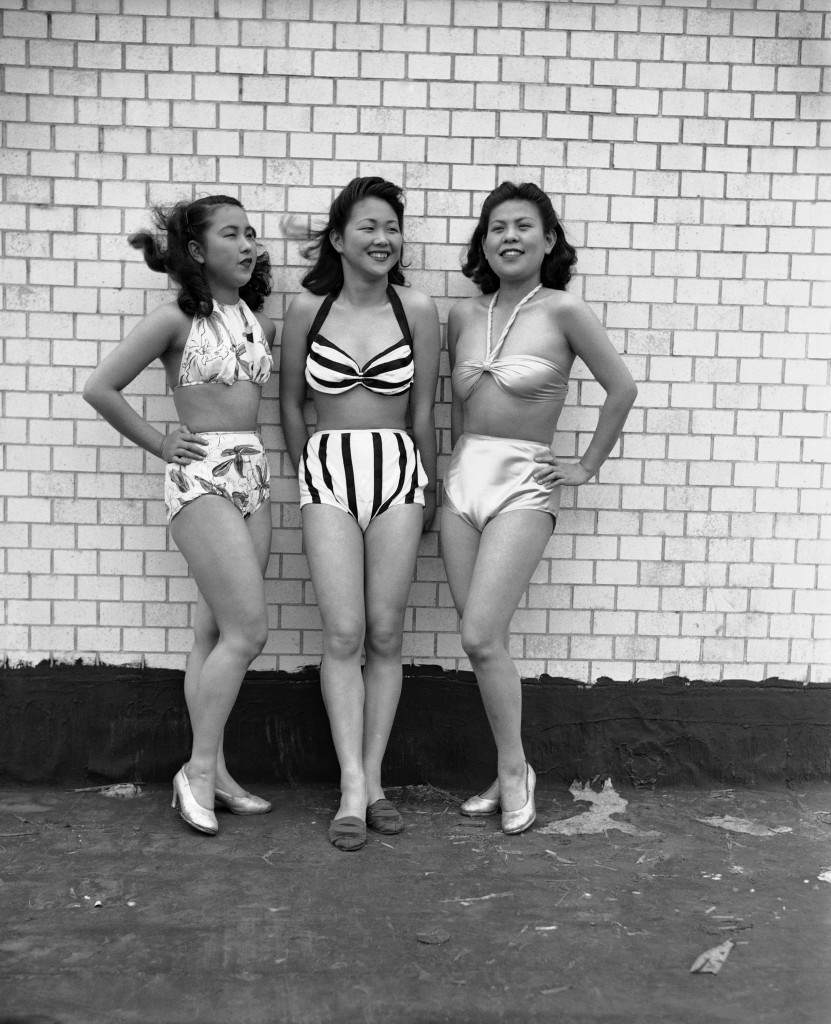
Three dancing girls at the Imperial Theater in Tokyo on May 29, 1946, model new 1946 style Japanese bathing suits, known as ÂDemocratic suits. From left To right: Mitsuso Kitajima, Akiko Yoyogi and Yoshiko Kubomura. (AP Photo/Charles Gorry)
Ref #: PA.11497412
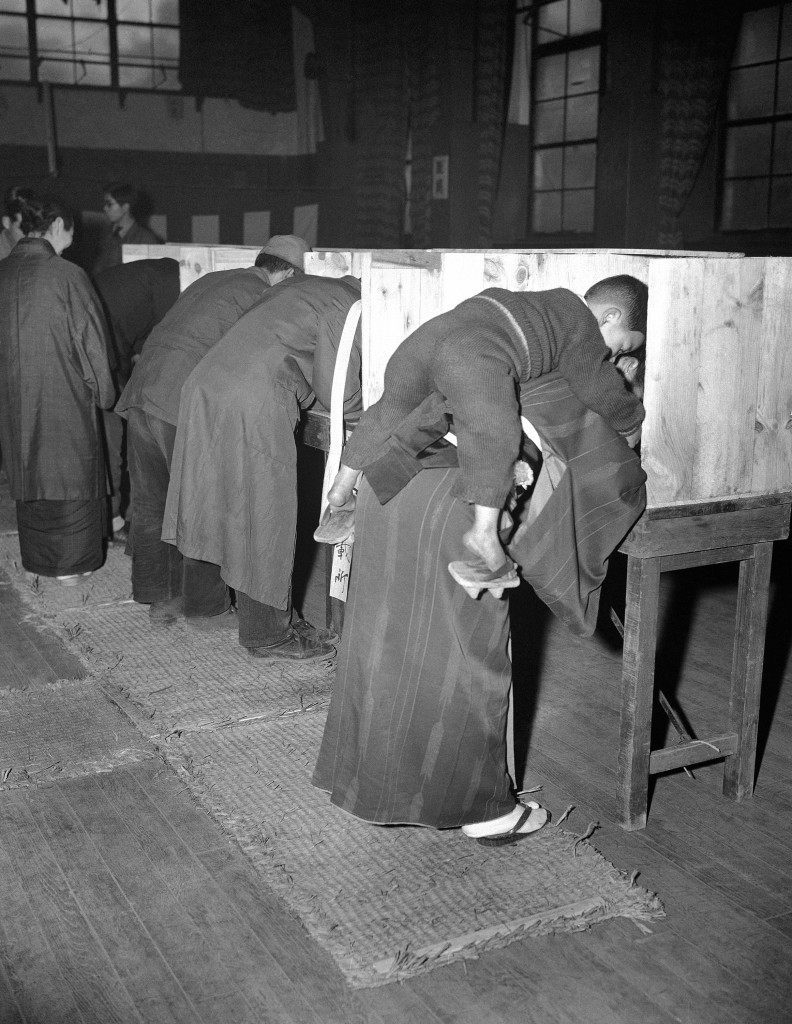
A Japanese woman carries her son on her back as she marks her ballot in Tokyo on April 10, 1946, in JapanÂs first free election in generations. Japanese women exercised the right to vote for the first time to help elect a new lower house in the diet. (AP Photo/CPG)
Ref #: PA.10974430
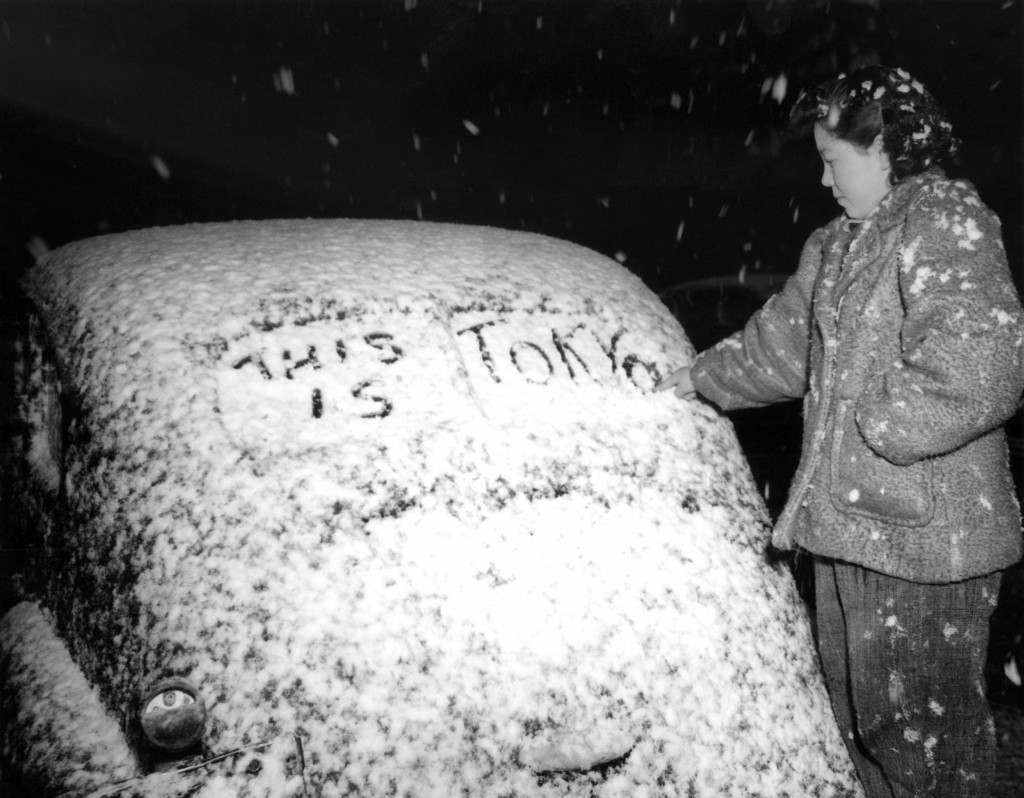
Usheeko Sato, a resident of Tokyo, Japan writes on the snow-covered rear window of an automobile in the Japanese capital on Feb. 12, 1946. (AP Photo/Charles Gorry)
Ref #: PA.11497408
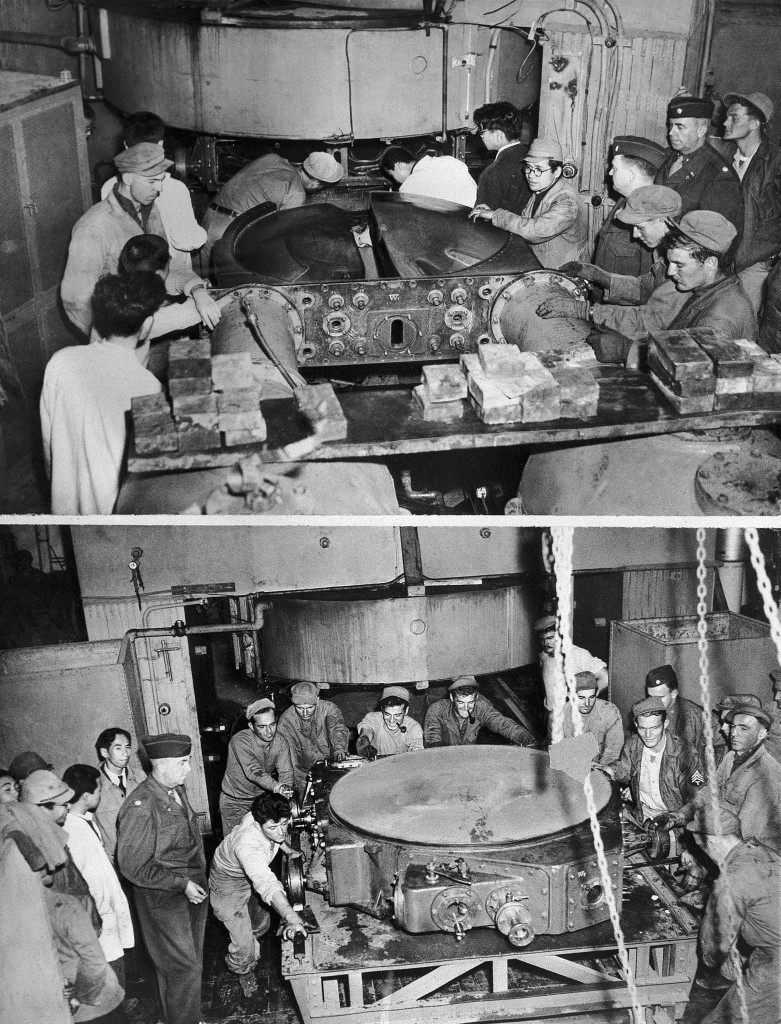
In this combo photo, members of an American Engineer Aviation Battalion remove parts from a Japanese cyclotron in the Nishina Laboratory at Tokyo on Dec. 4, 1945. Part of the ÂAtom Gun is removed. A vacuum chamber is extracted. The operation is part of the Allied program of destroying all Japanese atomic energy research equipment. (AP Photo/Julian C. Wilson)
Ref #: PA.10457171
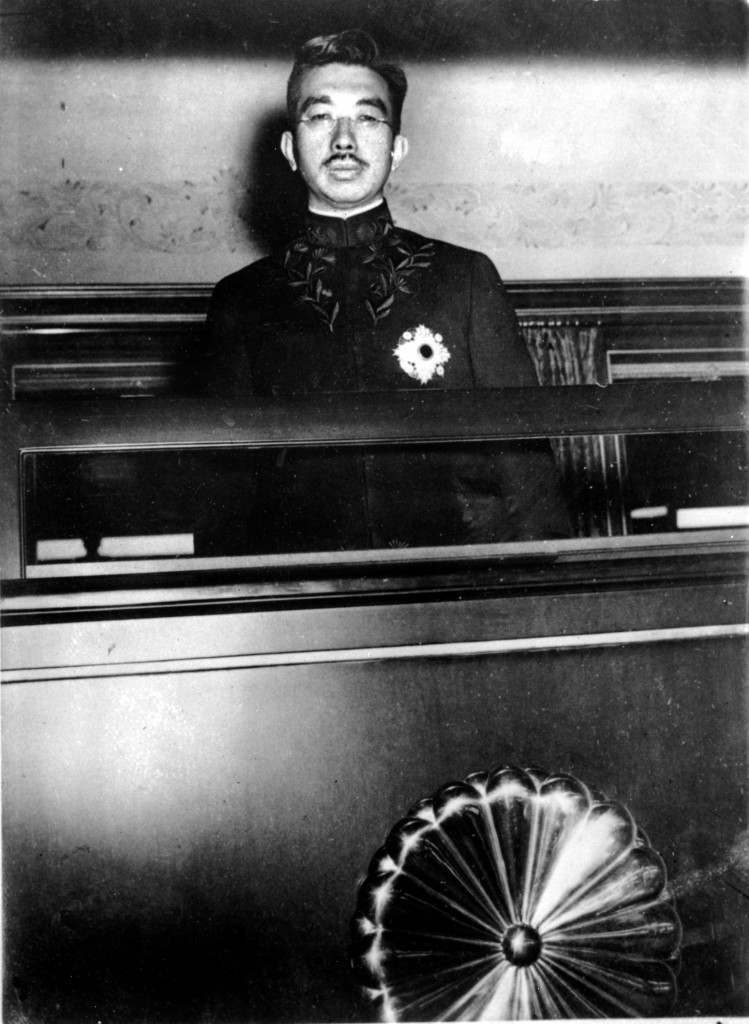
Japanese Emperor Hirohito peers from a window of his special railway car in Tokyo, Japan on Nov. 11, 1945. Hirohito is traveling to visit his family shrine. (AP Photo)
Ref #: PA.3329025
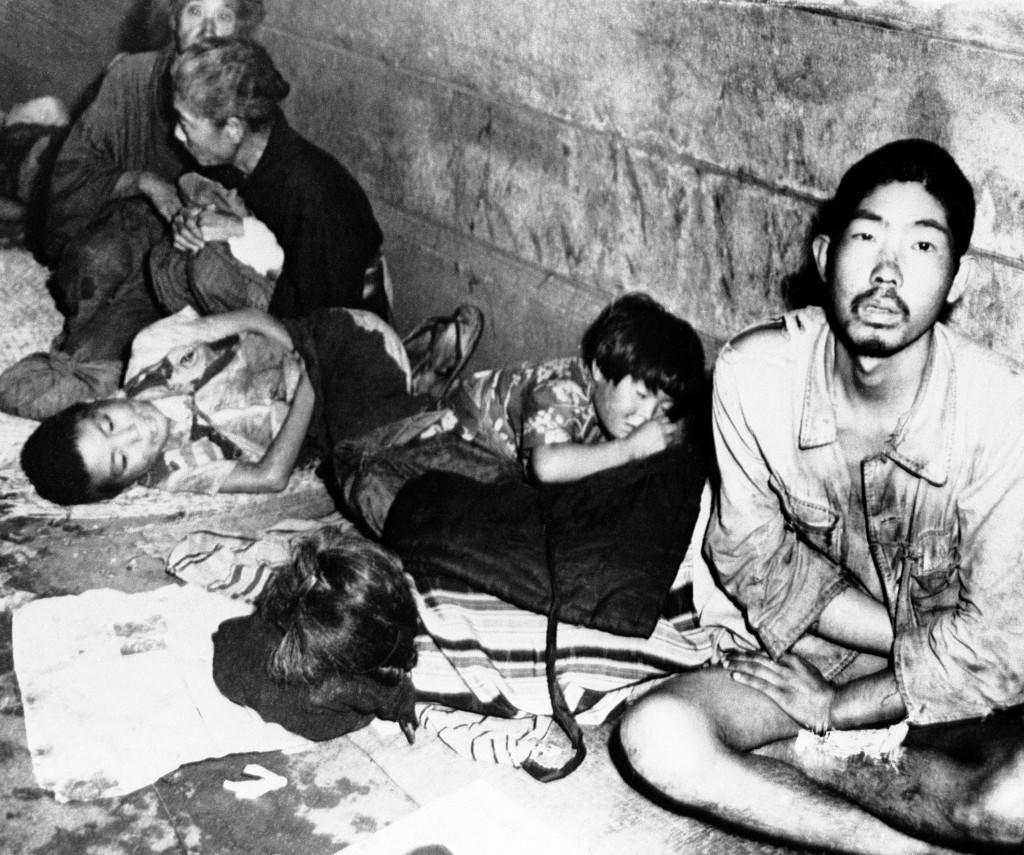
Hundreds of Japanese jam the Ueno railway station in Northeast Tokyo, on Oct. 26, 1945, these windy autumn nights seeking shelter. Homeless, the old and the young huddle together on thin matting and old newspapers, and try to sleep. Many are starving. Police estimate there are two of three deaths nightly from starvation. (AP Photo)
Ref #: PA.9955783
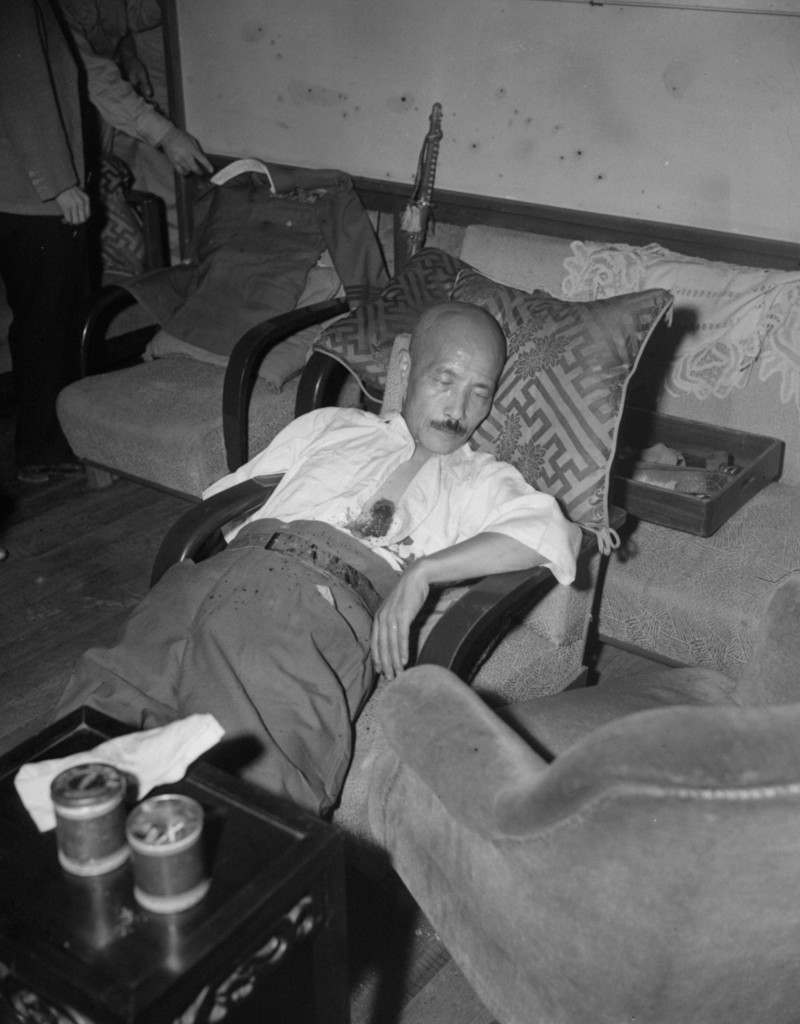
With a gaping bullet wound just below the heart, Gen. Hideki Tojo, former Japanese premier who failed to lead Japan to victory, lies semi-conscious in a chair after he shot himself, September 11, 1945 in Tokyo, Japan. (AP Photo/Charles Gorry)
Ref #: PA.8689560
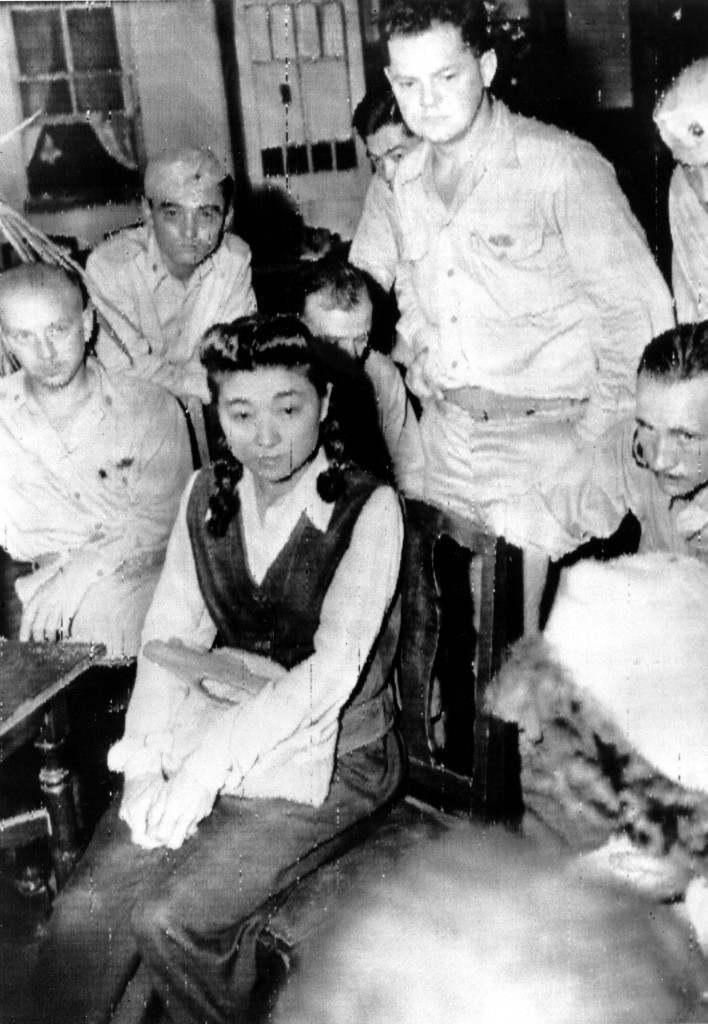
Iva Toguri D’Aquino is interviewed by American journalists in Yokohama, Japan on Sept. 10, 1945, shortly before she is held in detention. D’Aquino, identified by the U.S. 8th Army headquarters as Tokyo Rose, is a radio personality whose program “Zero Hour” broadcast Japanese propaganda to the Allied troops during World War II. (AP Photo)
Ref #: PA.3712715
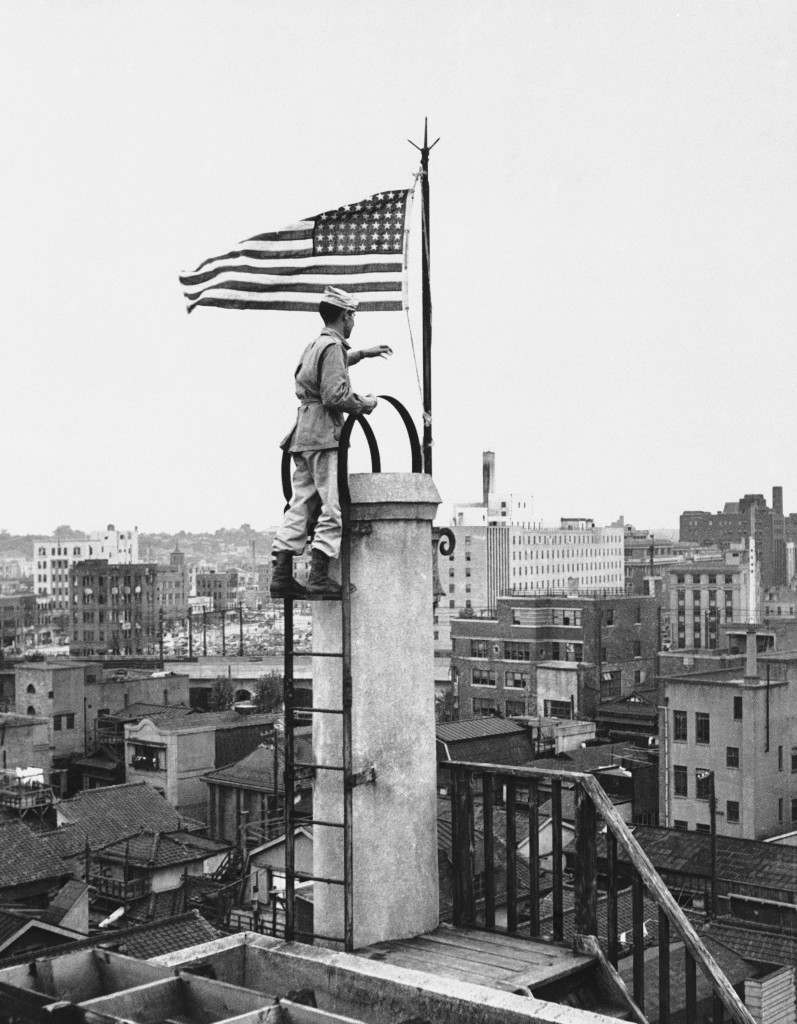
The American flag, first to fly over Tokyo since the Japanese surrender, is raised over the Nippon News building in downtown Tokyo on Sept. 5, 1945 by Lt. Bud Stapleton of Syracuse, N.Y. Photo radioed from Manila. (AP Photo)
Ref #: PA.7642782
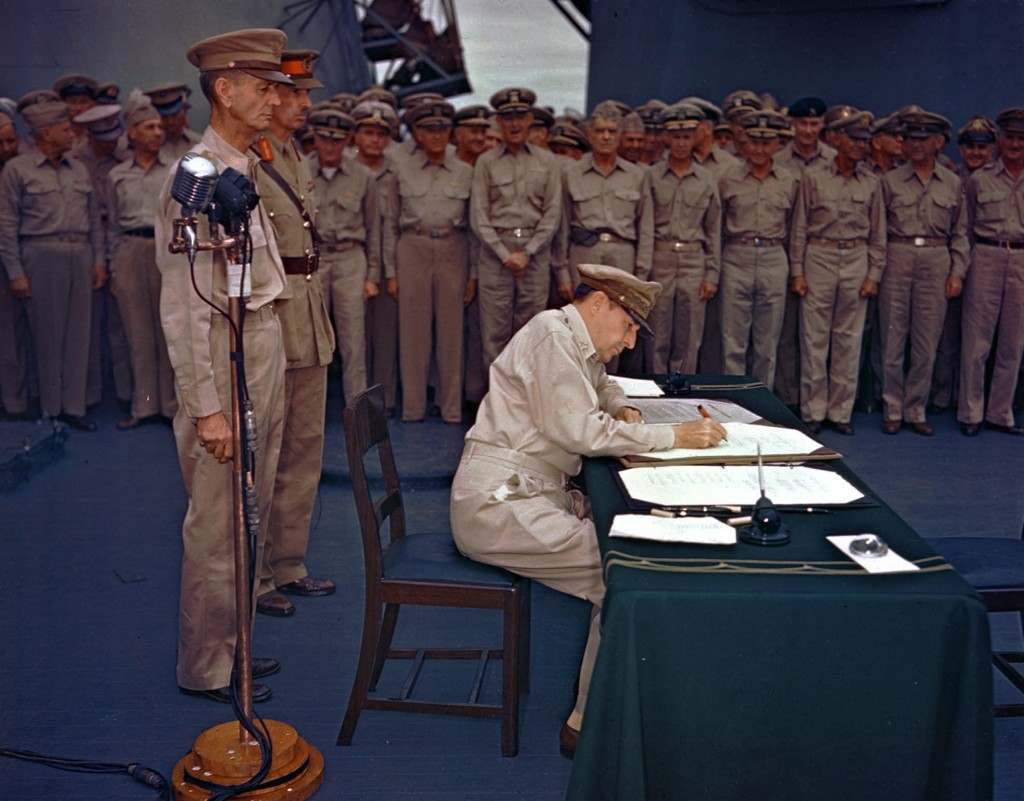
Gen. Douglas MacArthur signs the Japanese surrender documents Sept. 2, 1945, aboard the USS Missouri in Tokyo Bay. Lt. Gen. Jonathan Wainwright, left foreground, who surrendered Bataan to the Japanese, and British Lt. Gen. A. E. Percival, next to Wainwright, who surrendered Singapore, observe the ceremony marking the end of World War II. (AP Photo)
Ref #: PA.4762828
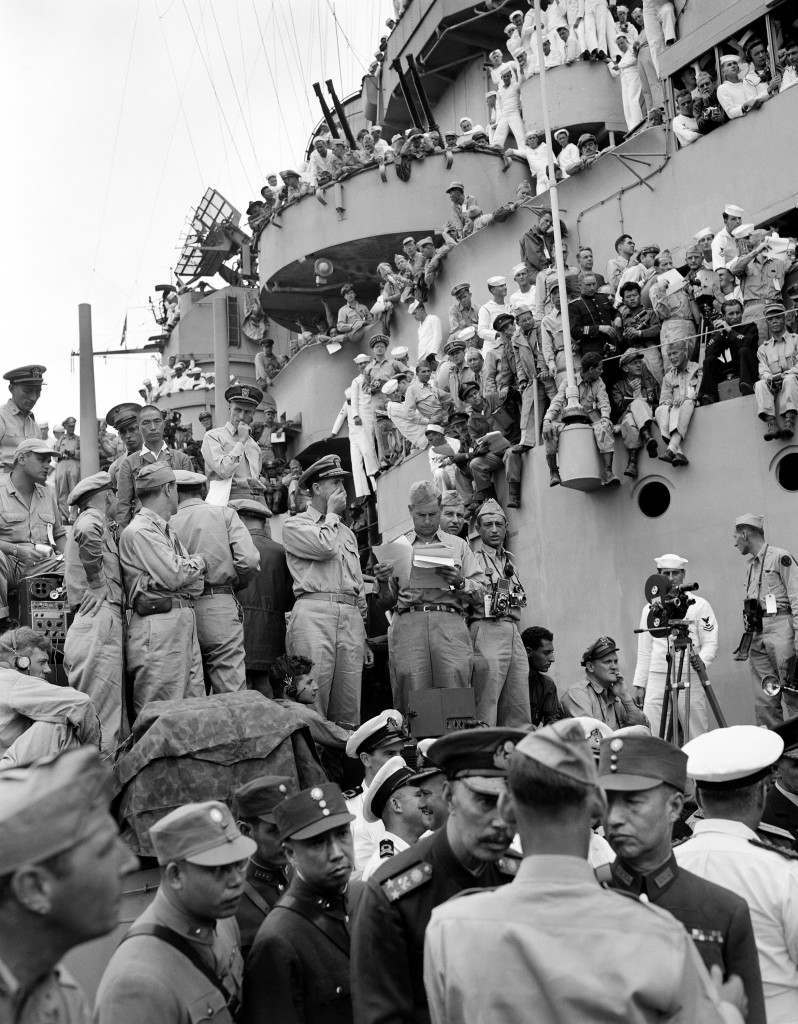
Spectators and correspondents from all over the world pick vantage positions on the deck of the USS Missouri, in Tokyo Bay, on September 2, 1945, to watch the formal Japanese surrender ceremony marking the end of World War II. (AP Photo, Frank Filan)
Ref #: PA.2373534
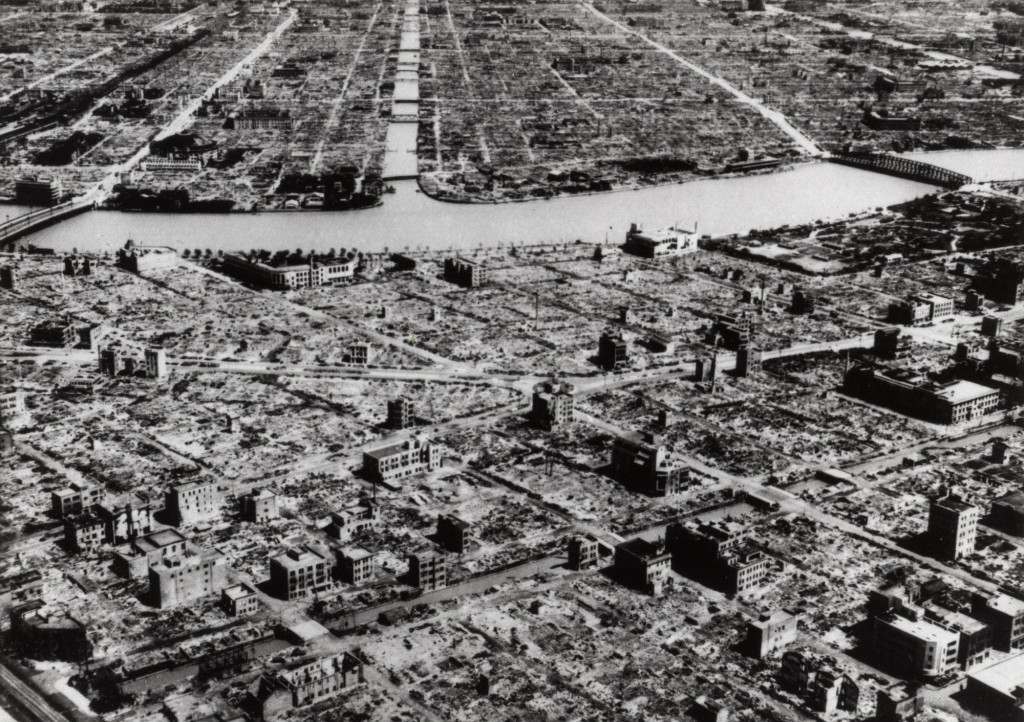
This aerial photo taken in March 9, 1945 shows the industrial section of Tokyo along the Sumida River. With the exception of the concrete buildings a great part of the area has been razed by incendiary and other strikes by U.S.warplanes in March, 1945. The Tokyo firebombing has long been overshadowed by the subsequent U.S. atomic attacks on Hiroshima and Nagasaki preceding the Japanese surrender that ended World War II. But the burning of the capital stands as a horrifying landmark in the brutal history of warfare on noncombatants. (AP Photo)
Ref #: PA.6029484
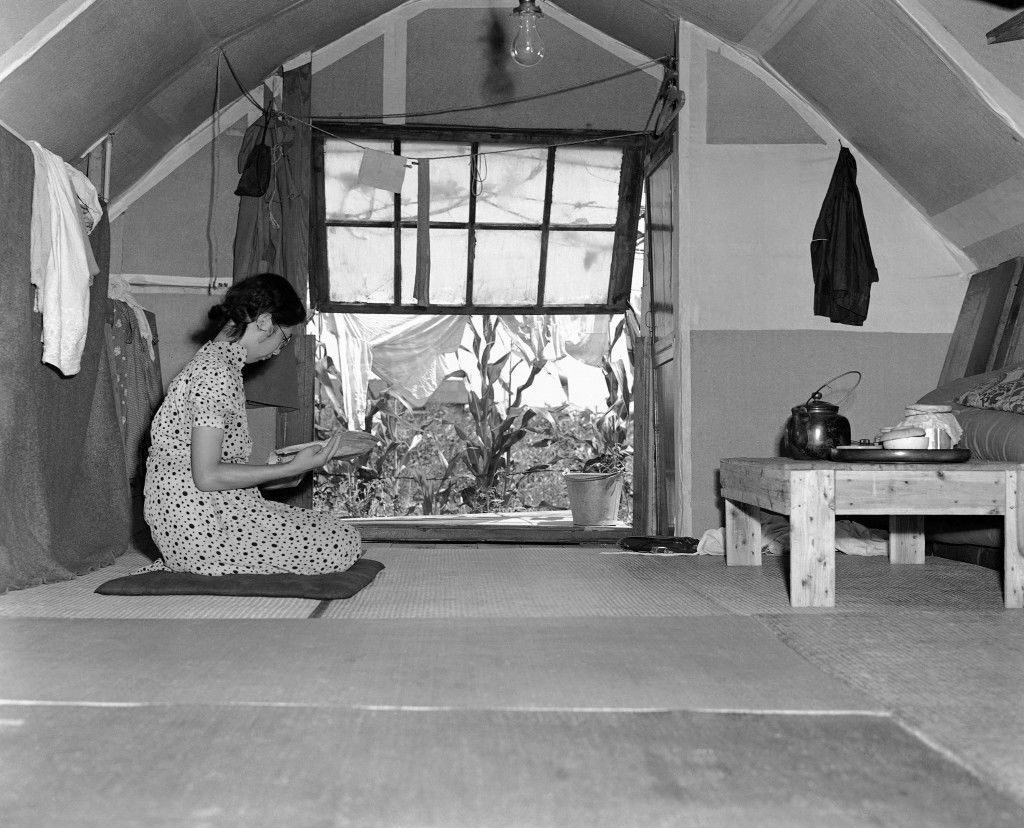
Interior of one of the homes built out of salvaged material from homes in Tokyo on July 24, 1944, that were bombed or burned. Furniture is scare but the harvest through the window looks good and a little trading with the neighbors will keep the larder stocked till the rice crop comes in. (AP Photo/Charles Gorry)
Ref #: PA.11498812
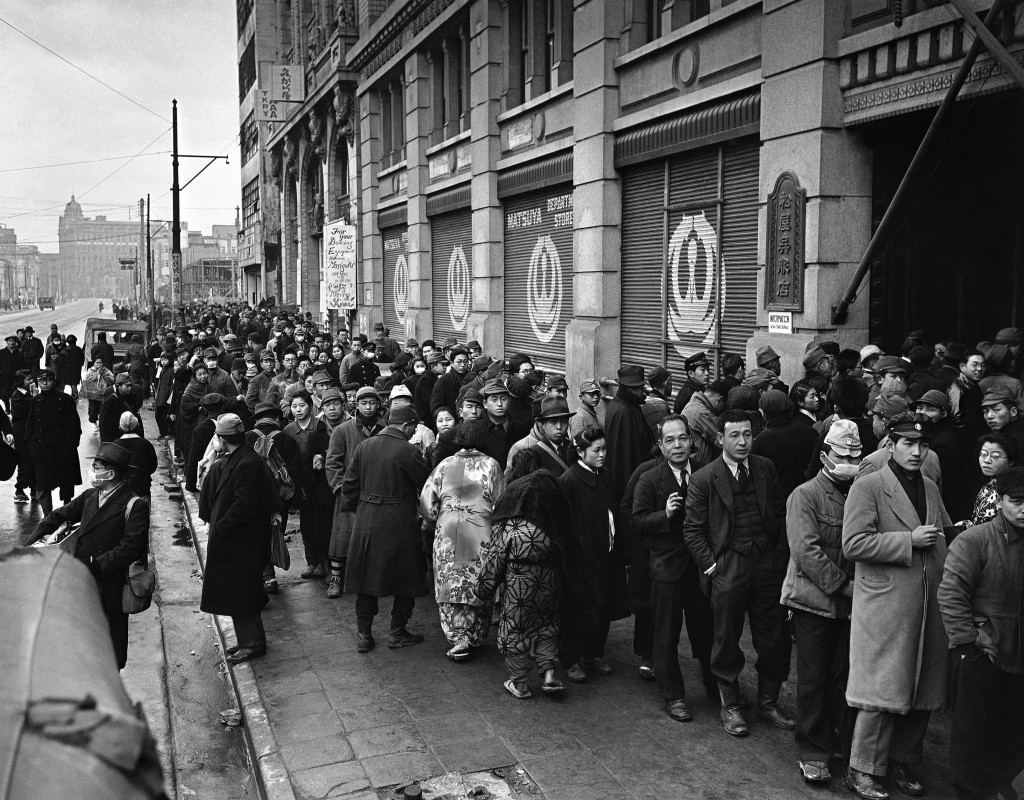
Part of the crowd that waited in line to purchase the new Japanese cigarette ÂPeace, ten to a packet and one pack to a customer in front of the Matsuya department store on the Ginza, TokyoÂs main shopping center on Jan. 25, 1944. (AP Photo/Charles Gorry)
Ref #: PA.11538769
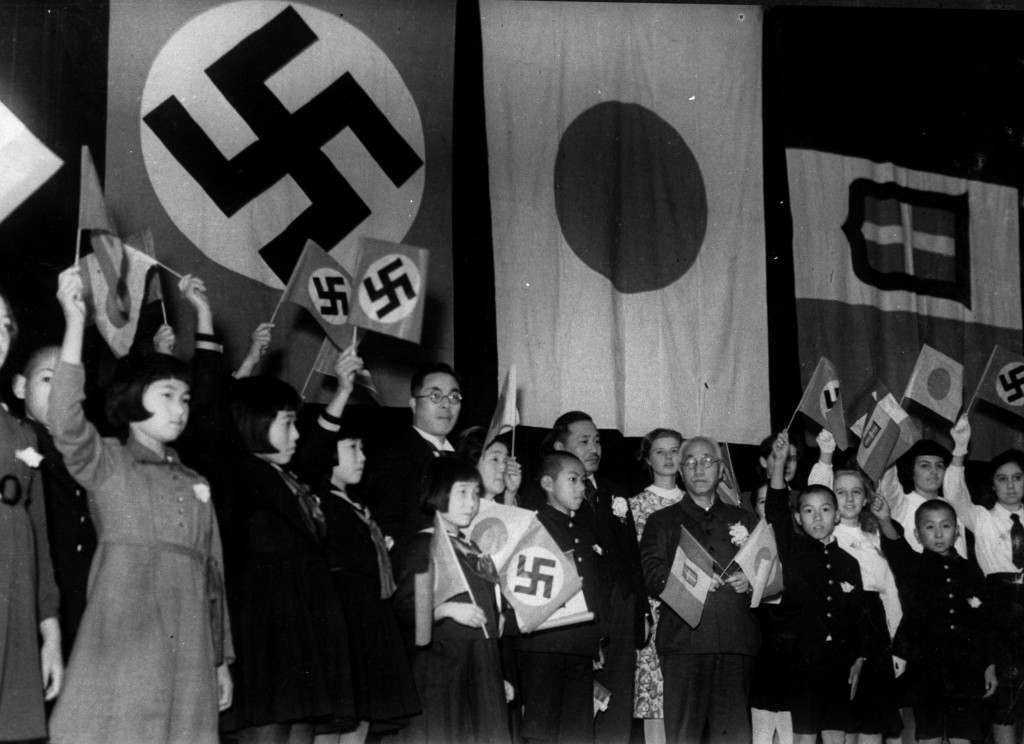
Children of Japan, Germany, and Italy meet in Tokyo to celebrate the signing of the Tripartite Alliance between the three nations, December 17, 1940. Japanese education minister Kunihiko Hashida, center, holding crossed flags, and Mayor Tomejiro Okubo of Tokyo were among the sponsors. (AP Photo)
Ref #: PA.8632668
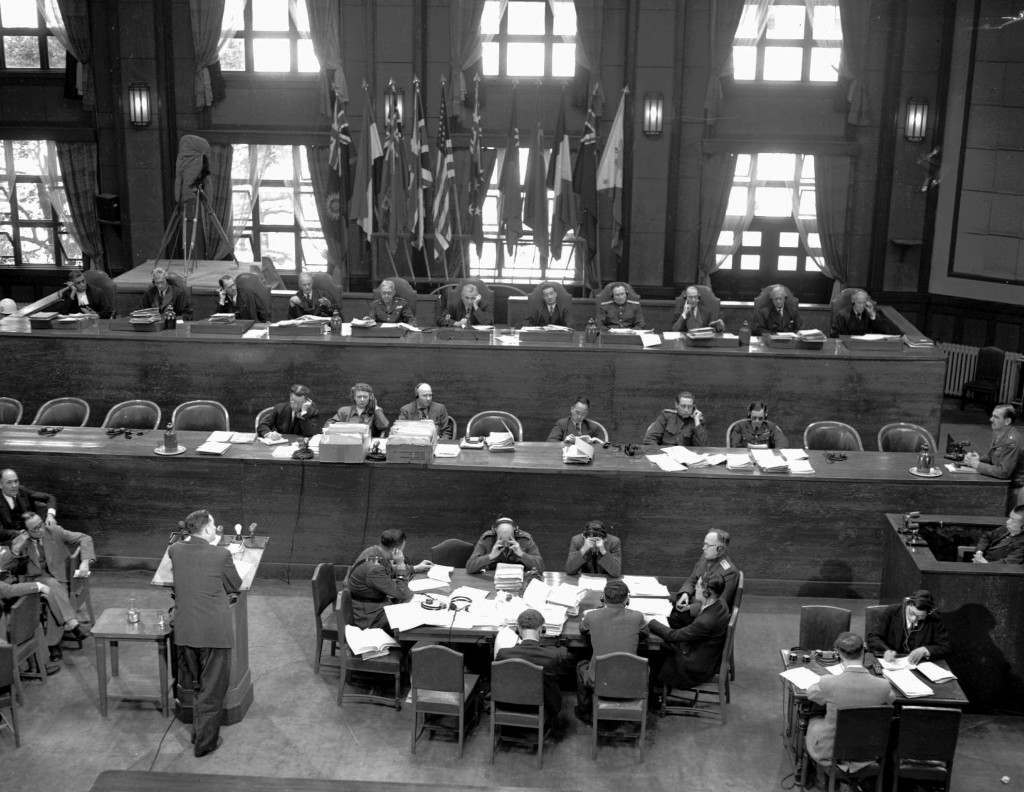
This is a general view of the International Military Tribunal for the Far East meeting in Tokyo in April, 1947. On May 3, 1946, the Allies began the trial of 28 Japanese civilian and military leaders for war crimes. Seven were hanged; others served prison terms. (AP Photo)
Ref #: PA.8656802
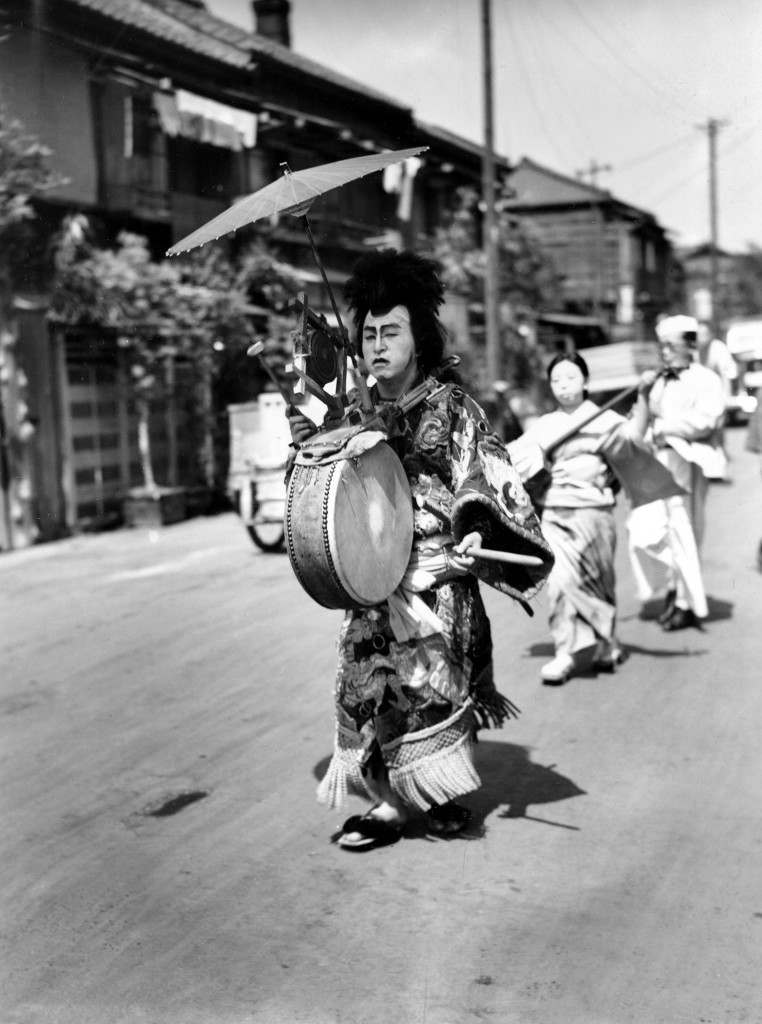
A Japanese man in costume beats the drum as he leads a musical parade of men and women who are walking advertisements featuring placards for restaurants through the streets of Tokyo, Japan, Feb. 14, 1947. (AP Photo)
Ref #: PA.8661110
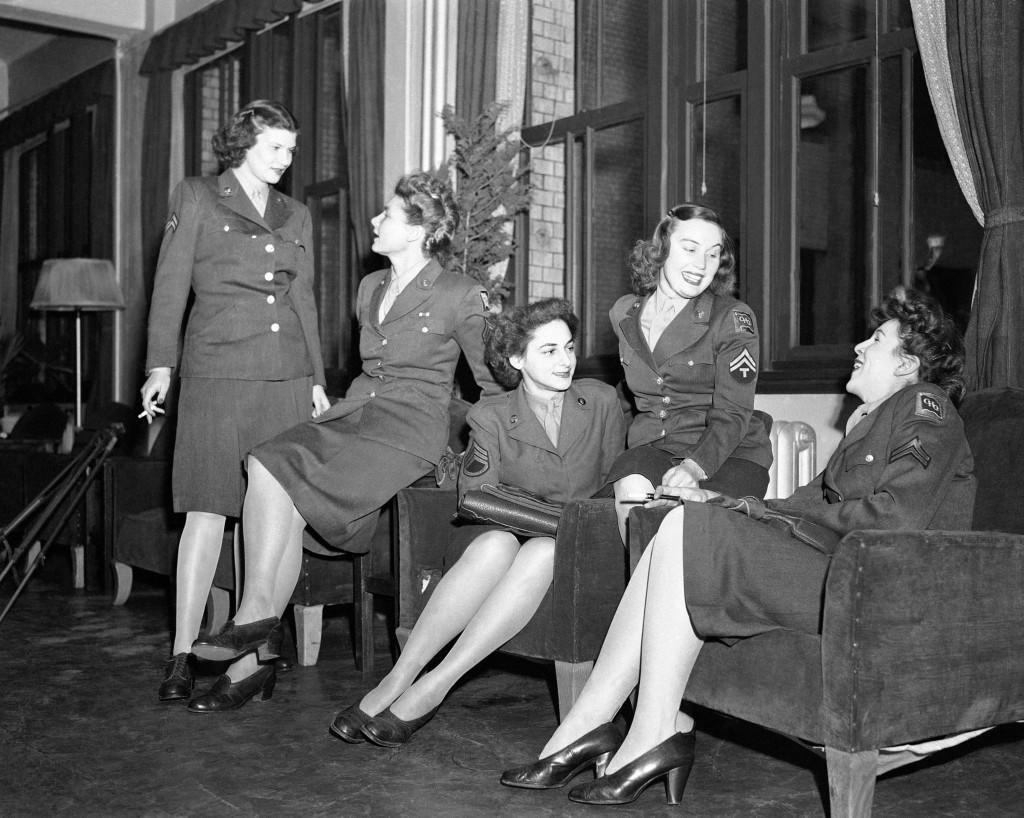
Group of WACs pose in Tokyo lounge on March 17, 1947. From left to right: Cpl. Joan Marley, Cleveland, Ohio; Cpl. Virginia Mahringer, St. Louis, Missouri; Staff Sgt. Artemus L. Bekiares, Chicago, Ill.; Cpl. Elizabeth Gordon, Norwich, Conn.; and Cpl. Virginia Schweitzer, of St. Albans, N.Y. (AP Photo)
Ref #: PA.11560042
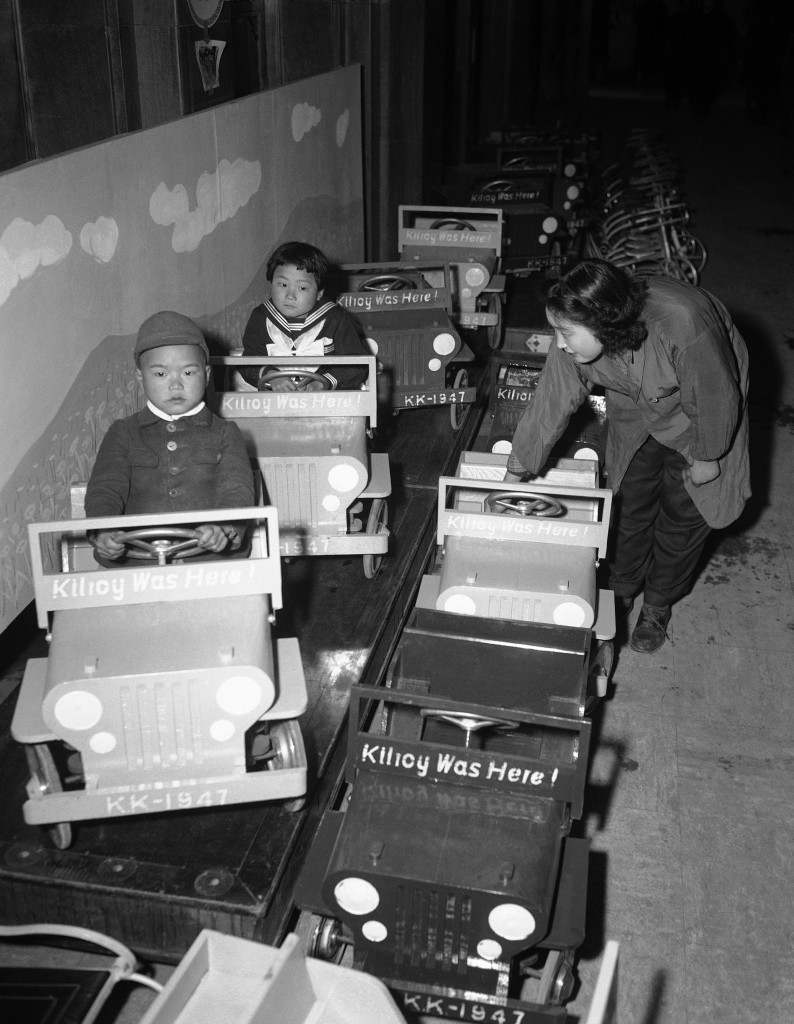
Japanese children, visiting a Tokyo department store on March 21, 1947, try out toy jeeps bearing the slogan, ÂKilroy was here, placed on them by the Japanese manufacturer. (AP Photo/Charles Gorry)
Ref #: PA.11484377
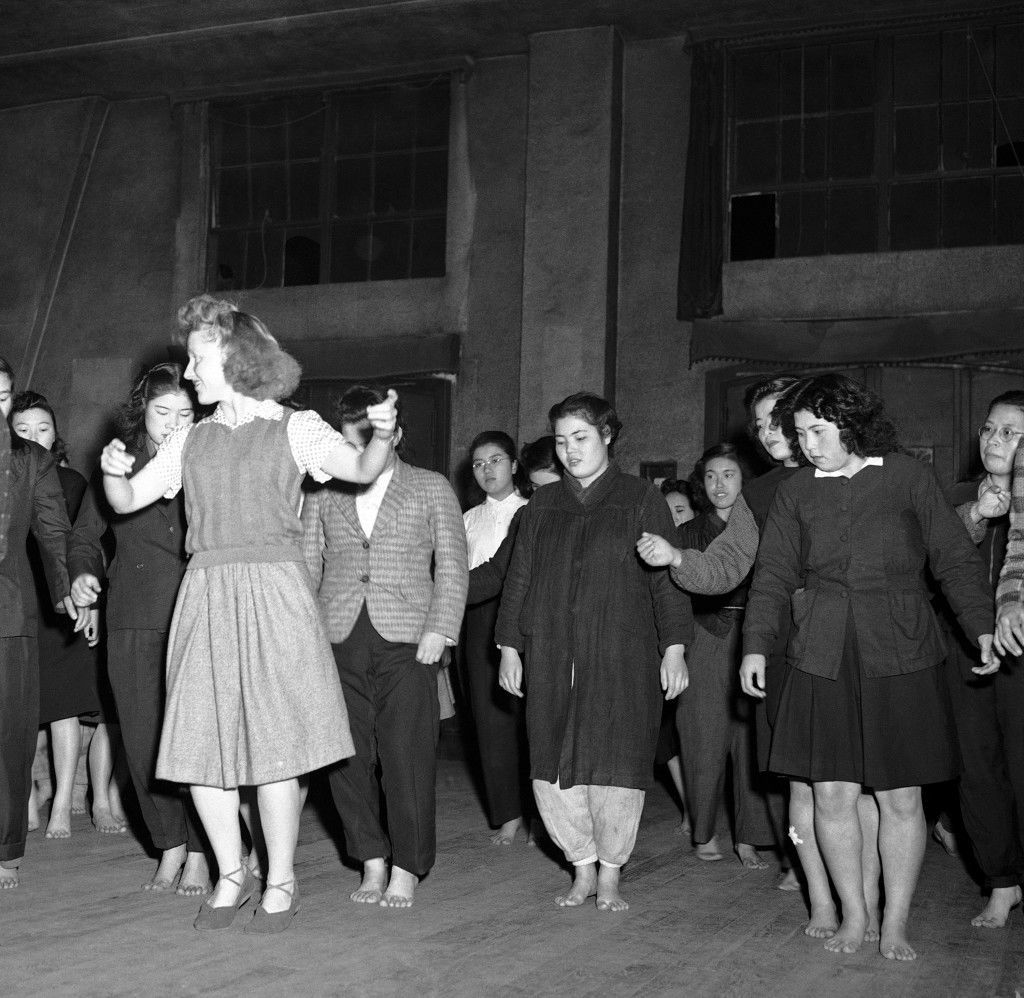
Barbara McBride teaches Russian-style Korobotchka dance to her Japanese students in Tokyo at the YWCA, once a week as seen here, Dec. 29, 1946. (AP Photo)
Ref #: PA.7641875
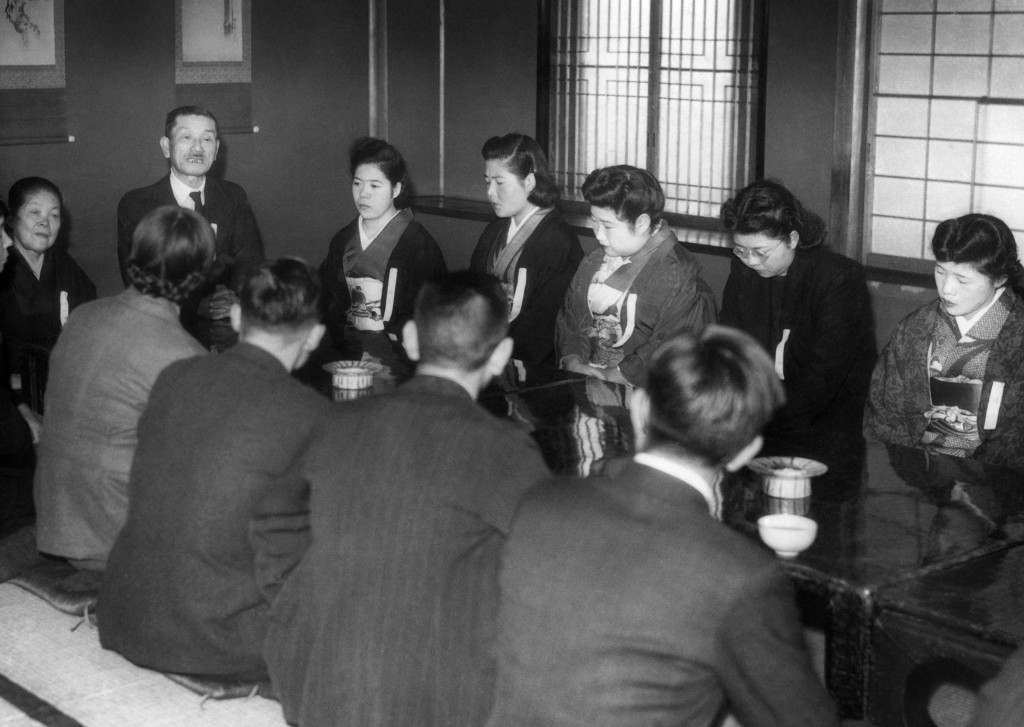
Eight girls and four men met with matrimony as the object at the Myogetsu-En, behind the Ueno Art Museum in Tokyo on Sunday, Jan. 28, 1947. The go-between the marriage interview was the Nippon (Japan) Eugenic Marriage Association which declared it has an overwhelming number of women than men on its waiting list. (AP Photo)
Ref #: PA.11460510
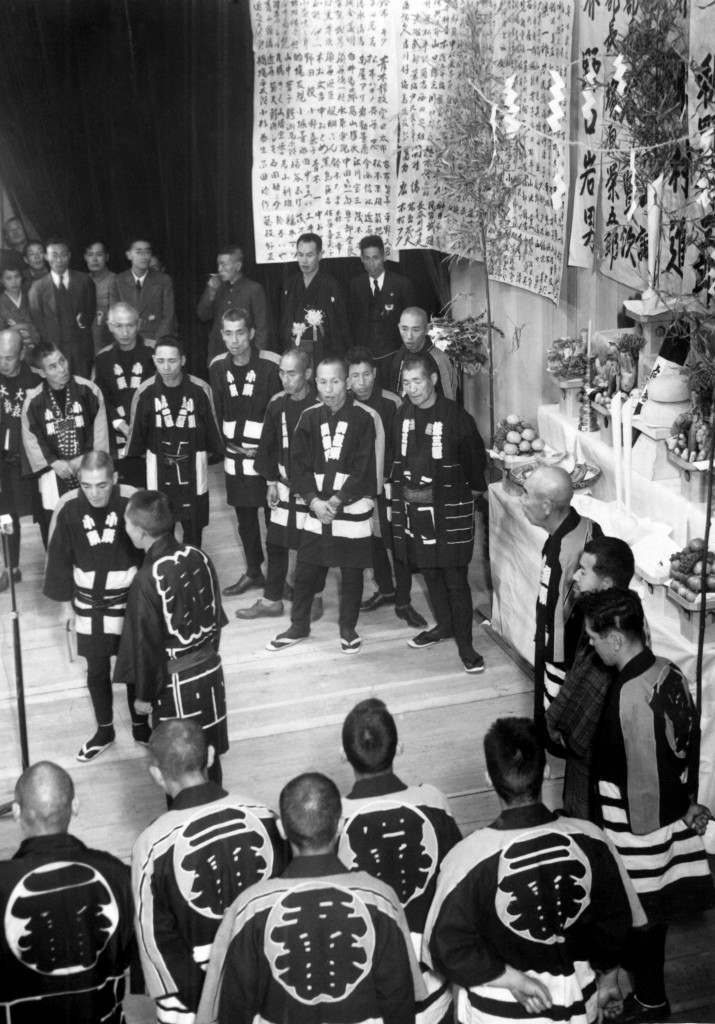
Gangsters ÂJapanese style, at ceremony inducting the new Âboss as head man of all the different factions in Tokyo on Oct. 30, 1946. The man on the left is the new boss, the head men of the other factions can be distinguished by the markings on their jackets. These men control every working man in Tokyo, by kick-backs, job control and other methods, commonly used in Chicago. (AP Photo/Charles Gorry)
Ref #: PA.11497430
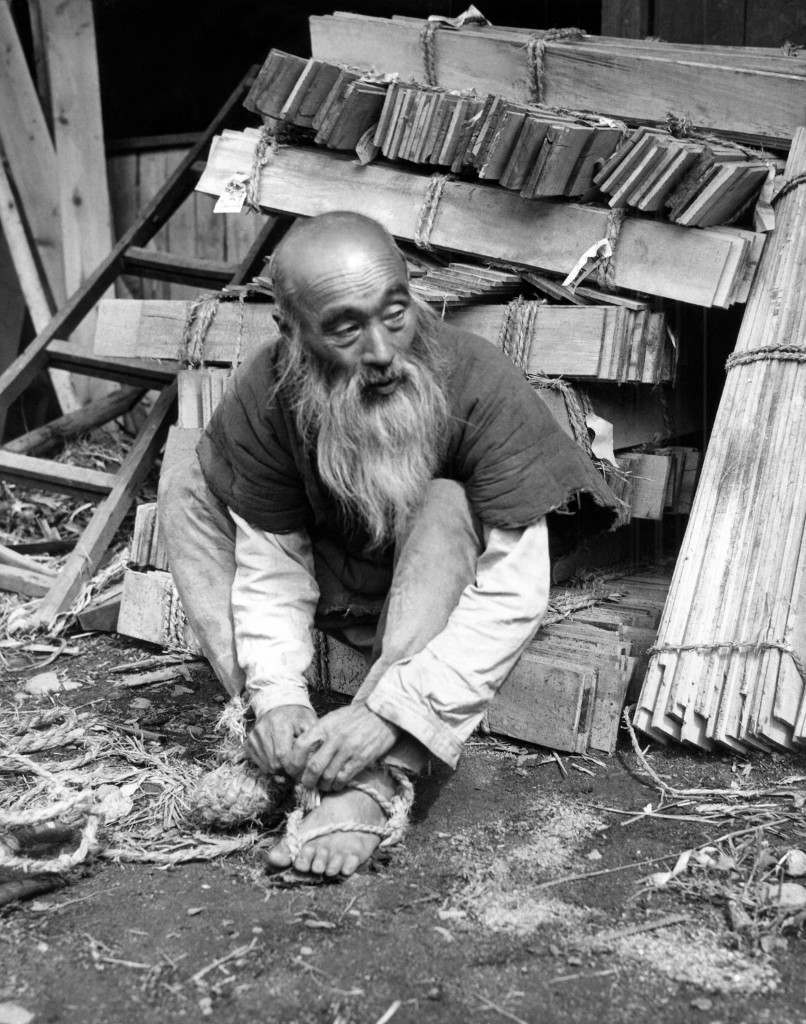
Hikosaku Sakamoto, 63-year-old Japanese farmer, who doubles as a long distance runner and weight-lifter once each year to advertise the shrine festival in his hometown, Shirakawa, Japan, removes his straw sandals on Sept. 24, 1946, after running 125 miles from Shirakawa to Tokyo. (AP Photo/Charles Gorry)
Ref #: PA.11497403
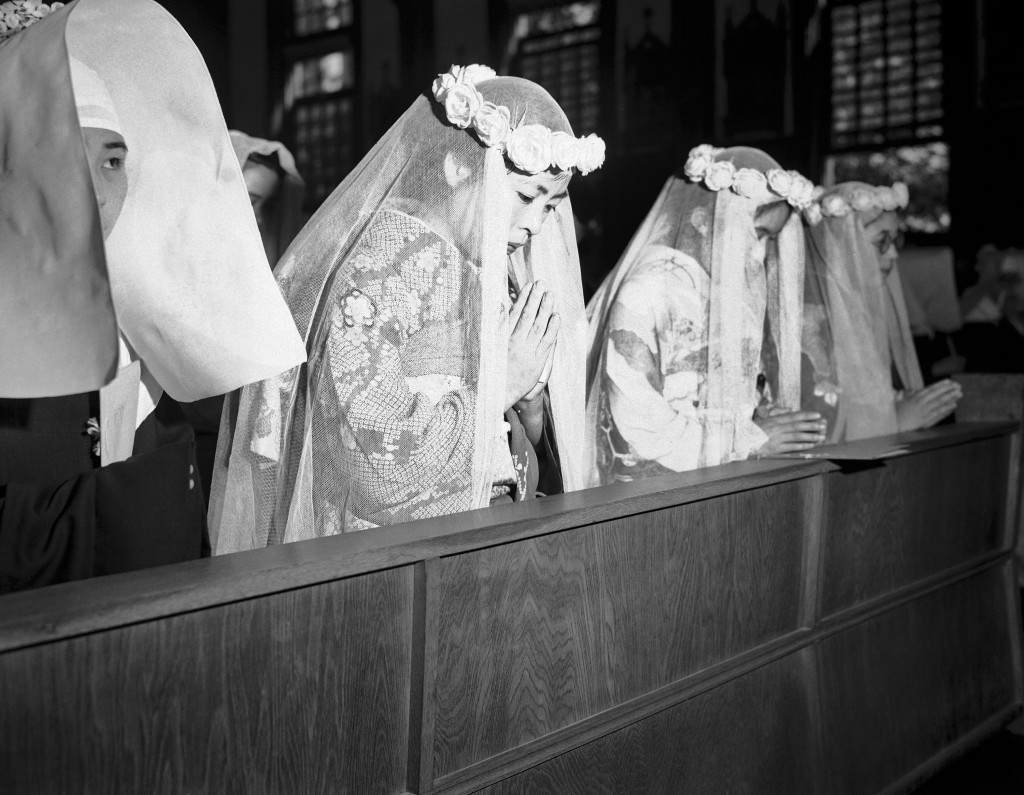
The girls offer up prayers a few minutes before they took their first vow in their first step towards sisterhood, they are at the altar in Tokyo, Japan on Oct. 8, 1946. (AP Photo/C. P. Gorry)
Ref #: PA.10807577
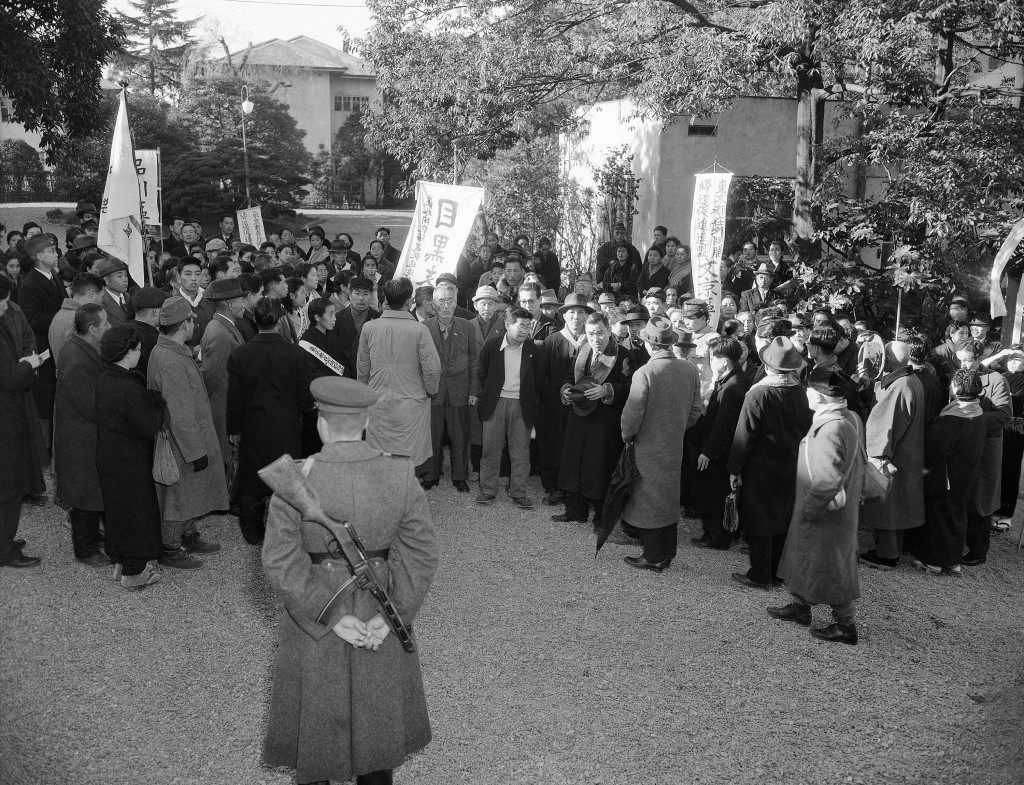
Russian soldier with tommy gun stands guard outside the Russian Embassy as the members of the “Repatriation Association of Japan” await an answer to present their case to this head of the mission in person, in Tokyo, Japan on Dec. 22, 1949. (AP Photo/Charles Gorry)
Ref #: PA.11447050
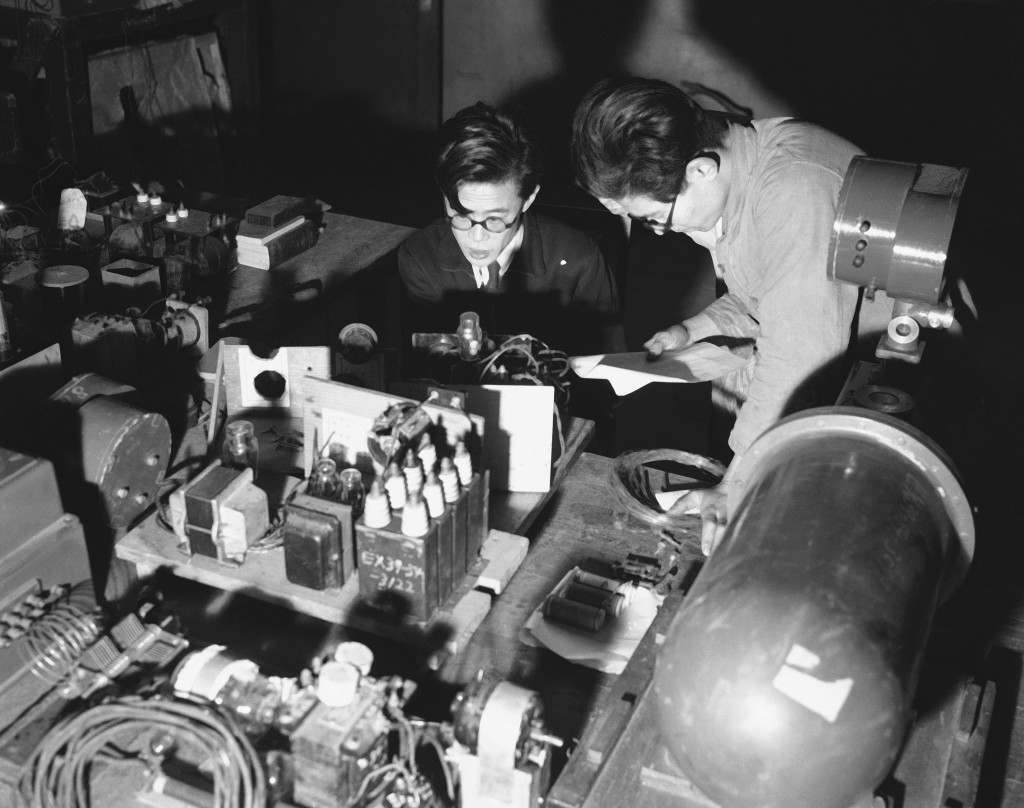
A group of Japanese scientist under the leadership of Dr. Yoshio Nishina is working on the continuous measurement of cosmic ray intensity, measuring the mass of the meson, one of the elementary particles of atomic nucleus. The research is being done by Scientific Research Institute Limited headed by Dr. Nishina, who among other thins manufacturers penicillin to help defray the costs of the experiments as the government does not appreciate any funds for research. They carry on their work in a lab that would do justice to a Rube with dangling wires, broken down boxes used to house equipment and room heaters to try and control temperature and also keep the drafty, damp working quarters warm. Assistant checks over the Geiger-Muller counter at laboratory in Tokyo, Japan on Dec. 1, 1949. (AP Photo)
Ref #: PA.10444693
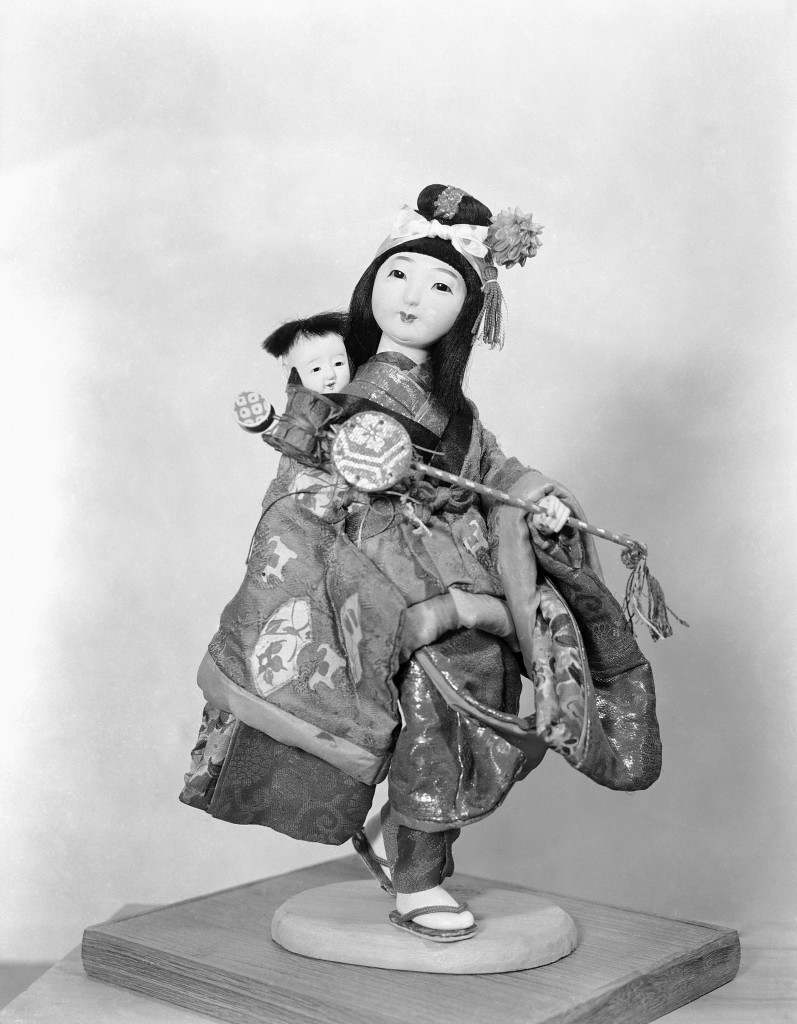
One of 20 dolls donated by Japanese manufactures for the United Nations International ChildrenÂs Emergency Fund in Japan on Oct. 27, 1949. This doll is quite expensive, and is made for display not play. The dolls were turned over to an UNICEF representative in Tokyo, for shipment to New York City. (AP Photo/Charles Gorry)
Ref #: PA.11499384
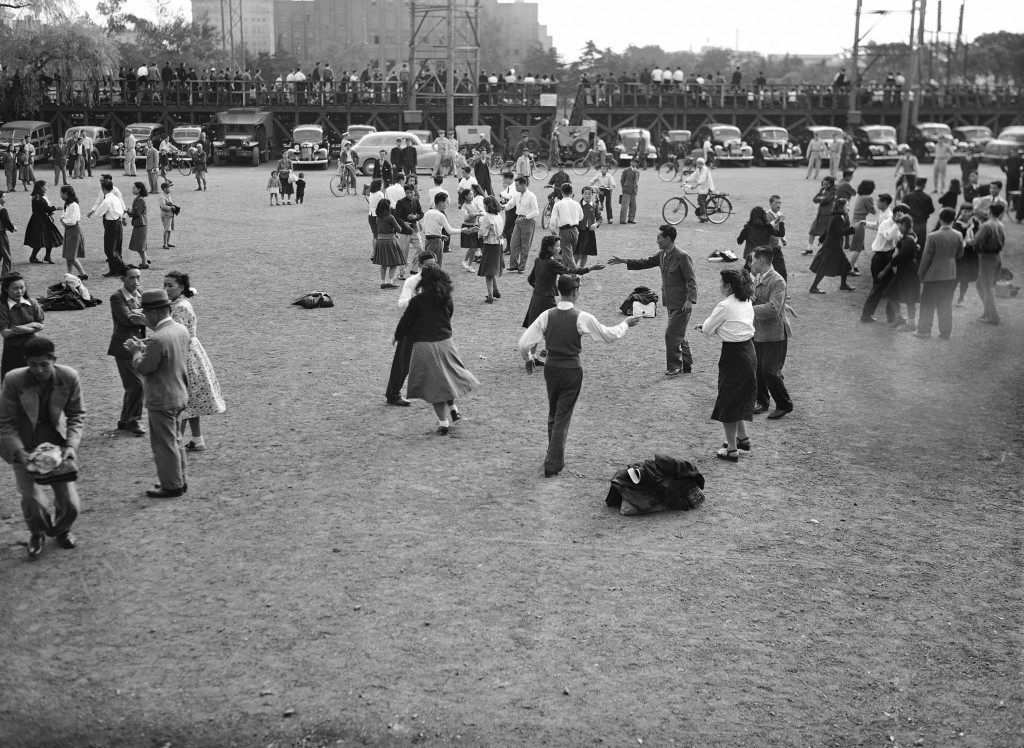
The Virginia reel, a favorite American folk dance, is something new for the Japanese, dancing in Hibiya Park, Tokyo, Oct. 18, 1949. The music is ÂParlez Vous, a World War I tune. The dancers are employees and friends of a Tokyo business organization, which got the people out for square dancing on a balmy day as part of a new move to better employer-employee relations. (AP Photo/Charles Gorry)
Ref #: PA.7641882
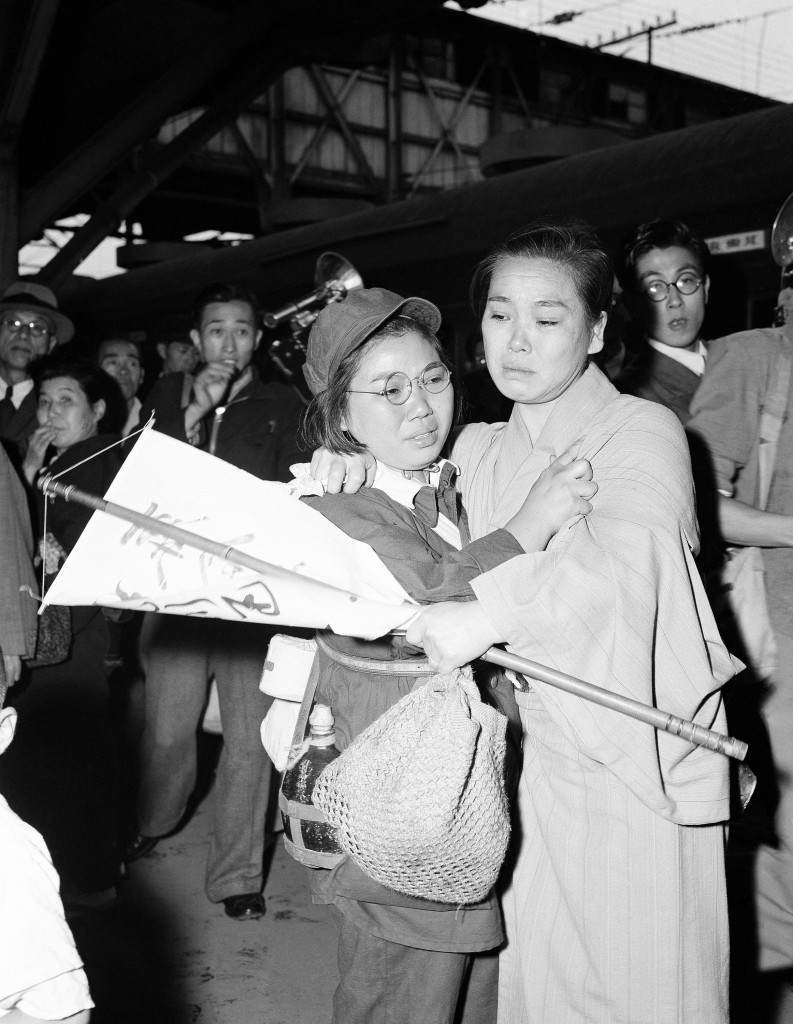
A mother and daughter meet after ten years of separation at Tokyo station on Oct. 7, 1949. They were separated on the continent during the war against China. The youngster, whose father died in the interim, wears a Communist type uniform given to her in Manchuria. (AP Photo)
Ref #: PA.11679155
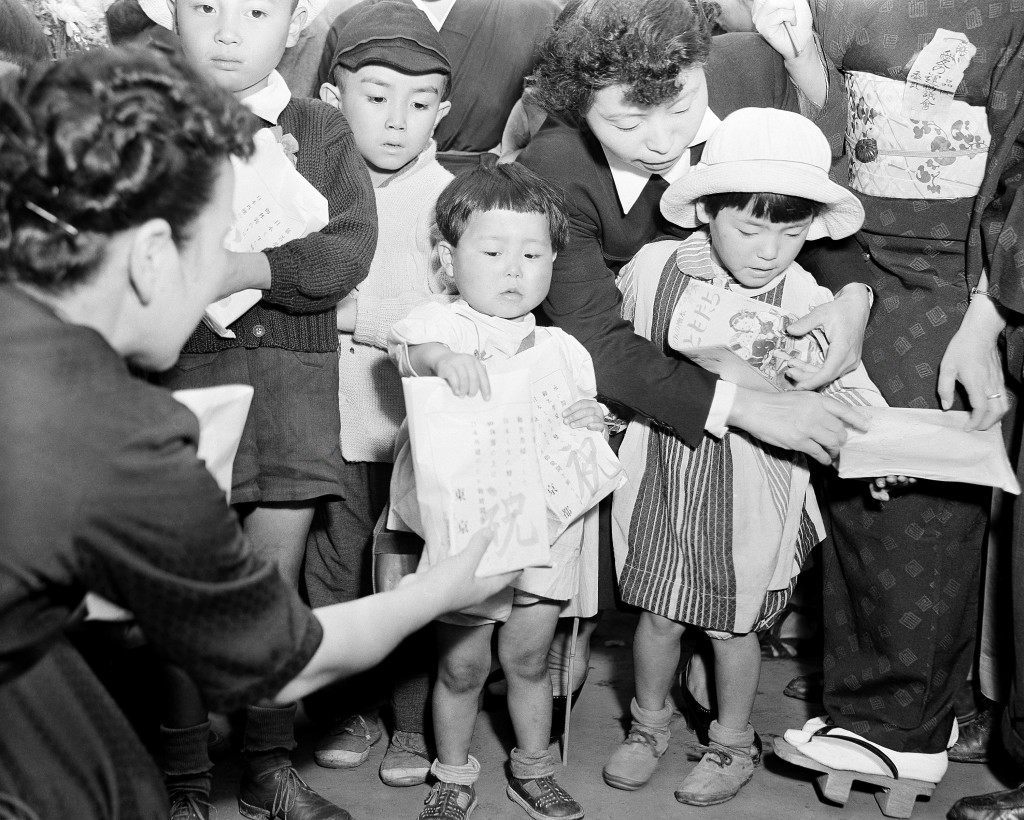
The first shipment of repatriates to arrive in Tokyo on Oct. 1, 1949, from Russian held territory of Dairen, Manchuria, which numbered among its group young children whose parents died overseas. They were met by social workers at Tokyo central station and will be taken to rest camps until relatives of the parents can be located. (AP Photo)
Ref #: PA.11679157
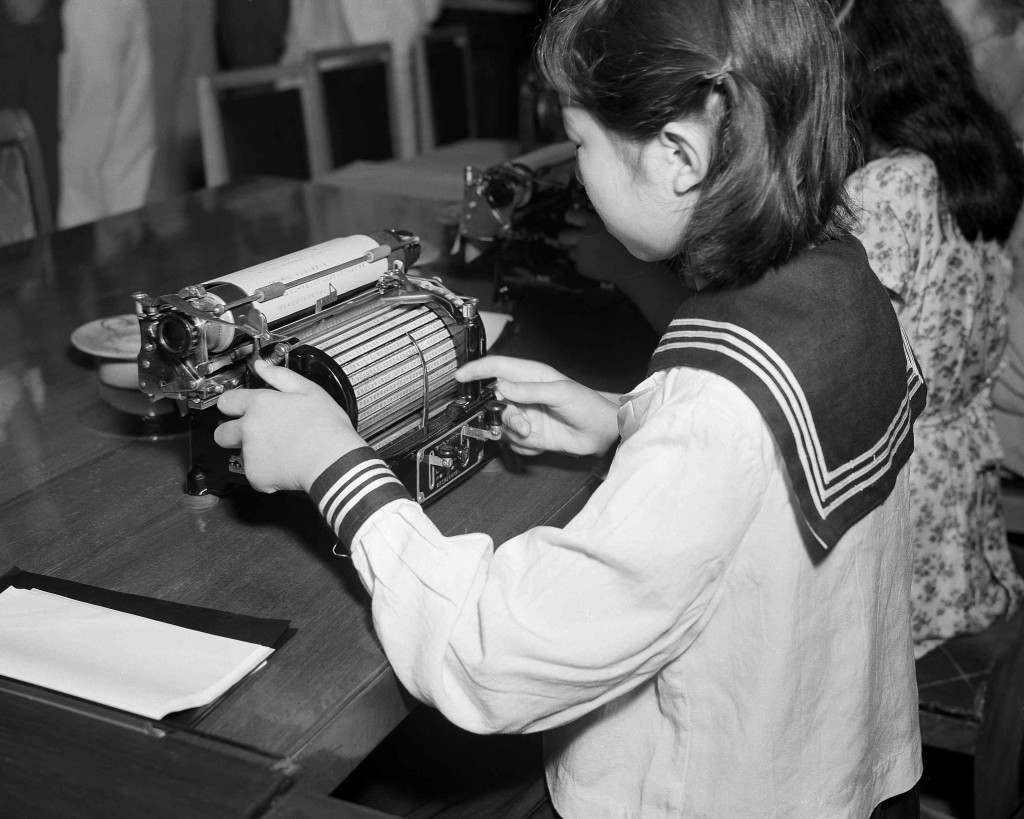
A new Japanese typewriter invented by Kotaro Kataoka, an employee of the Tokyo Electric Company, was demonstrated by a school student in Tokyo on August 31, 1949. The machine, smaller and lighter than the standard English language typewriter has the type cased on a cylindrical bed instead of the former Japanese flat bed in use. The new machine contains 1,132 characters in comparison to the old type which had 3000. (AP Photo/Charles Gorry)
Ref #: PA.11669475
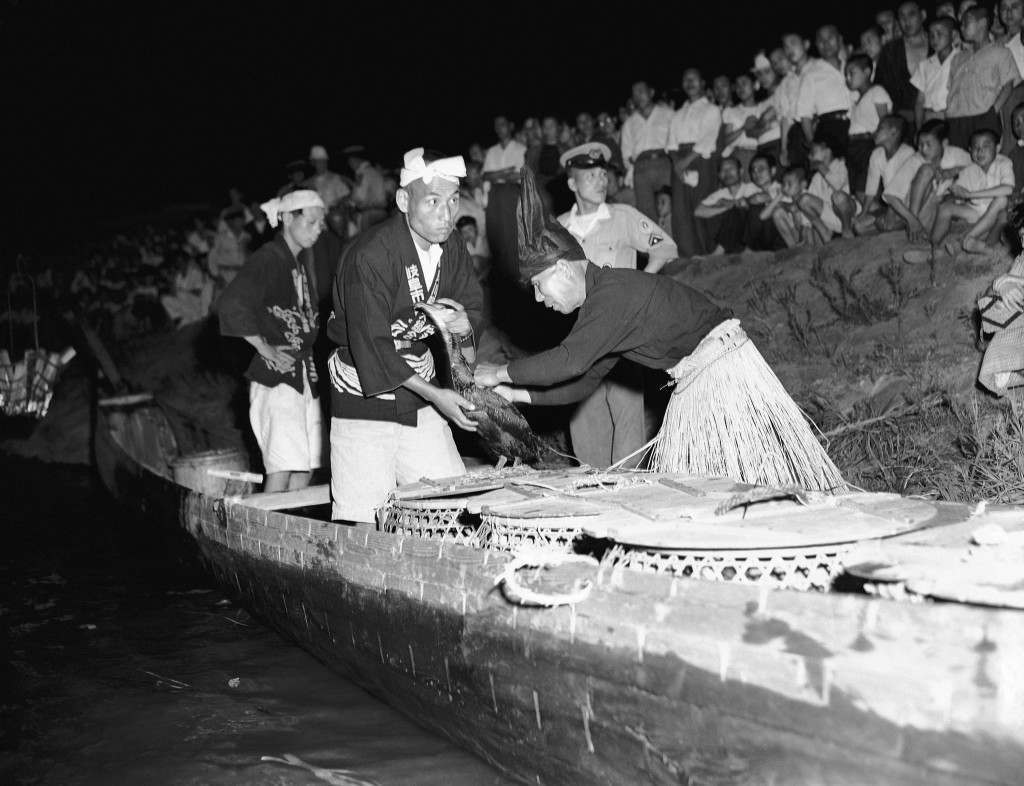
In traditional costume, bird fishermen demonstrate to a Tokyo crowd how to make the birds give up their catch of fish, July 23, 1949. Gentle stroking of the birds necks usually does the trick. The birds cannot swallow the fish because of a metal ring around their necks. (AP Photo/Charles Gorry)
Ref #: PA.11787857
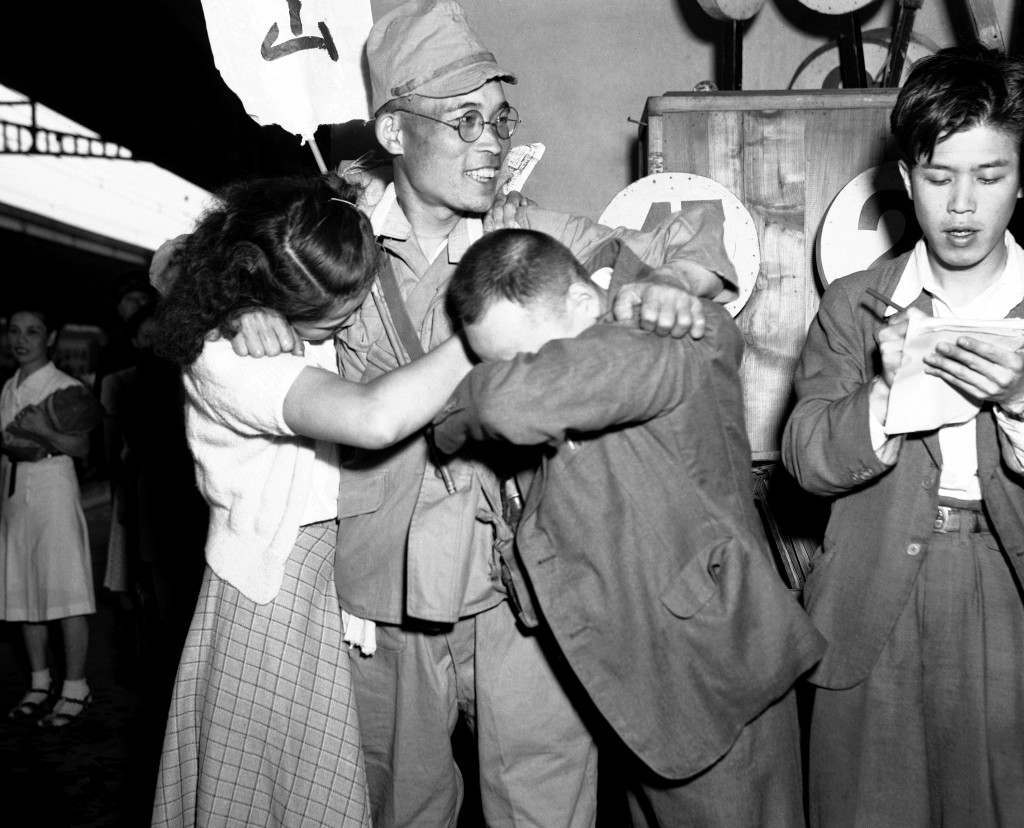
Family members greet each other as a small group of the first batch of repatriates from Russian held territory who arrived back in Japan aboard the Takasago Maru arrived at Shinagawa station a few miles from Tokyo on July 6, 1949. Their wives and children, many separated for over five years, were on hand to greet their husbands who they had thought lost in the war. (AP Photo/Charles Gorry)
Ref #: PA.11317035
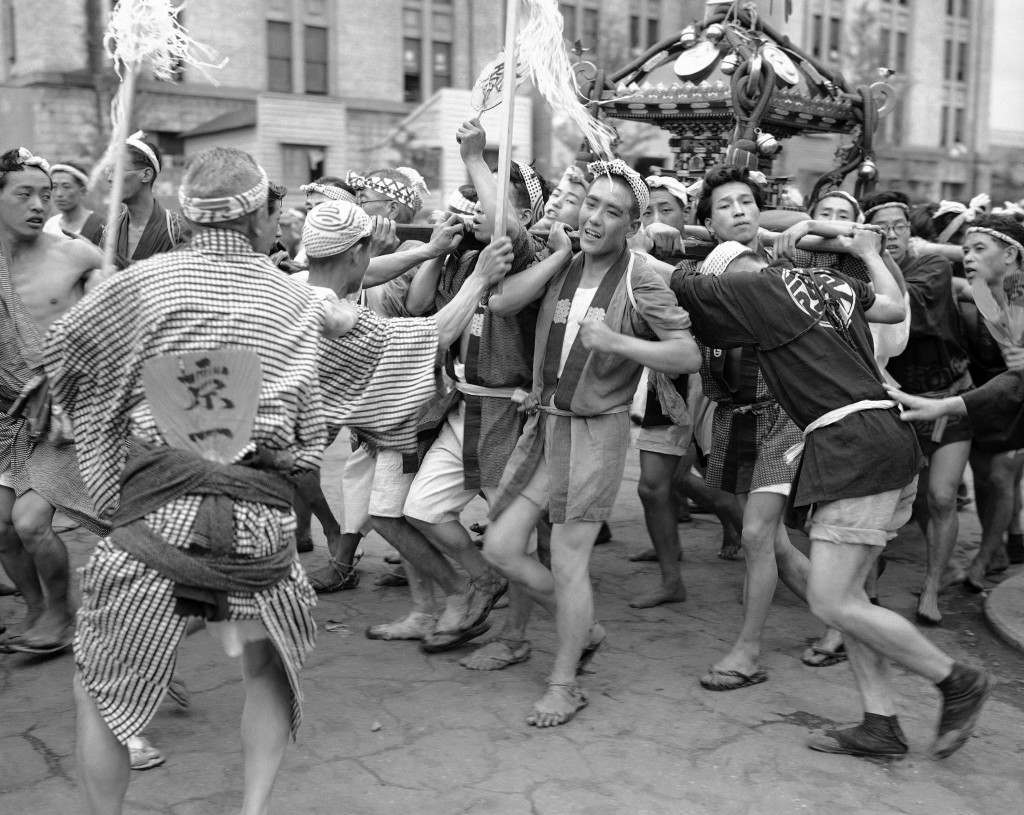
These excited young men are taking part in a festival in the Konda district of the city of Tokyo on April 7, 1949, sponsored by a small restaurant owner in the locality (who also had all the concessions cornered). They are carrying the neighborhoodÂs shrine on their shoulders, all the time jumping up and down and chanting. (AP Photo/Charles P. Gorry)
Ref #: PA.11400209
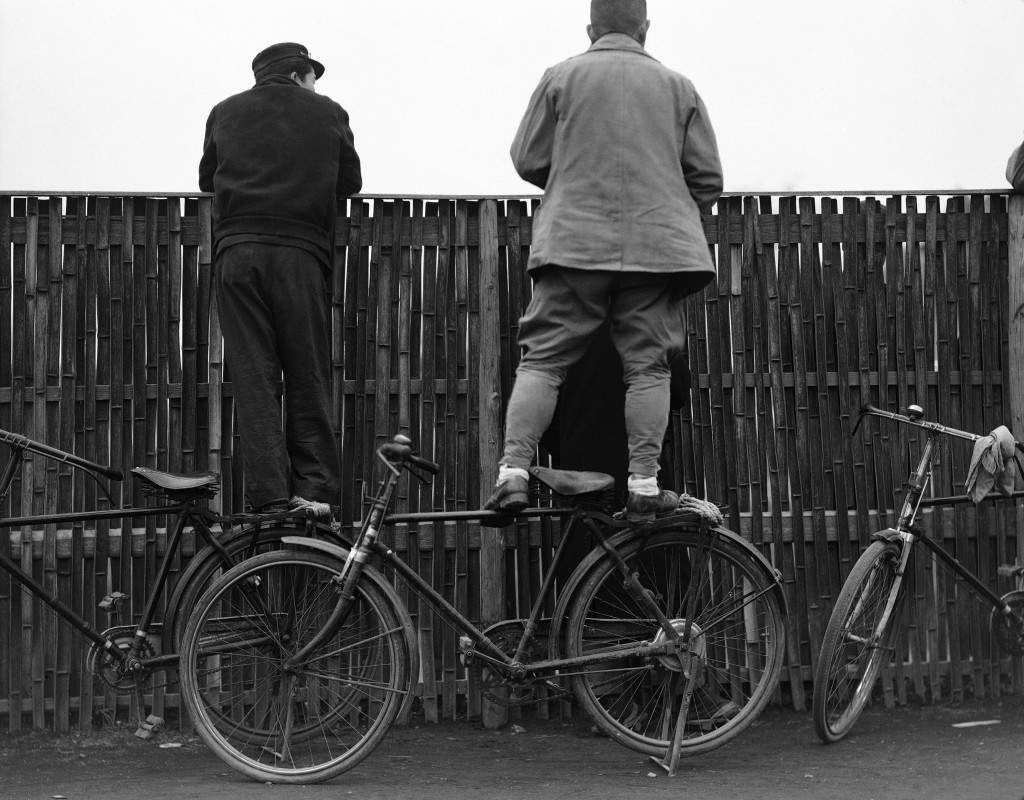
These fans are watching a pre-game practice session of ball players in Tokyo, Japan on March 25, 1949. The teams were warming up for the first playoff game, which opened JapanÂs baseball season. (AP Photo/Charles P. Gorry)
Ref #: PA.10924198
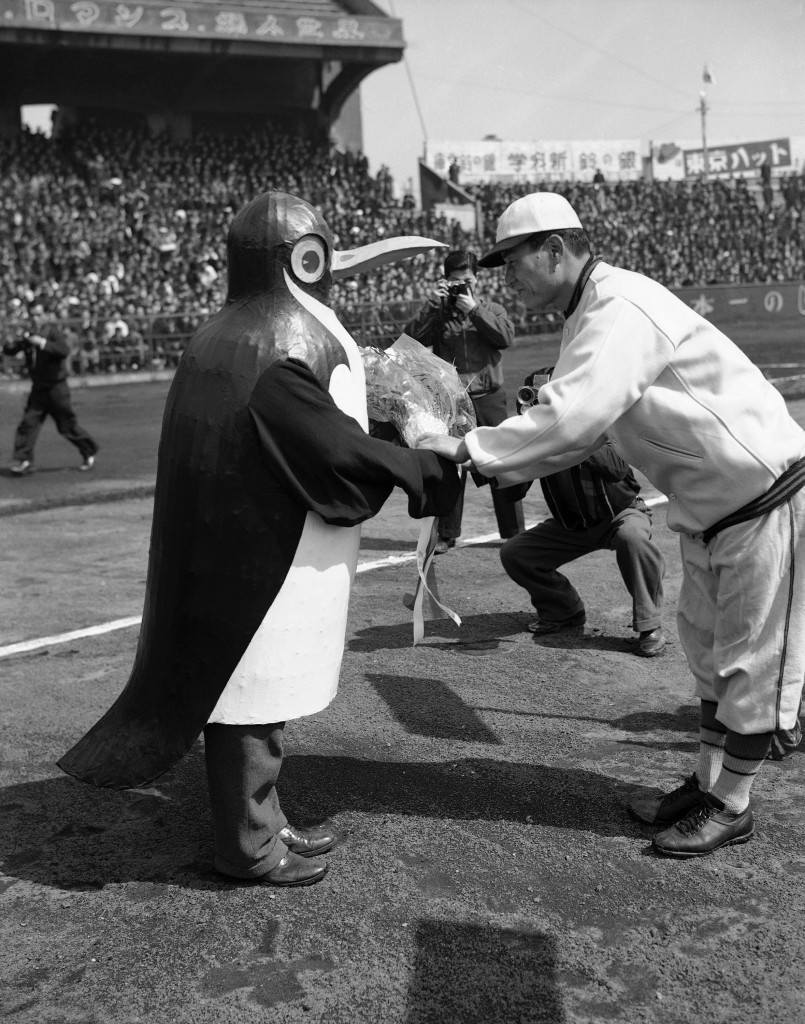
As the baseball season opened in Japan, a penguin-costumed attendant presents flowers to the manager of one of the eight teams in the league in Tokyo on March 25, 1949. Every manager gets a bouquet on opening day. (AP Photo/Charles Gorry)
Ref #: PA.11880696
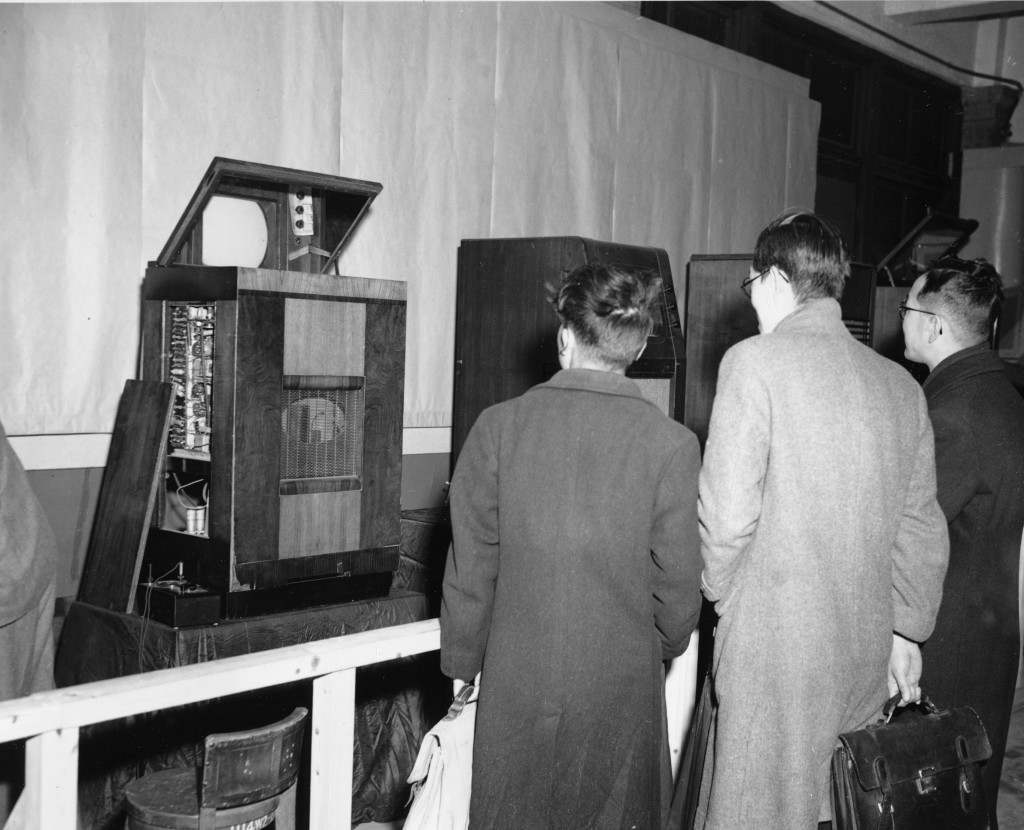
Visitors to the television demonstration at the studios of the Japanese Broadcasting Company wait for the show to appear on the screen of one on the receivers, in Tokyo, March 27, 1949. These receiving sets, which will have screens measuring eight by ten inches, are not ready for the market yet. (AP Photo/Charles P. Gorry)
Ref #: PA.8679577
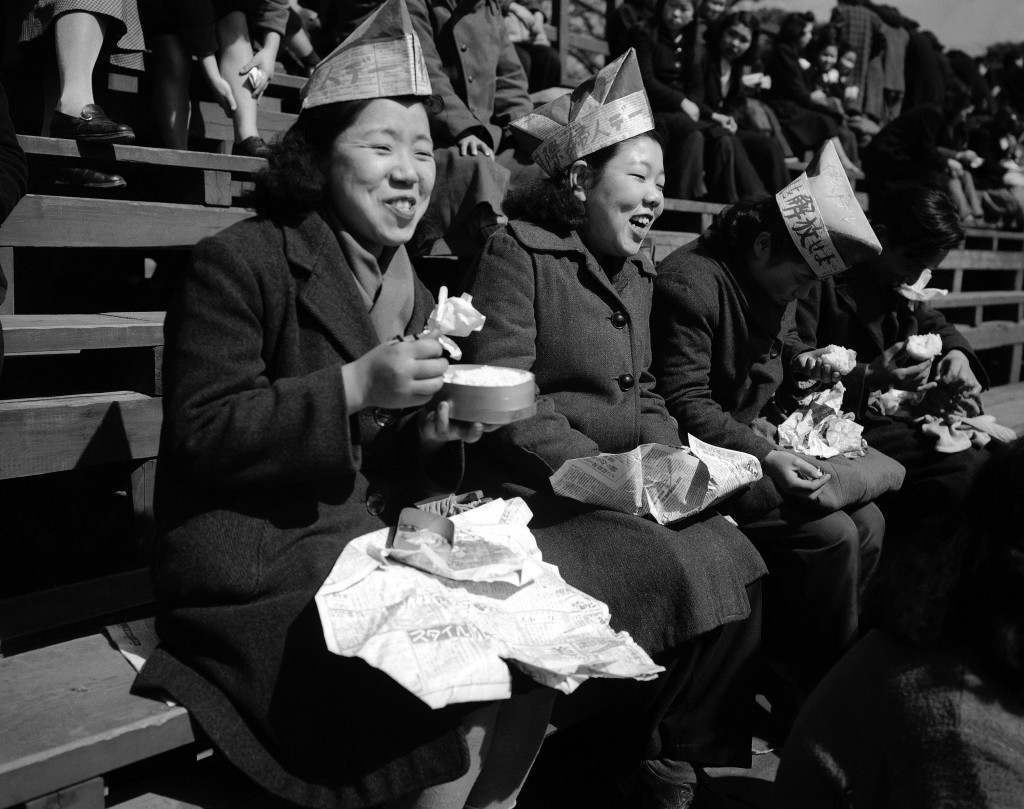
It’slunchtime for ladies attending the Communist-sponsored International WomenÂs Day rally in Tokyo on March 16, 1949. (AP Photo)
Ref #: PA.11678476
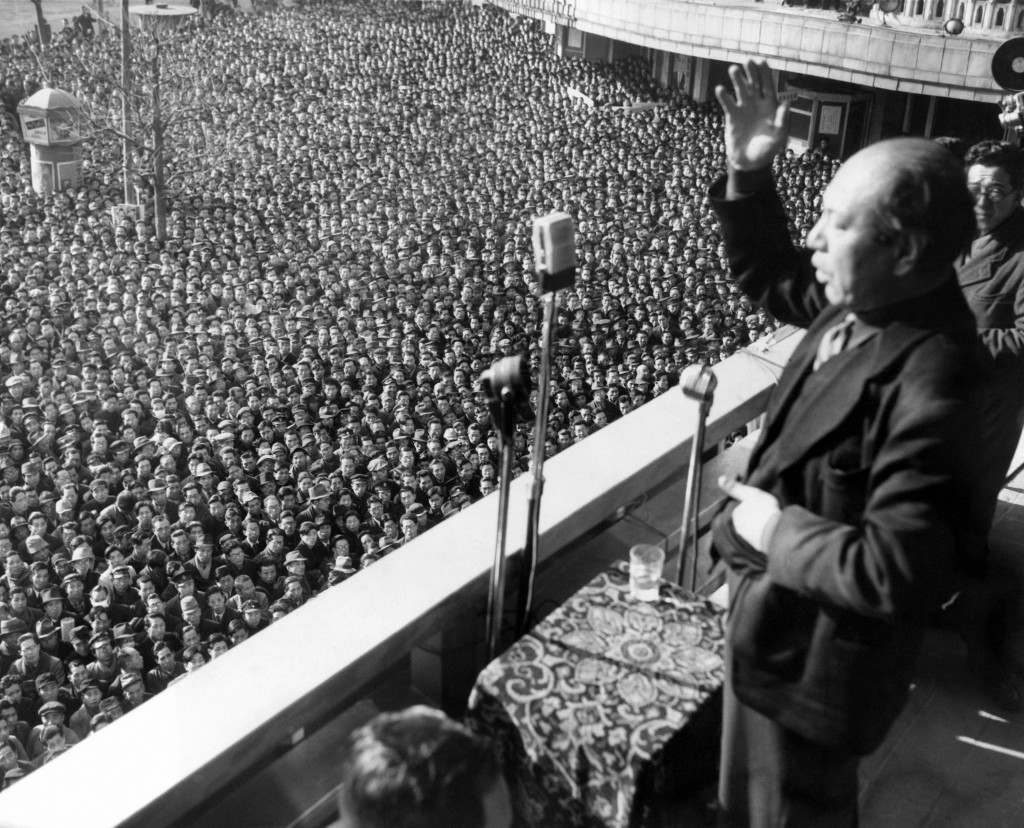
Kyuichi Tokuda, Secretary General of the Communist Party in Tokyo, gestures as he thanks the huge crowd which gathered outside the Asahi newspaper office in Tokyo on Jan. 24, 1949 to hear the election returns. The communists gained 31 new seats in the Japanese Diet, boosting their total to 35. Premier Shigeru YoshidaÂs ultra-conservative party, however, won 263 seats, a gain of 100. (AP Photo/Charles P. Gorry)
Ref #: PA.11514083
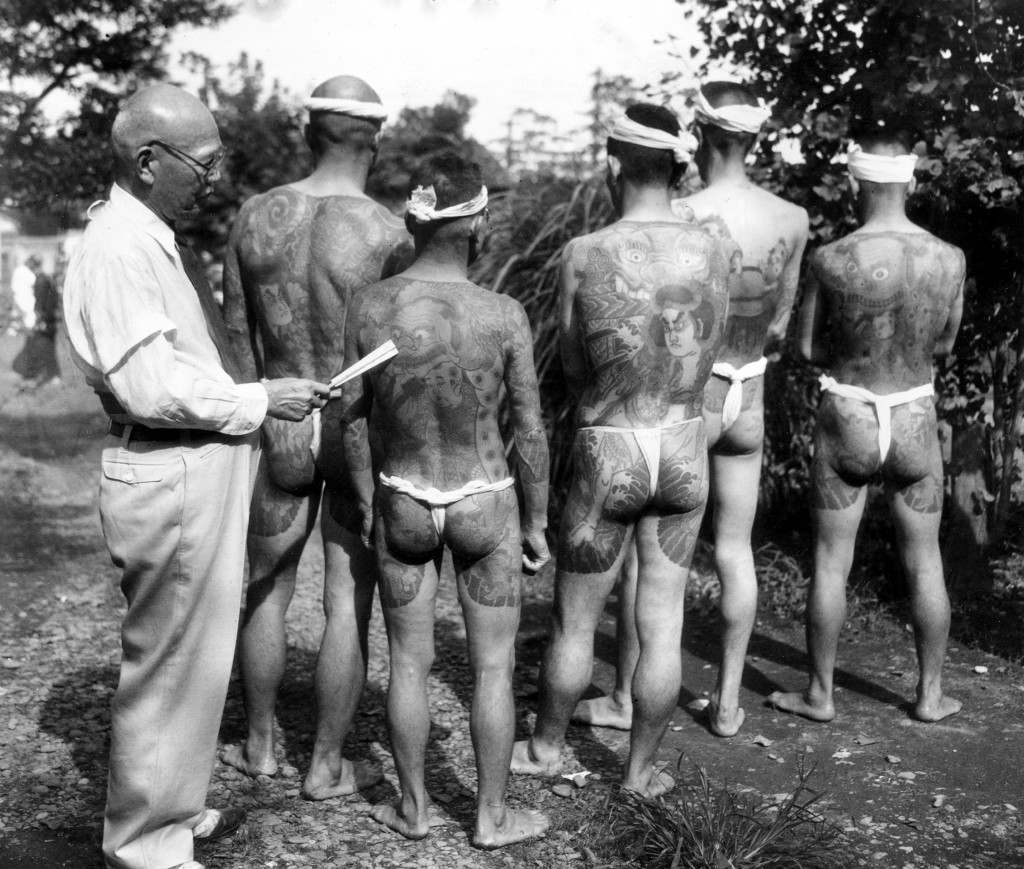
Japanese tattoo artist Ginjiro Susuki, 72, left, exhibits some of his tattoo designs at the Hard Skin Club convention of tattooed men and women held in Tokyo, Japan, Sept. 2, 1948. Suzuki estimates that he has tattooed more than 10,000 persons in his lifetime devotion to the 300-year-old art. (AP Photo)
Ref #: PA.4770680
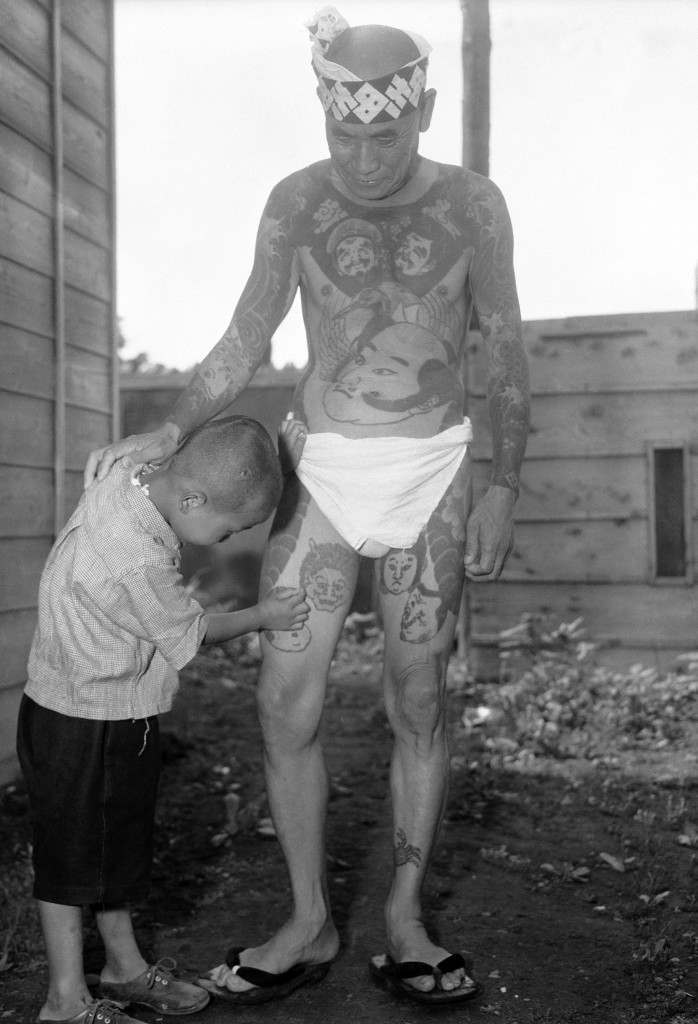
At the Hard Skin Club convention of tattooed men and women in Tokyo, a little boy examines a design on his fatherÂs leg in Tokyo, Sept, 2, 1948. Eighty club members  including three women met for their first convention in nine years in one of the cityÂs small parks. (AP Photo/Charles Gorry)
Ref #: PA.9431346
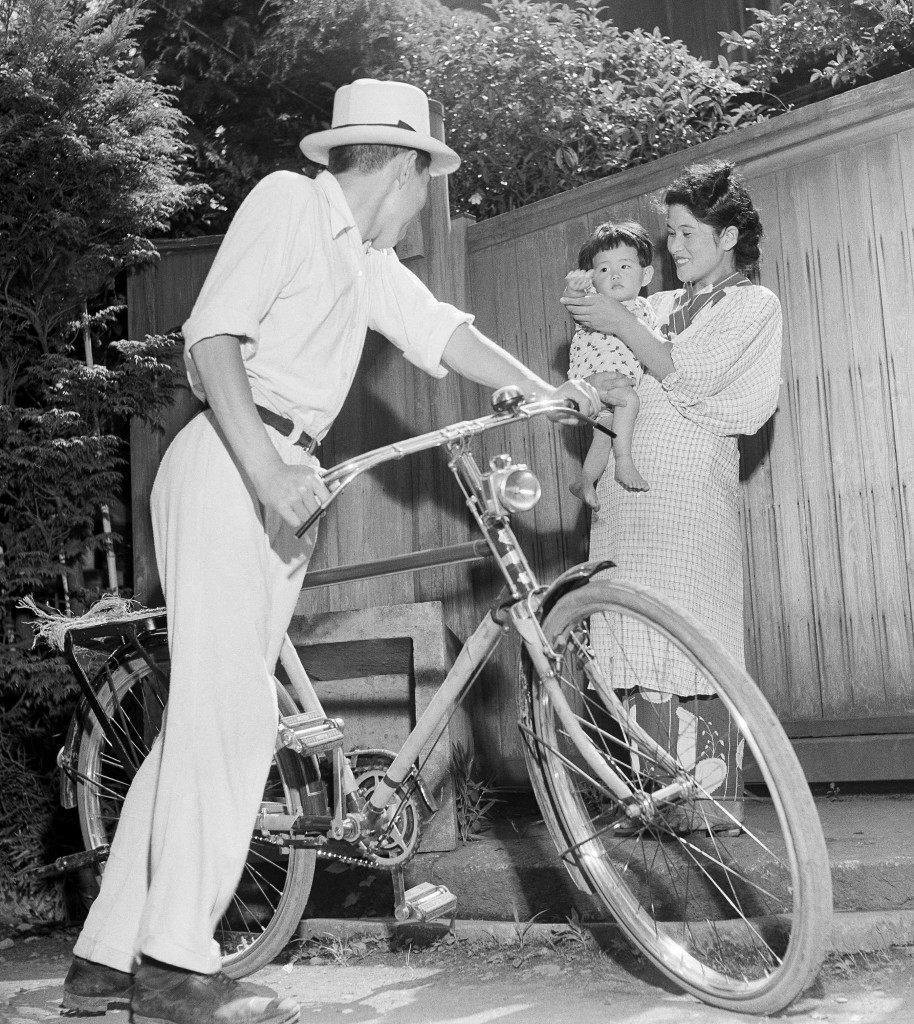
Baby Misuko, held by her mother Umeko, waves goodbye to papa-san as he goes to work on his bicycle, from their home in Tokyo, July 30, 1948. The old bicycle carries Tomosaburo Kawanabe six miles to his bookstore in downtown Tokyo. He makes a comfortable living even at inflated prices. (AP Photo)
Ref #: PA.12003583
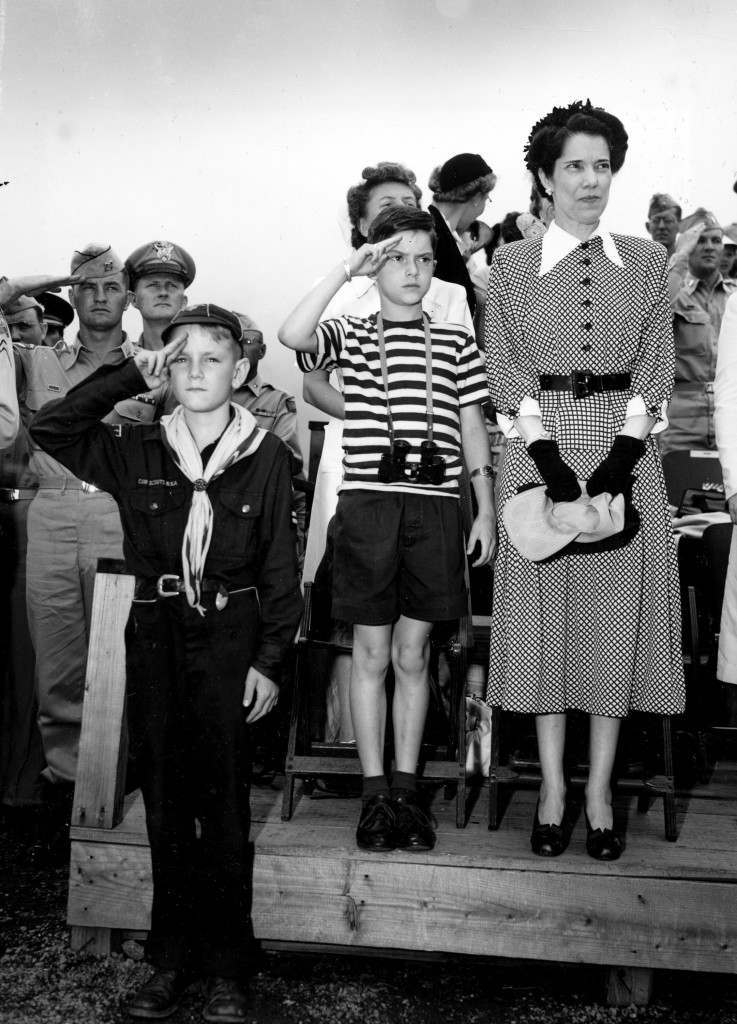
Arthur MacArthur, center, son of Allied Supreme Commander in Japan, General Douglas MacArthur, salutes a military parade past the Imperial Palace Plaza in Tokyo, Japan, during 4th of July celebrations, on July 7, 1948. Standing next to him is his mother, Mrs. Jean MacArthur. (AP Photo)
Ref #: PA.8673858
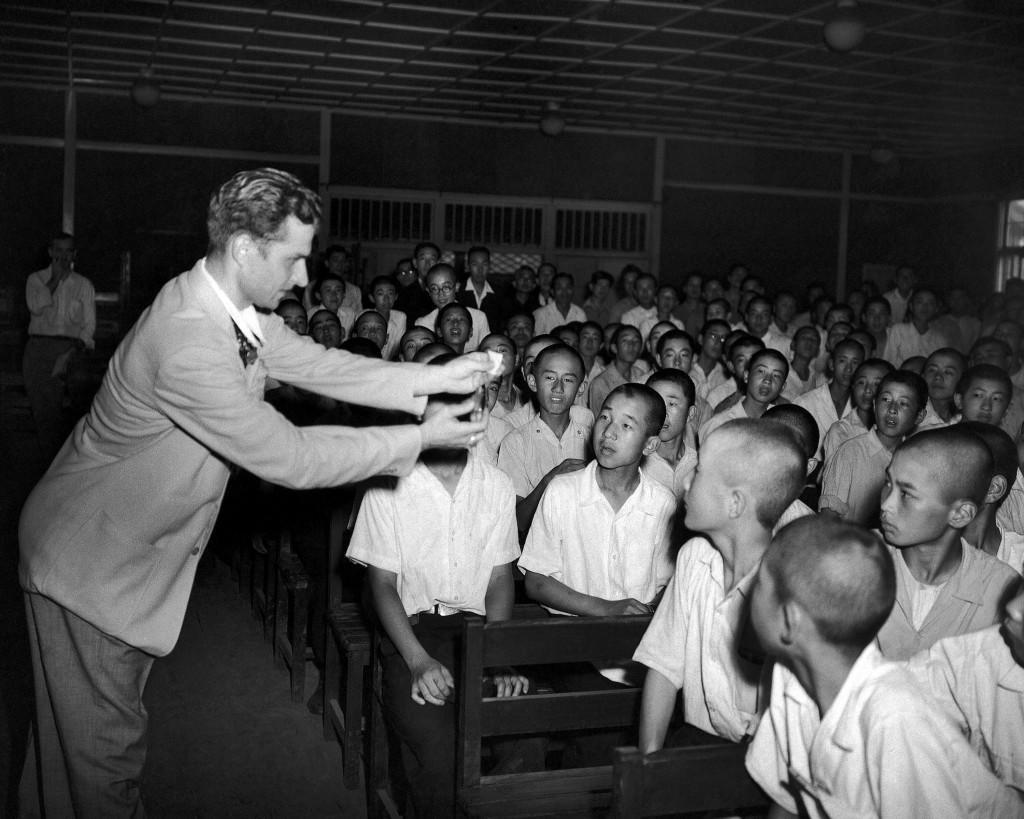
Students at the Peers School in Tokyo are mystified as Jacob Tropp of Brooklyn, N.Y., amateur magician, makes a 50 cent piece, wrapped in tissue paper, disappear in a burst of flame, July 25, 1948. Crown Prince Akihito (in third row, next to boy whose face is hidden by TroppÂs hands) watches in amazement; he had felt the coin in the paper. Tropp, a SCAP employee, was one of five magicians who did tricks for the boys. (AP Photo)
Ref #: PA.12003657
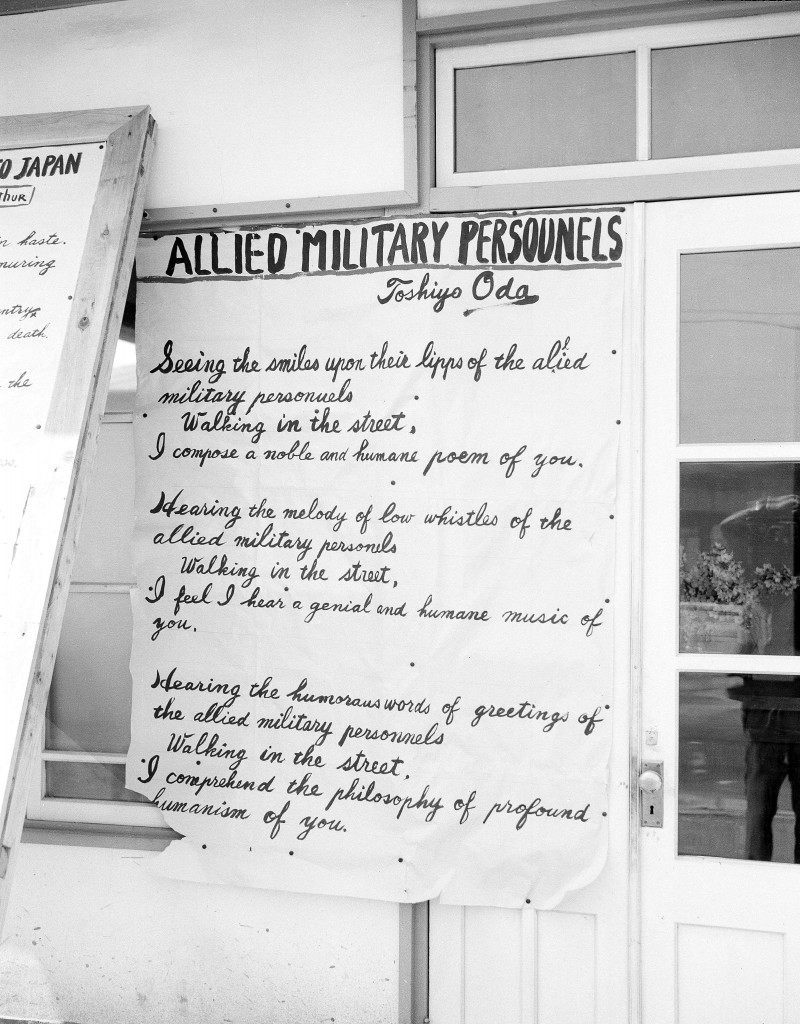
Shown are some of the signs displayed by Toshiyo Oda, a Tokyo contractor who has been running a one man campaign, “MacArthur For President” to attract attention to himself and his organization from the Allied personnel in Tokyo, April 12, 1948. (AP Photo)
Ref #: PA.18141497
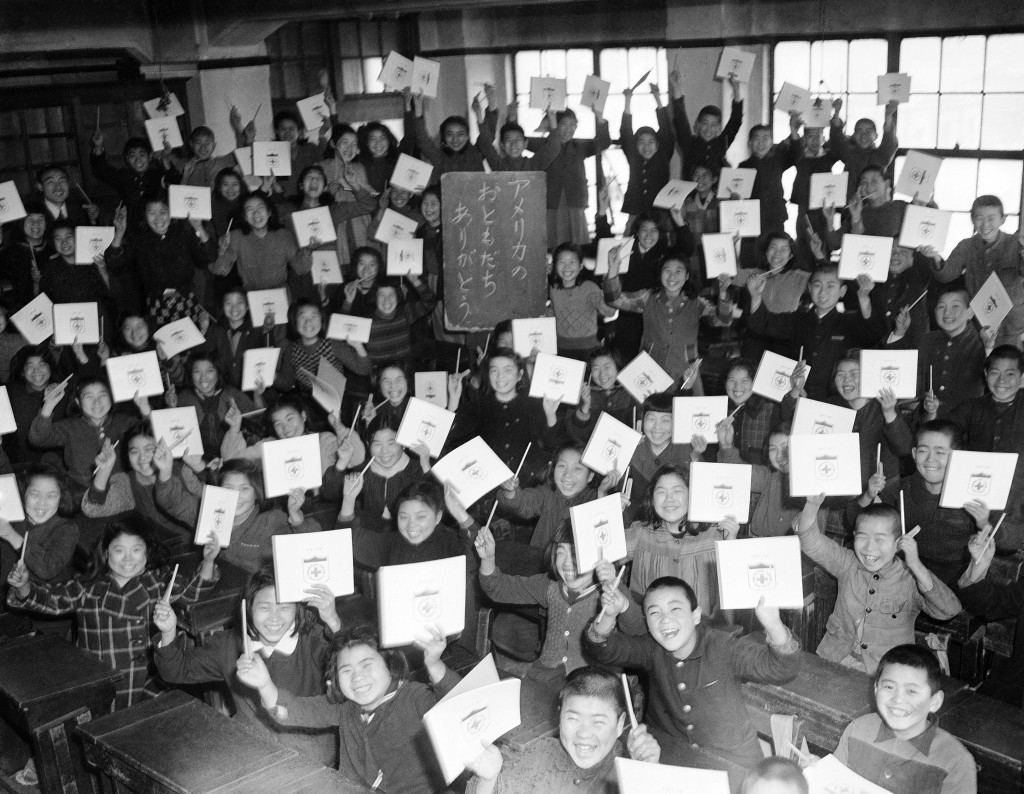
The Potato Race is underway as the contestants, employees of the Imperial household, race toward the finish line in Tokyo, Japan on April 20, 1947. Besides wearing bags to slow them, they are required to run backwards. This is an event of an annual field day on the palace grounds. (AP Photo)
Ref #: PA.11460502
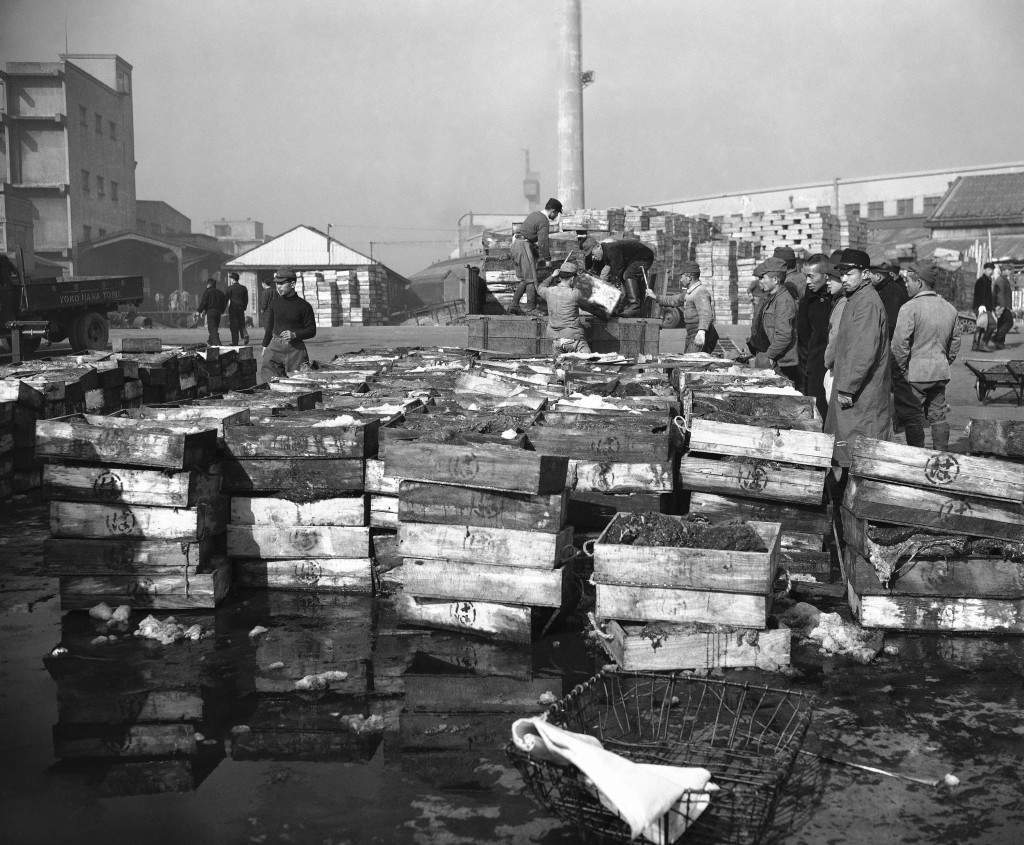
Whale meat is piled on the wharves as the Banshu-Maru is unloaded after its return from the Antarctic in Tokyo, Jan. 27, 1948 . (AP Photo)
Ref #: PA.11787854
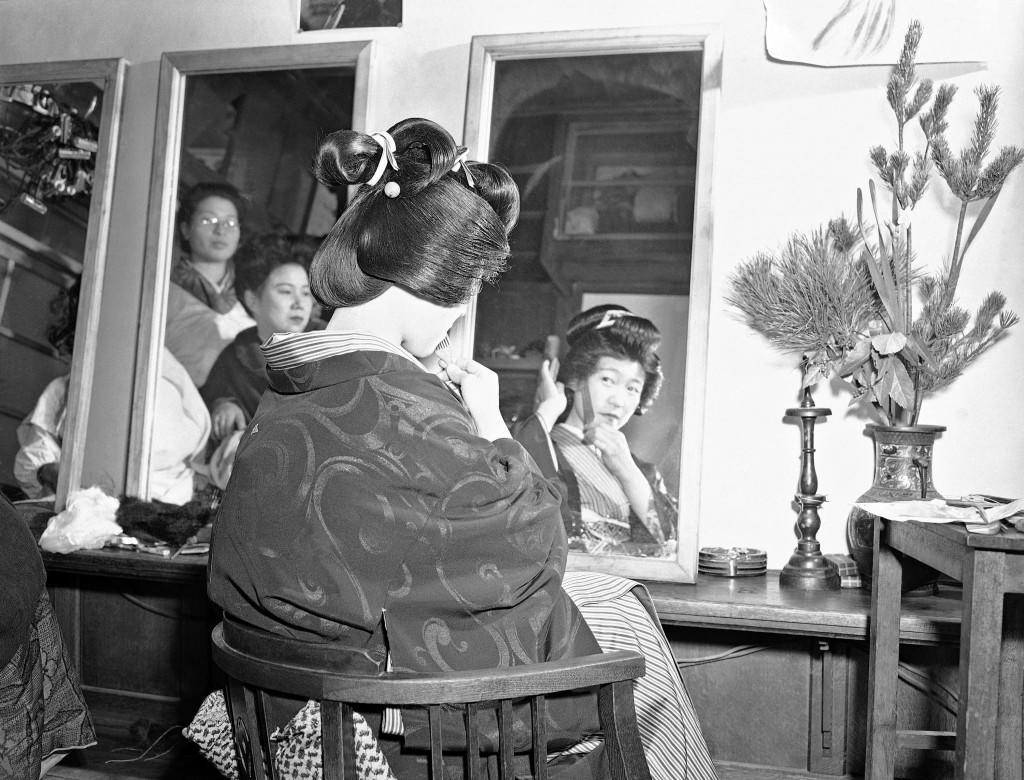
During the first weeks of the New Year, Japanese girls flock to the beauty parlors to have their hair made up in traditional Japanese style. The motive: the reconditioning is expected to serve as added attraction for male eyes throughout the year — possibly lure a husband from among JapanÂs eligibleÂs. One hopeful getting her hair done shows her coiffure almost finished at the shop on the Ginza in Tokyo, Japan on Jan. 16, 1948. (AP Photo)
Ref #: PA.11538662
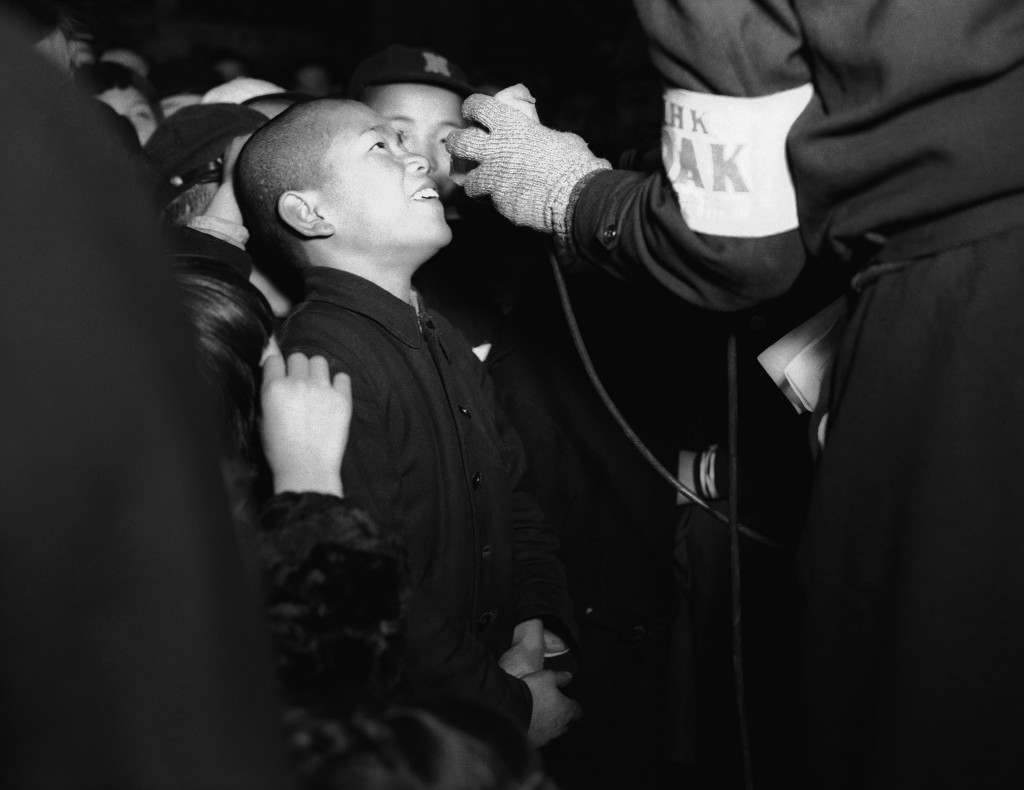
Adding a new twist to the “man on the street broadcast,” a regular feature of JOAK, announcers went out and cornered the youth of Tokyo to get their views and what they expect of Japan in the future, Jan. 10, 1948. All seemed to agree that a western-style house with central heating is their main ambition to have when they grow-up. The allied occupation personnel in Japan would like the same thing now. (AP Photo)
Ref #: PA.8335085
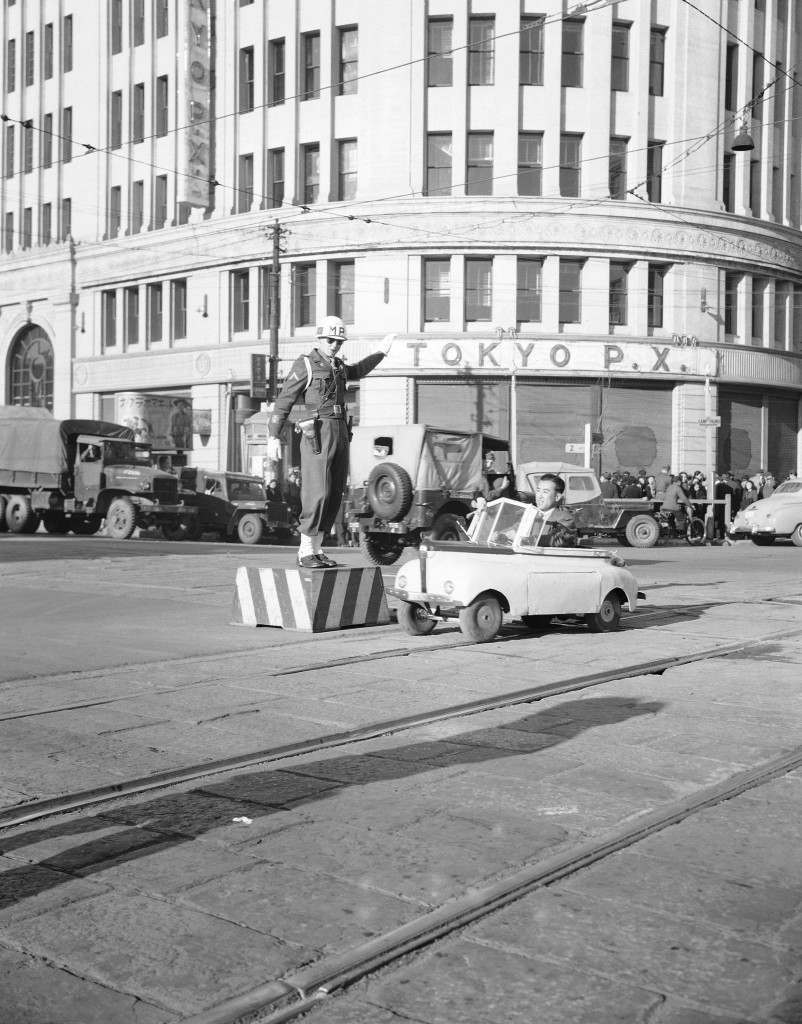
The brainchild of a former kamikaze pilot, this midget auto gets its power from a 30-volt battery. At speeds between 25 and 30 miles per hour, it can travel for six hours before needing recharging. It is priced at about $2,400. It is shown passing the main intersection of the Ginza Street in Tokyo, Dec. 21, 1947. The toy-like car gets a ÂGo signal from Private Jackson Neeley of Hampton, Va., who is attached to the 720th MPs. (AP Photo/Charles Gorry)
Ref #: PA.11617099
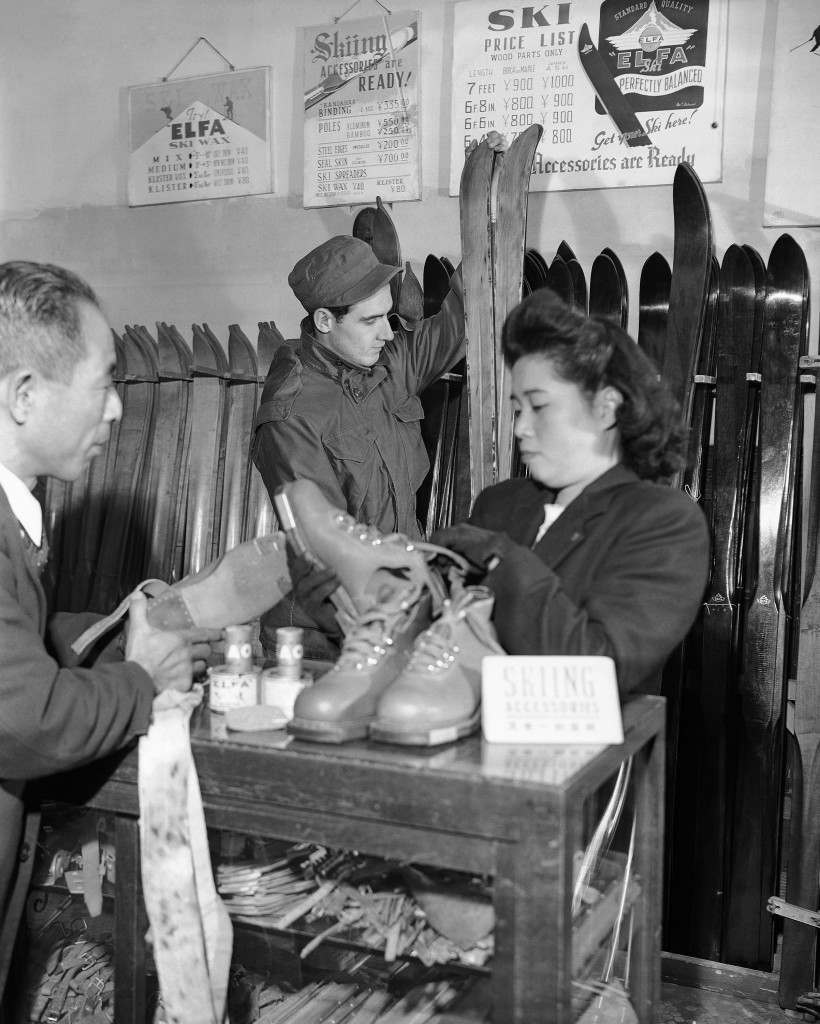
Using aluminum which had been earmarked for the production of Japanese war planes, Japanese ski manufacturers have been allocated the material to turn out sporting articles, skis and parts riding the slopes instead of the clouds. Looking over the first shipment in Tokyo on Dec. 3, 1947, to go on sale are T/5 Mickey Brownlee, Portland, Oregon, and Miss Kazuko Yamamoto, one of JapanÂs leading skiers. Her home is Sakalin in the Kueriles. (AP Photo/Charles Gorry)
Ref #: PA.11599061
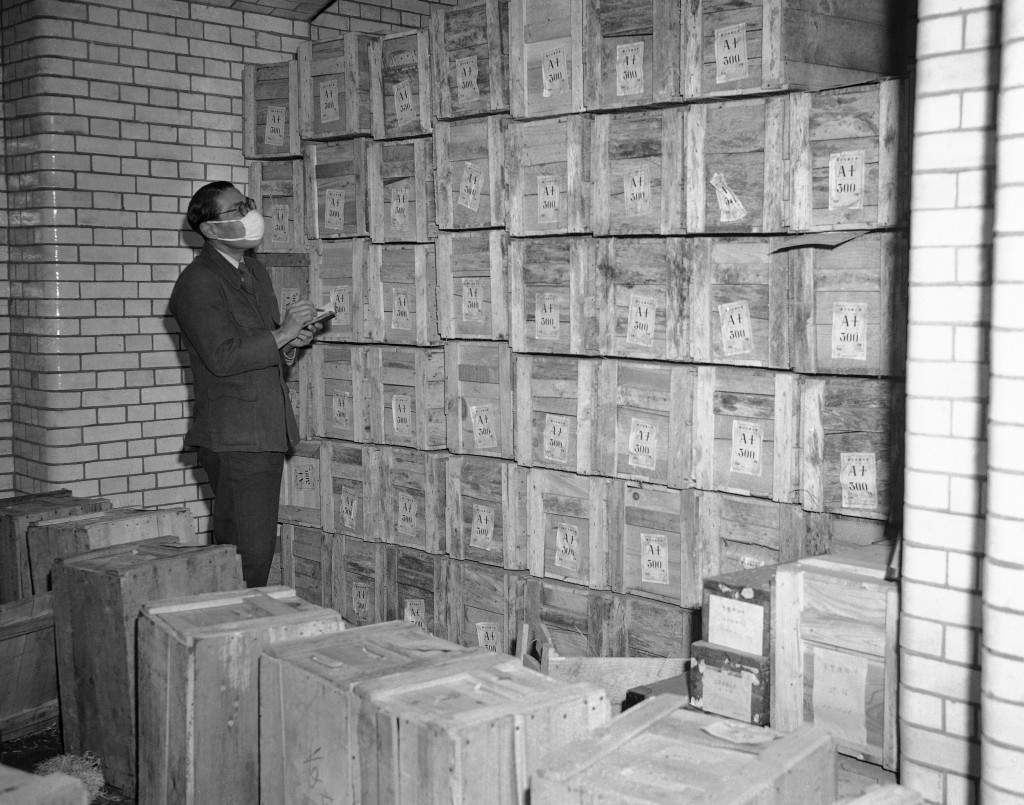
View inside the vaults in the Bank of Japan in Tokyo on Dec. 18, 1947, as new yen is stored in boxes until called into circulation by the government. With the increased circulation and the inflation of the yen, space for storing the money is at a premium. (AP Photo/Charles Gorry)
Ref #: PA.11497811
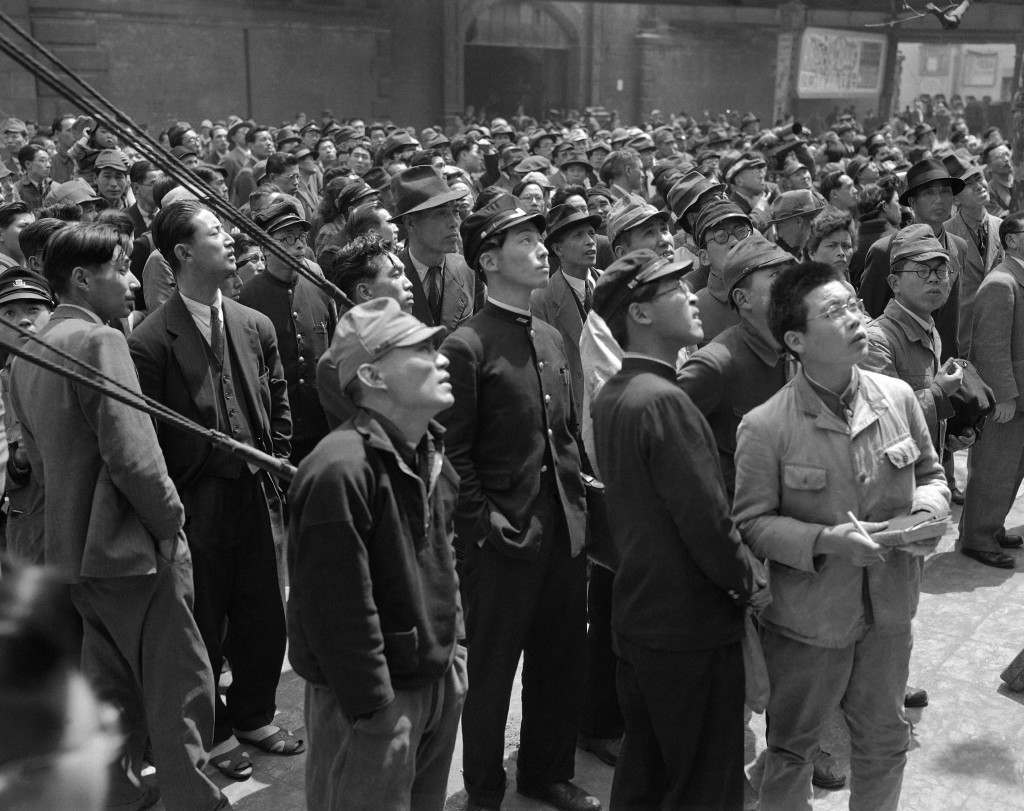
Tokyo citizens turn out to watch the bulletin boards announcing the election results for the candidates for the diet in front of the Asahi Newspaper office in Tokyo on May 7, 1947 which put up the results hourly until the final tabulation. (AP Photo)
Ref #: PA.10974406
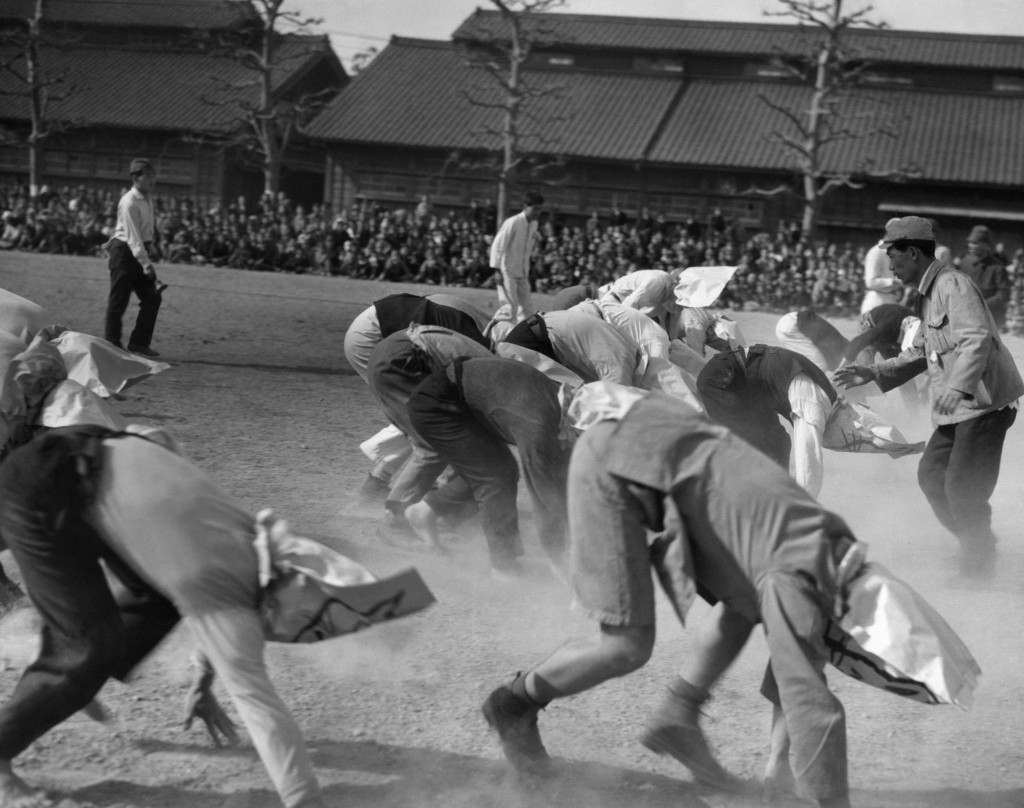
The Potato Race is underway as the contestants, employees of the Imperial household, race toward the finish line in Tokyo, Japan on April 20, 1947. Besides wearing bags to slow them, they are required to run backwards. This is an event of an annual field day on the palace grounds. (AP Photo)
Ref #: PA.11460502
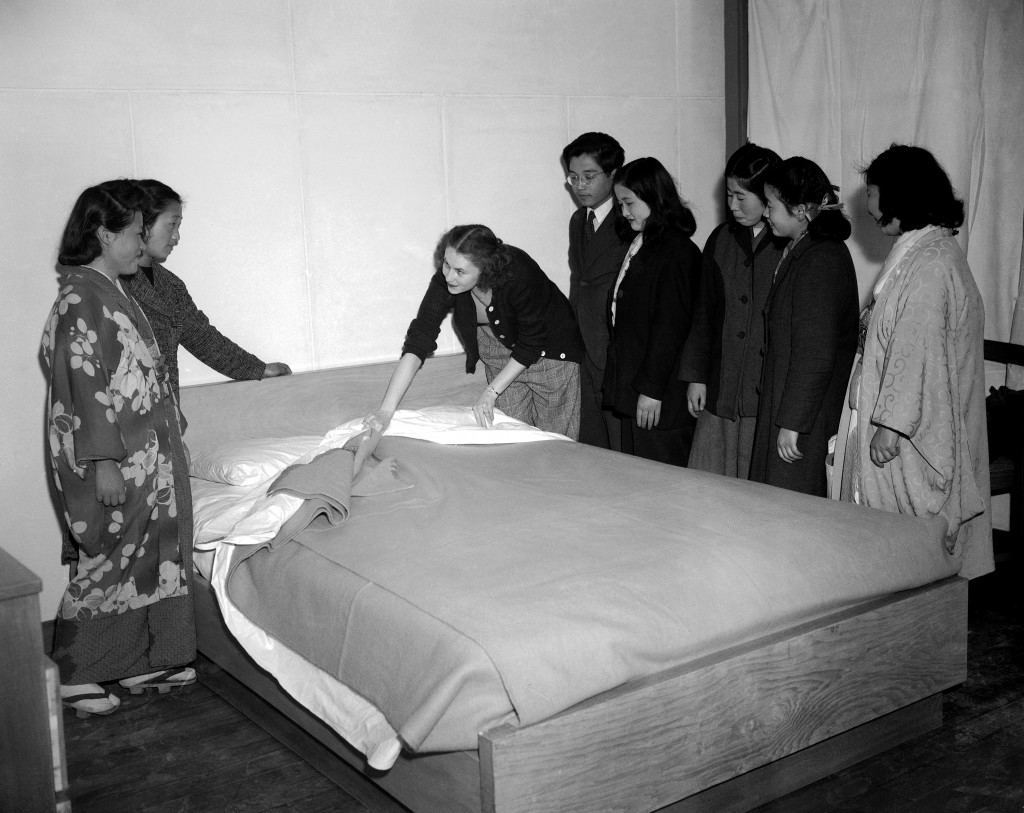
Although given preliminary instructions the girls are a bit vague about the proper making of a bed. Mrs. Anderson, with the help of an interpreter attached to the liaison section for the housing development, demonstrates the American way of bed making in Tokyo, Japan on April, 14, 1947. (AP Photo)
Ref #: PA.11607761
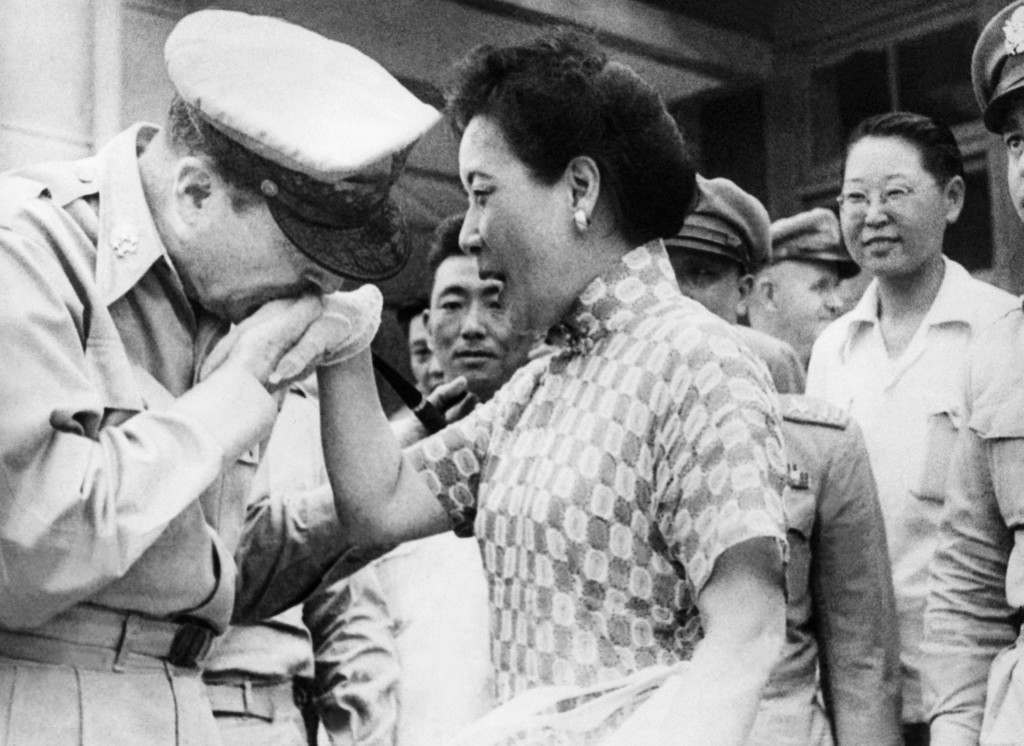
Gen. Douglas MacArthur kisses the white-gloved hand of Madame Chiang Kai-shek on August 7, 1950 just before he departed from Taipei, Formosa for Tokyo after a conference with Generalissimo Chiang Kai-shek and Nationalist government leaders. (AP Photo)
Ref #: PA.8350369
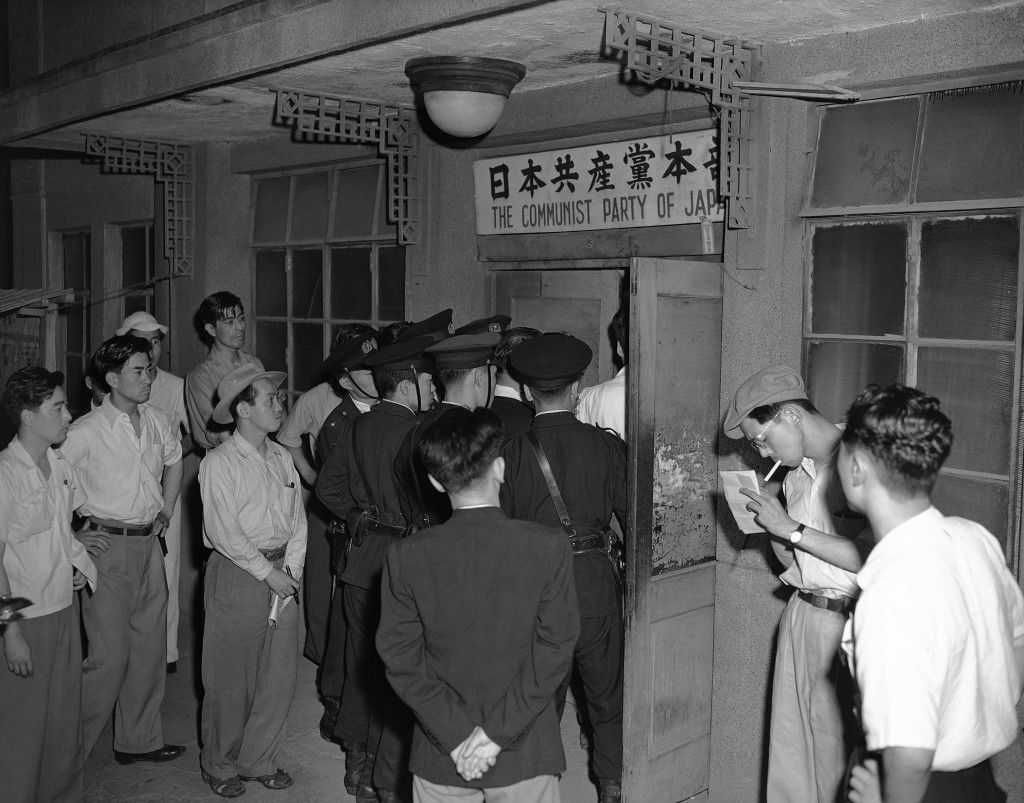
On orders of General MacArthur, Japanese police closed Communist Party daily paper in Tokyo on June 26, 1950, for 30 days because, MacArthur said, of Âits perversion of the truth in discussing the Korean situation. (AP Photo)
Ref #: PA.11678485
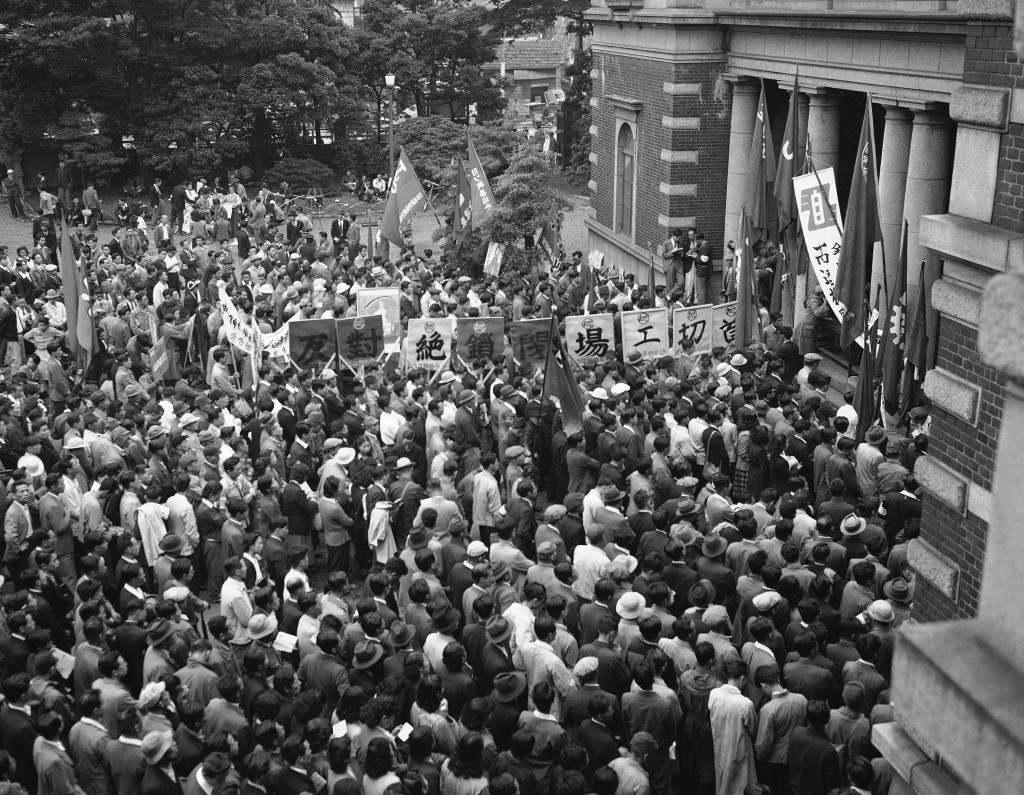
Inside the compound of the headquarters of the Japanese Red Cross in Tokyo (Shiba Park district) on June 3, 1950 as the Communists inspired workers met to demonstrate against the arrest of eight men charged with attacking a group of American soldiers in Tokyo on Memorial Day. The crowd was orderly and no reports of violence or disturbance was reported. (AP Photo/Charles Gorry)
Ref #: PA.11324421
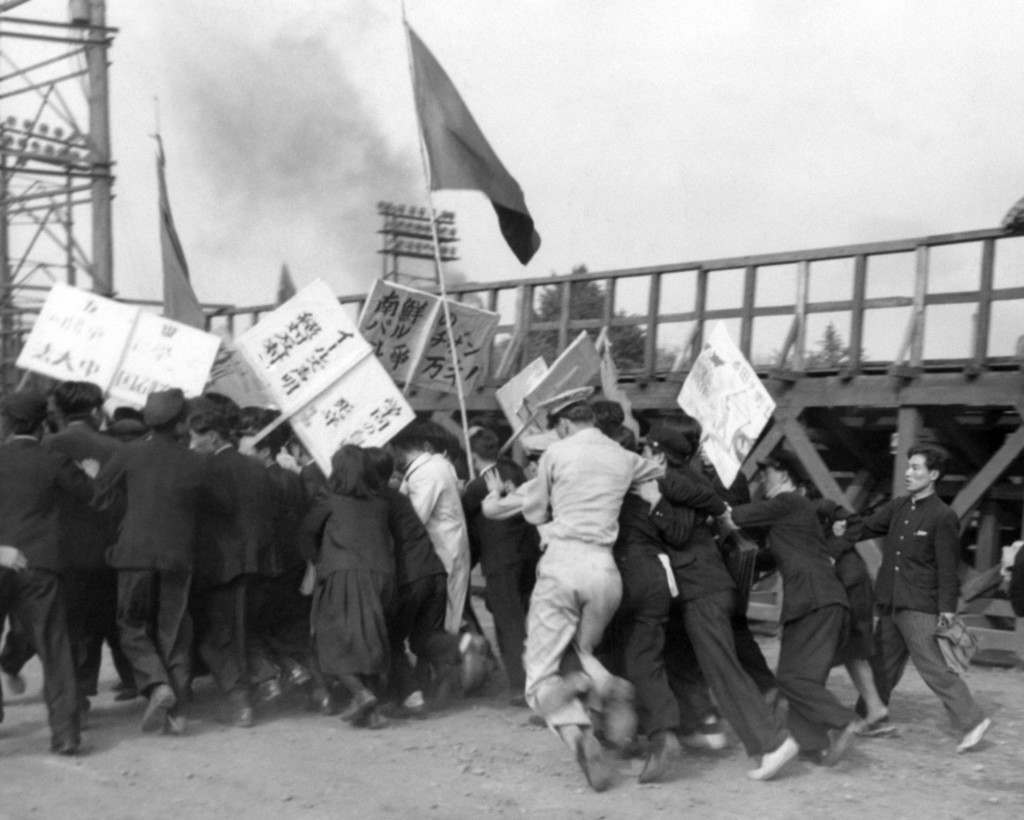
Students of the Red organized at the rally on the Imperial Palace Plaza in Tokyo on May 30, 1950, trying to rush some of the men sought by white helmet military policemen. In the foreground is one of the American soldiers grappling with the students. (AP Photo)
Ref #: PA.11324393
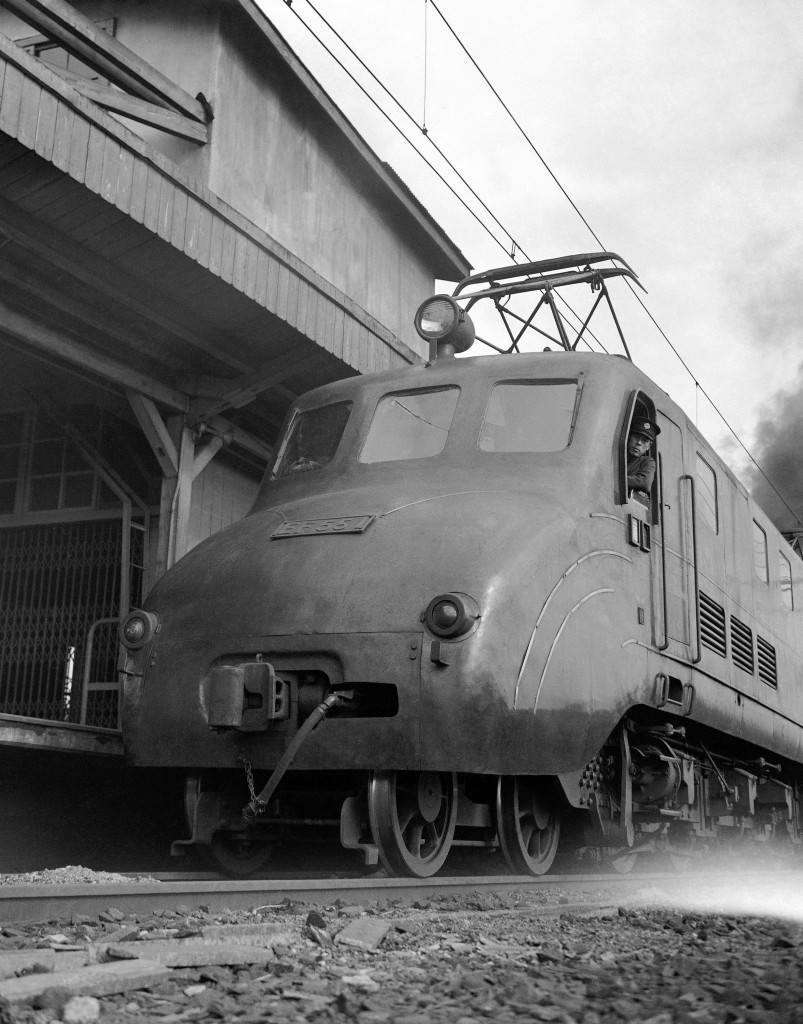
Close up of the express engine Tsubame in Tokyo station on April 19, 1950. (AP Photo/Charles Gorry)
Ref #: PA.11655872
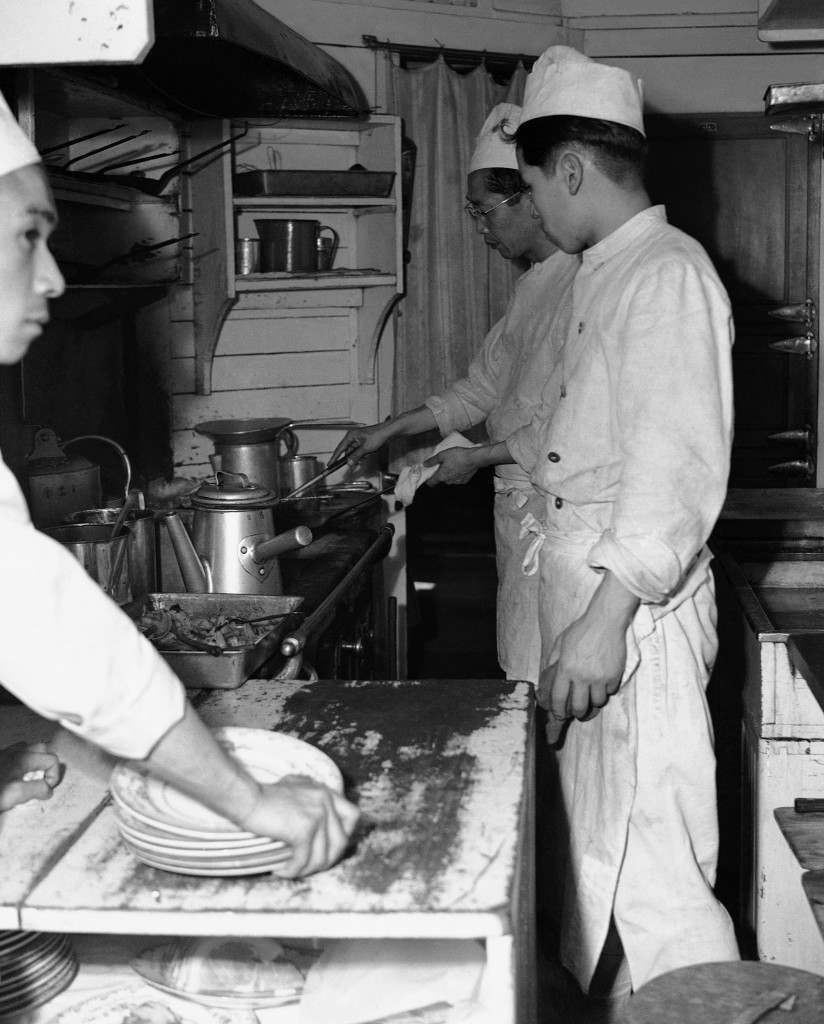
View of the kitchen on the Japan Railways Corporation express train with service to Kyoto, Osaka, and Kobe from Tokyo on April 19, 1950. Western style meals are served including ÂTÂ bone steaks and French fries with cocktails at a price. (AP Photo/Charles Gorry)
Ref #: PA.11655875
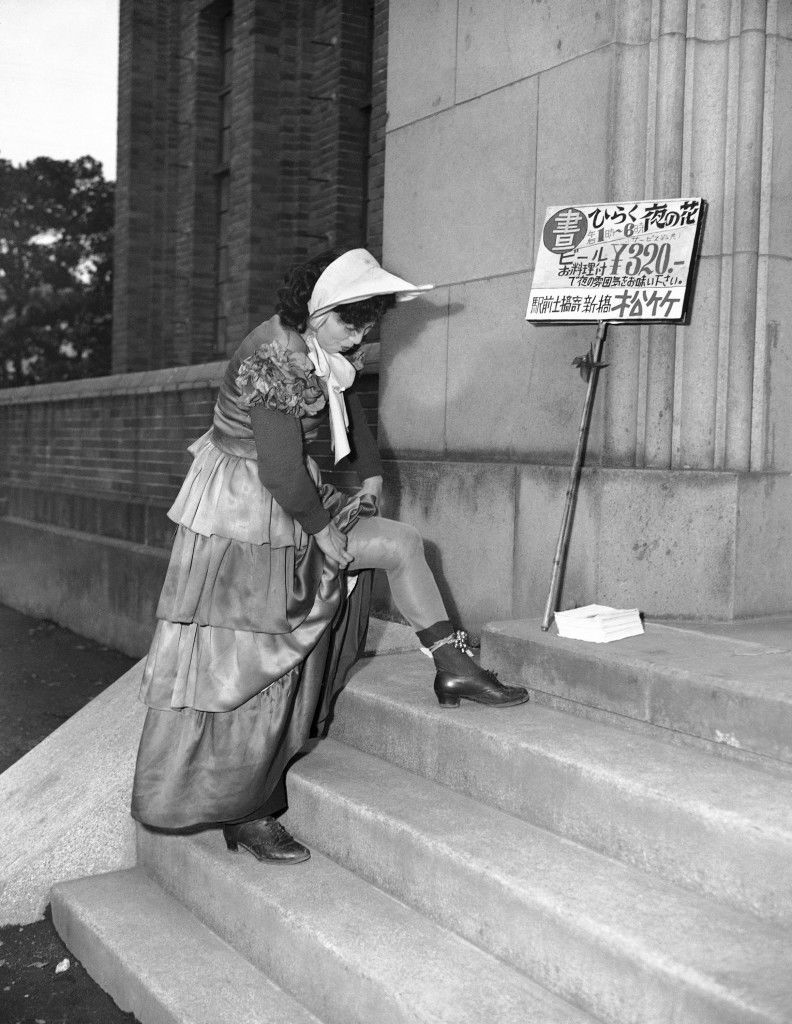
A sandwich girl who carries a sign proclaiming a new type of club where folks who work nights can come and enjoy themselves during the day, stops to adjust the bells on her ankles in Tokyo, March 19, 1950. The café hours are from 1 to 6 p.m. and Japanese beer sells for 320 yen. (AP Photo/Charles Gorry)
Ref #: PA.11617163
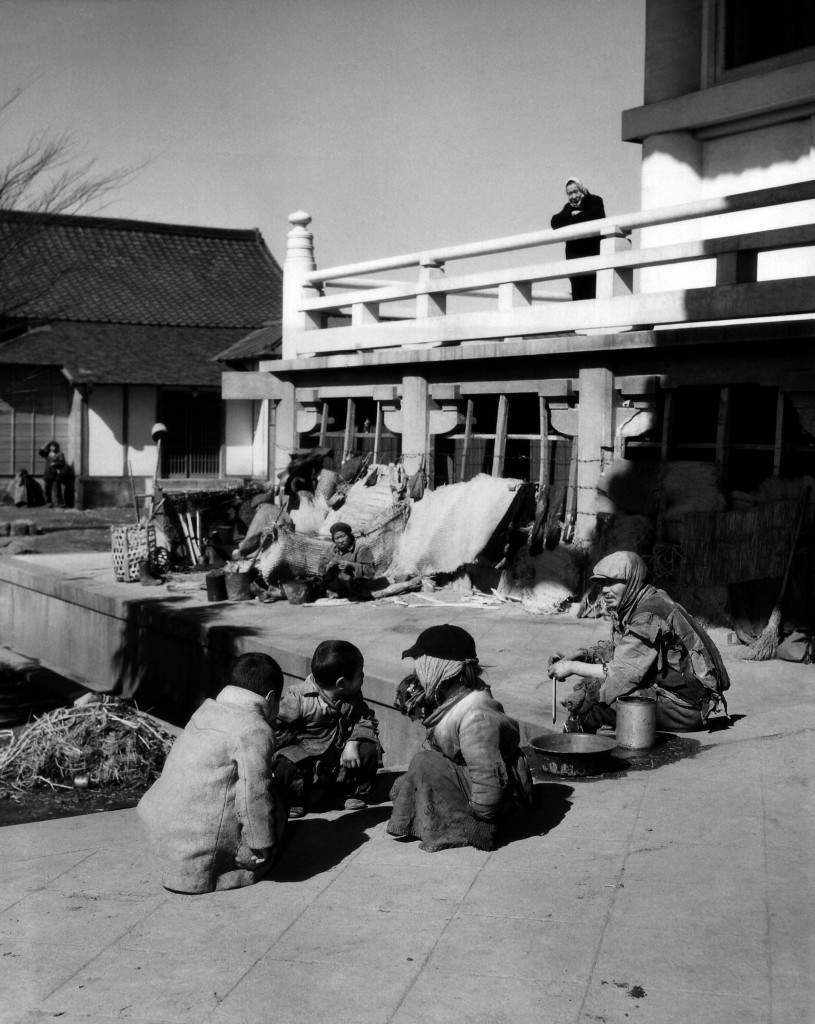
Near the railroad station a group of unfortunate Japanese squatters all bundled up in rags sit in front of their make-shift homes – some straw matting placed against the wall to break the cold wind in Tokyo on March 19, 1950. (AP Photo/Charles Gorry)
Ref #: PA.11729070
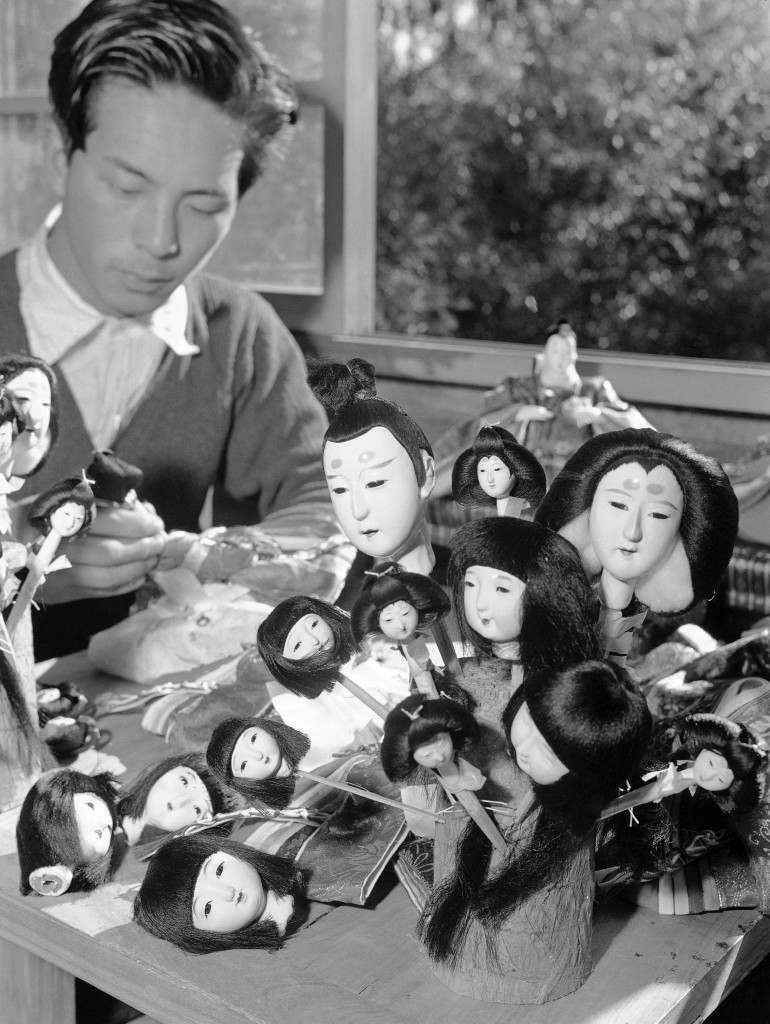
The heads all painted and the hair glued on, this Tokyo doll maker gets dolls ready for dressing in Tokyo on Jan. 26, 1950. JapanÂs doll makers are busy as girls day draws near. It is celebrated on April 3. (AP Photo/Charles Gorry)
Ref #: PA.11466954
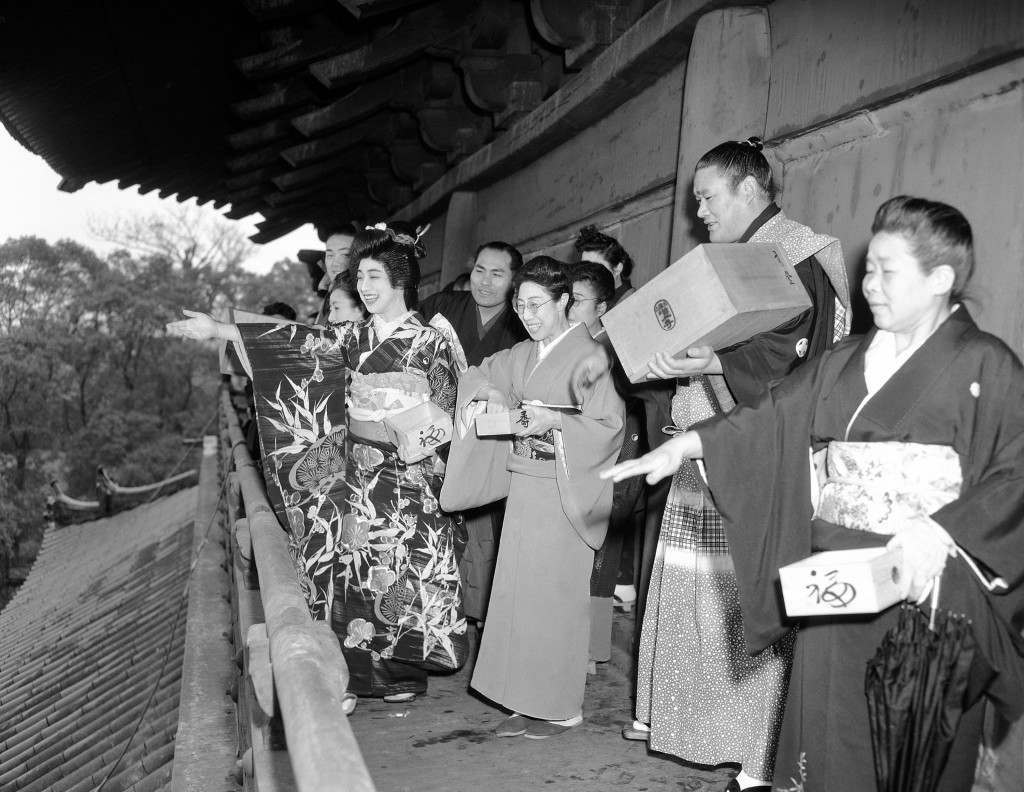
The change of season, or ÂSetsubun, is celebrated in traditional fashion at the Asakusa Temple in Tokyo on Feb. 9, 1950 as a geisha girl, a sumo wrestler and other prominent personalities throw out roasted beans to the crowd that has gathered. As the beans are scattered, the person who tosses chants or sings: ÂDevil outside, good luck inside. Custom is part of the temple festivities and Merry-making which greet the change of season, which comes on February 3 in Japan. To be chosen as one of the bean-throwers at the annual temple rites is considered a great honor, for which geishas, wrestlers, movie actresses and other public figures vie. (AP Photo/Charles Gorry)
Ref #: PA.10887844
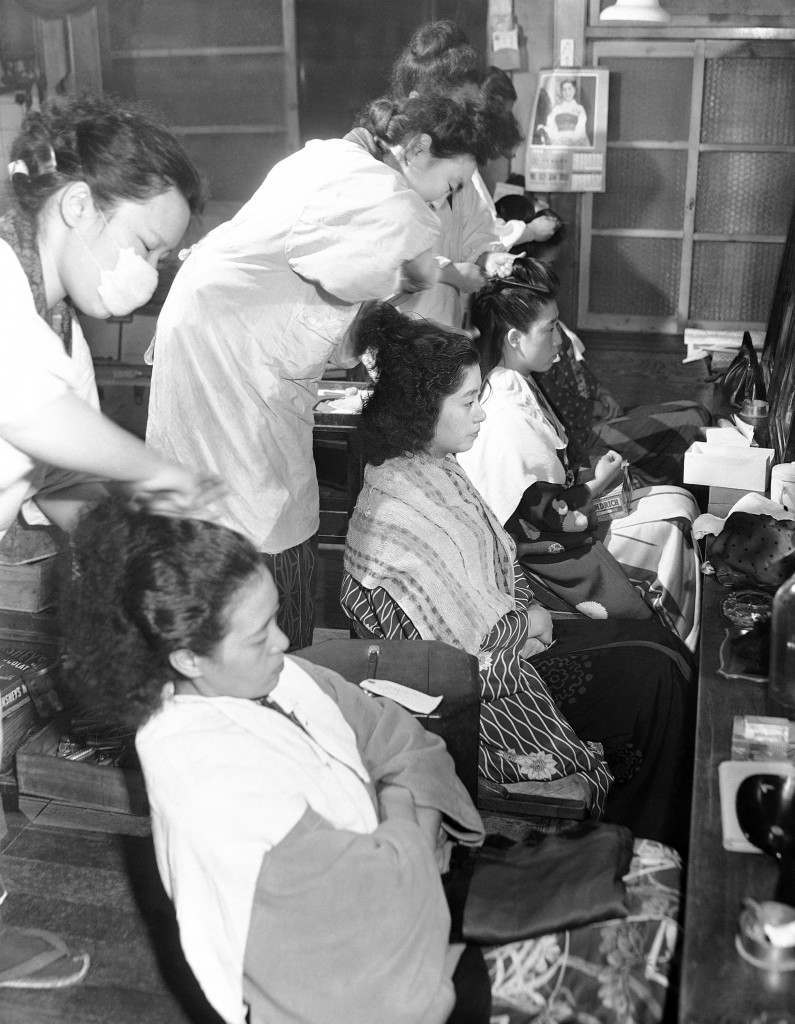
Beauty parlor in the Shmbashi district (TokyoÂs number one geisha district) as the girls get ready for the New Year parties and celebrations they will attend in the evening on Jan. 4, 1950. (AP Photo/Charles Gorry)
Ref #: PA.11484373
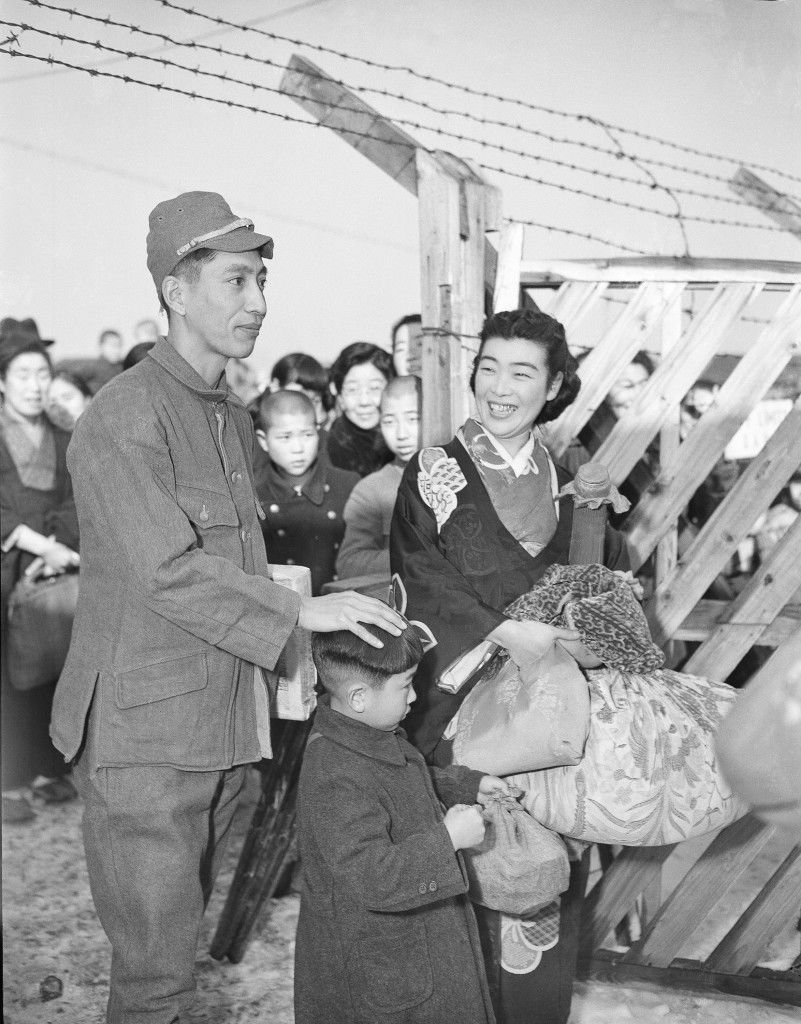
This is one of the 46 men who were released by the army in Tokyo, as part of SCAPÂs plan to free men who have served over 3 years and have good behavior records, this former Japanese POW guard as he walked out of the gates of Sugamo prison with his wife and young son in Tokyo, Dec. 30, 1949. (AP Photo)
Ref #: PA.9536723
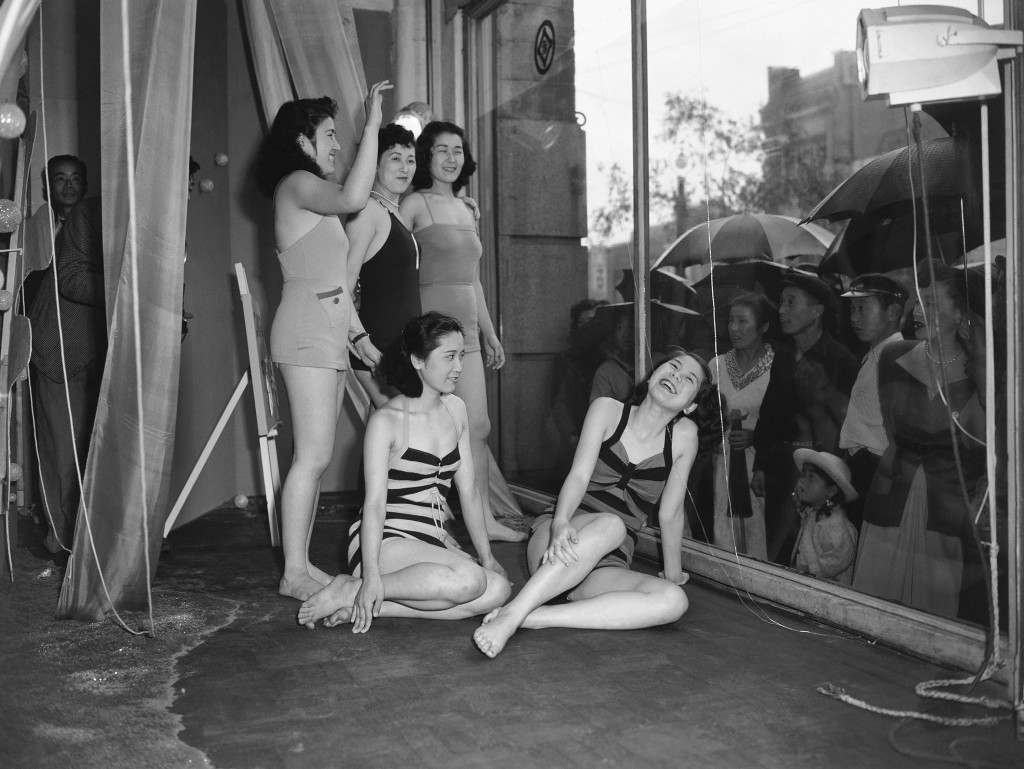
To draw the publicÂs attention to a new line of bathing suits, a Tokyo department store uses live models to show off the suits, June 5, 1950. The rain didnÂt bother the curious and both the girls and the crowd seemed to like the idea of staring at each other through the glass. (AP Photo)
Ref #: PA.11617196
Would you like to support Flashbak?
Please consider making a donation to our site. We don't want to rely on ads to bring you the best of visual culture. You can also support us by signing up to our Mailing List. And you can also follow us on Facebook, Instagram and Twitter. For great art and culture delivered to your door, visit our shop.
